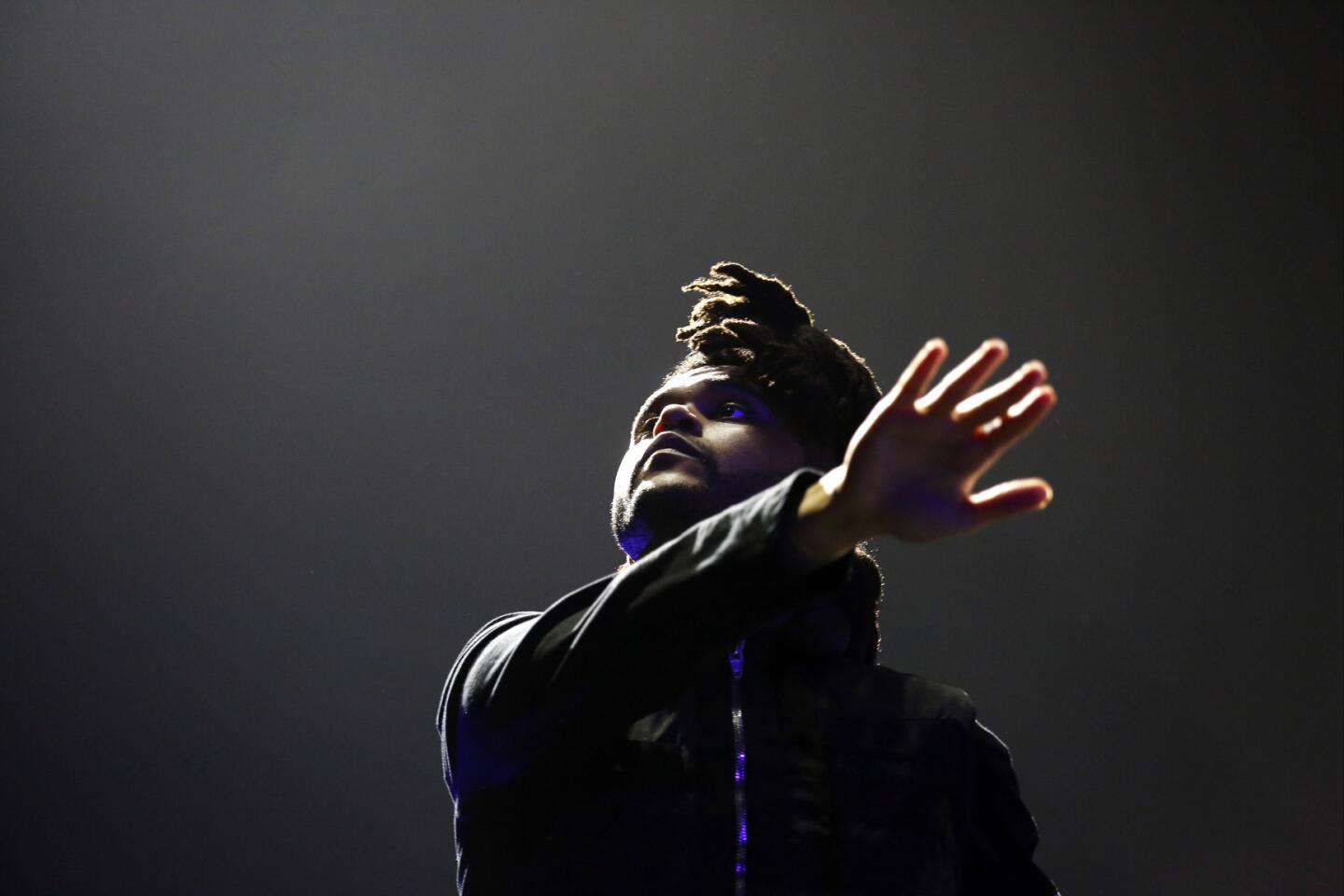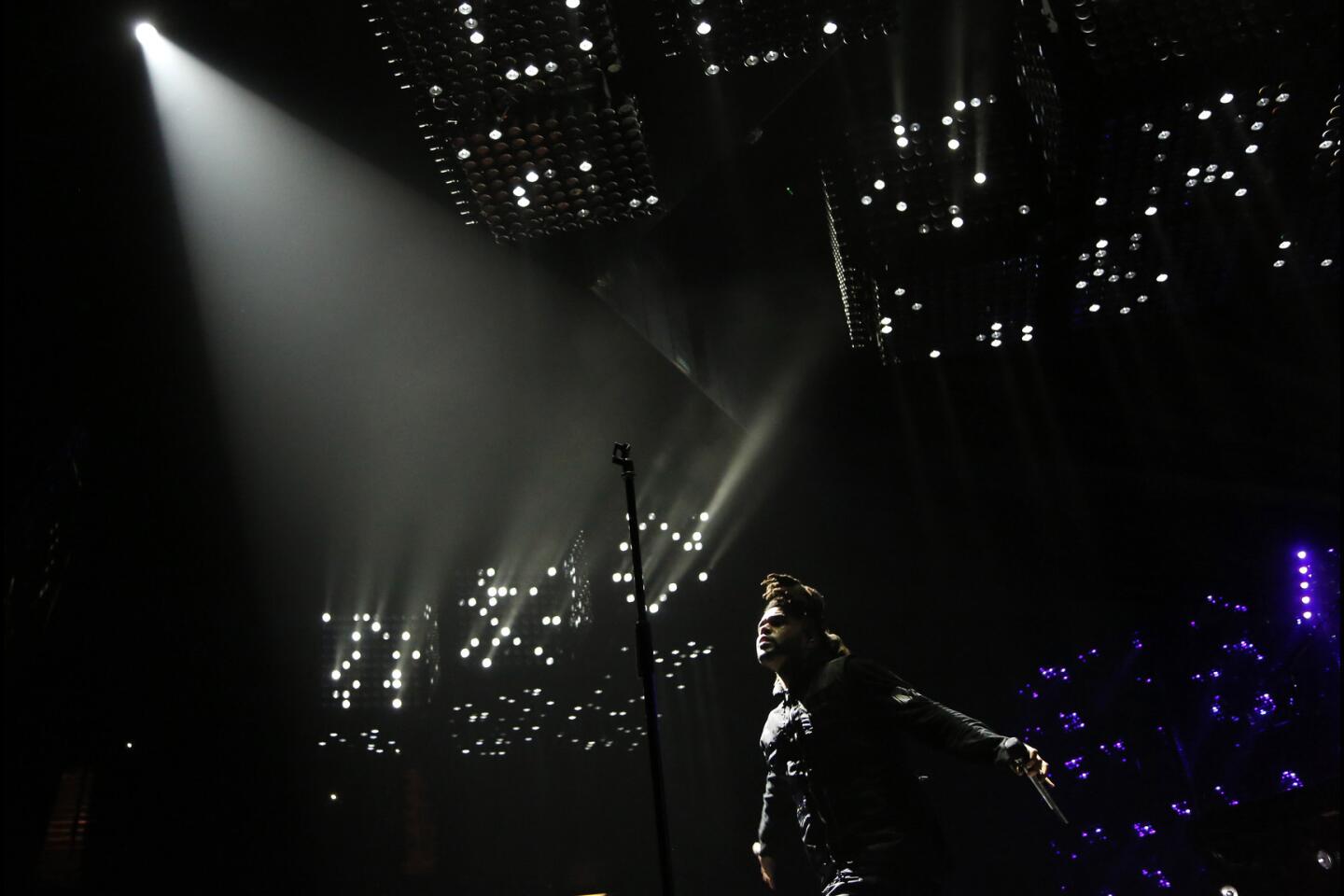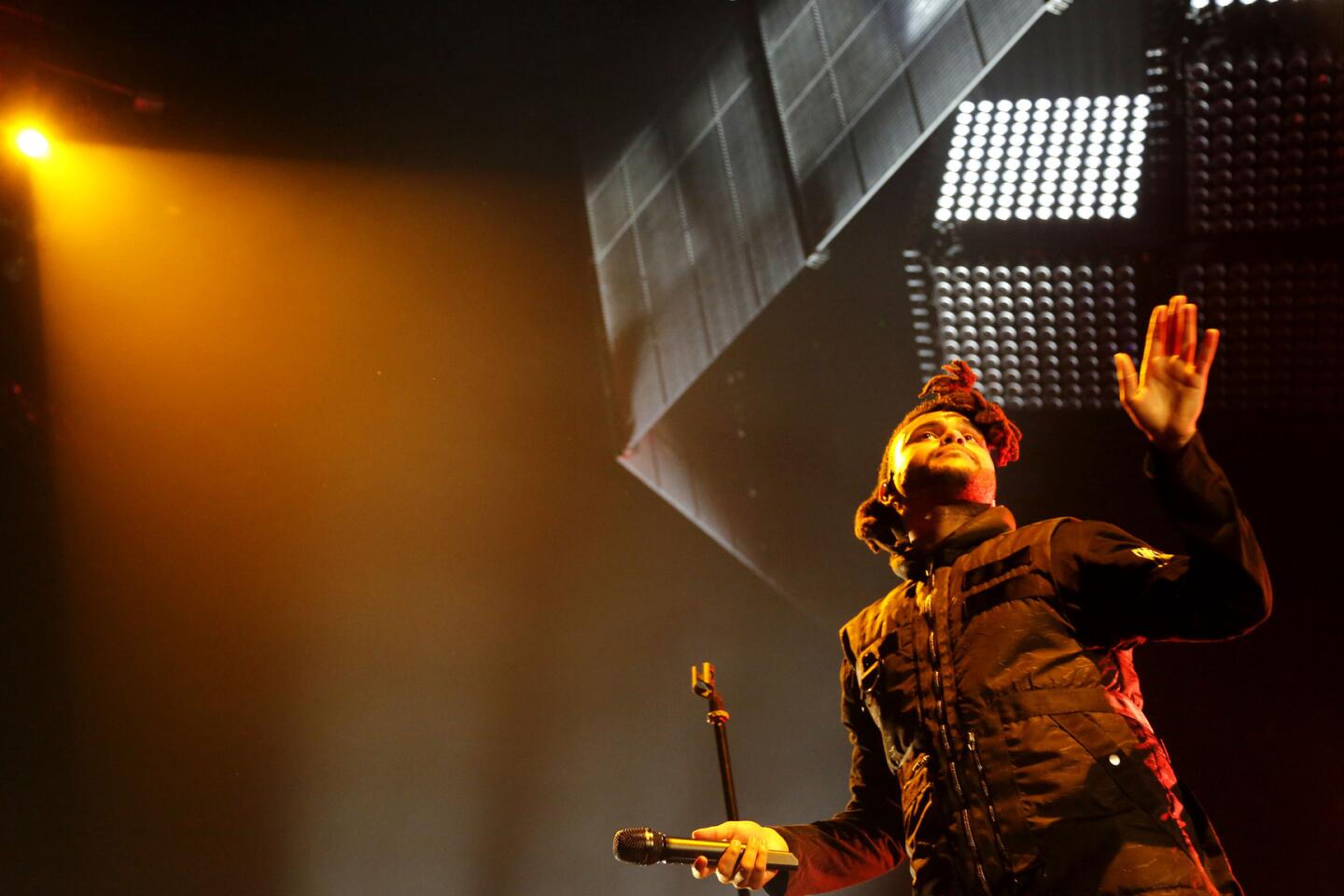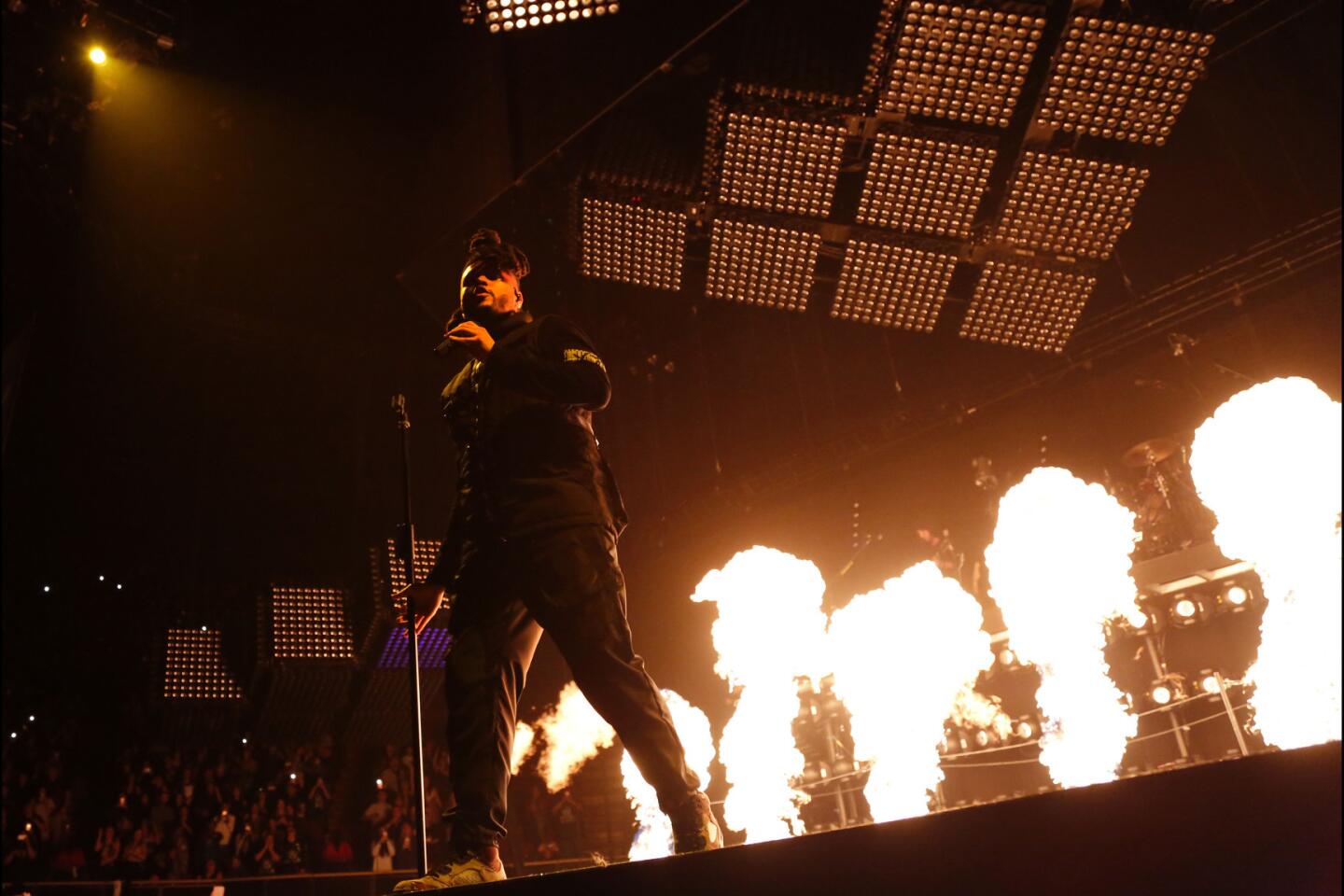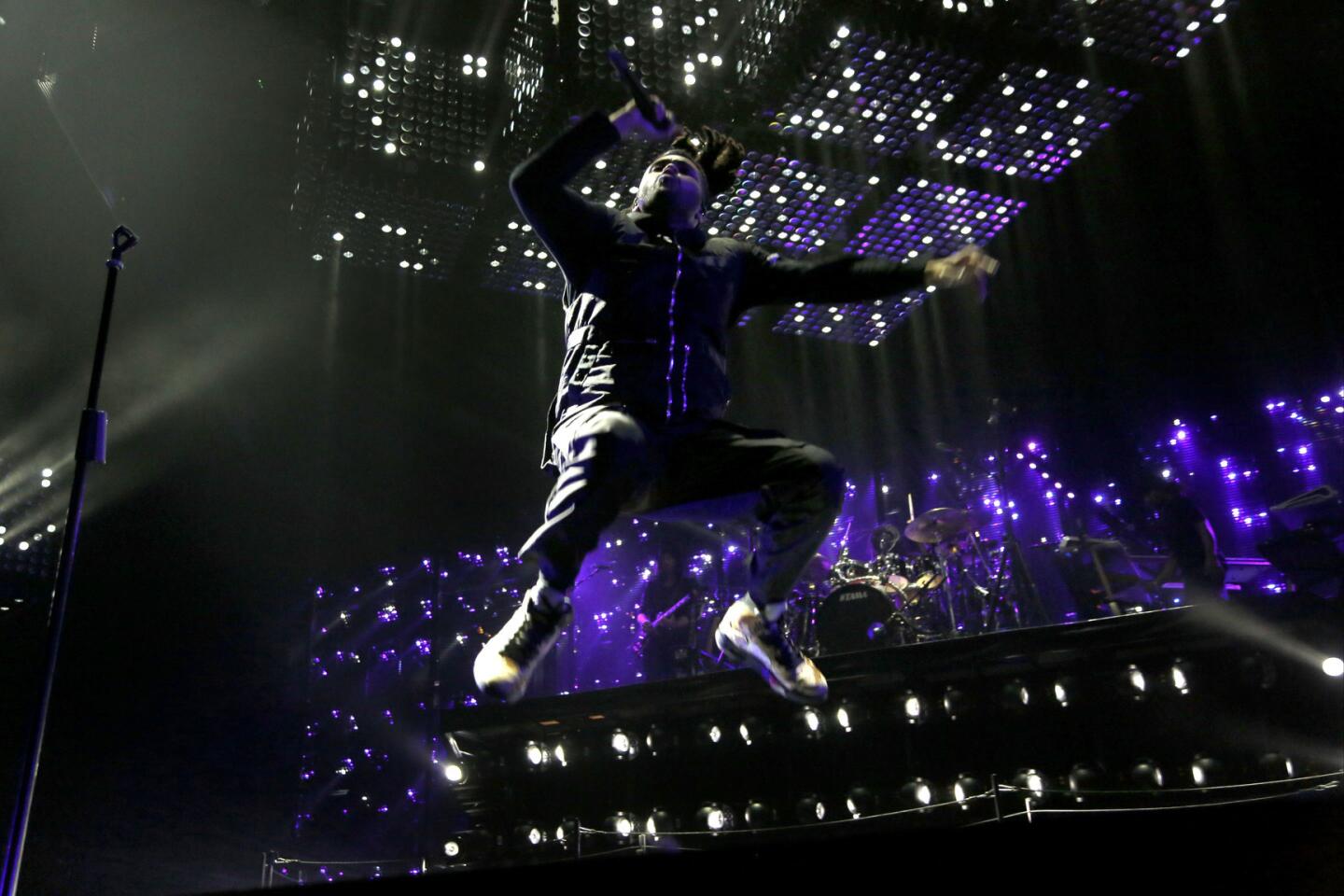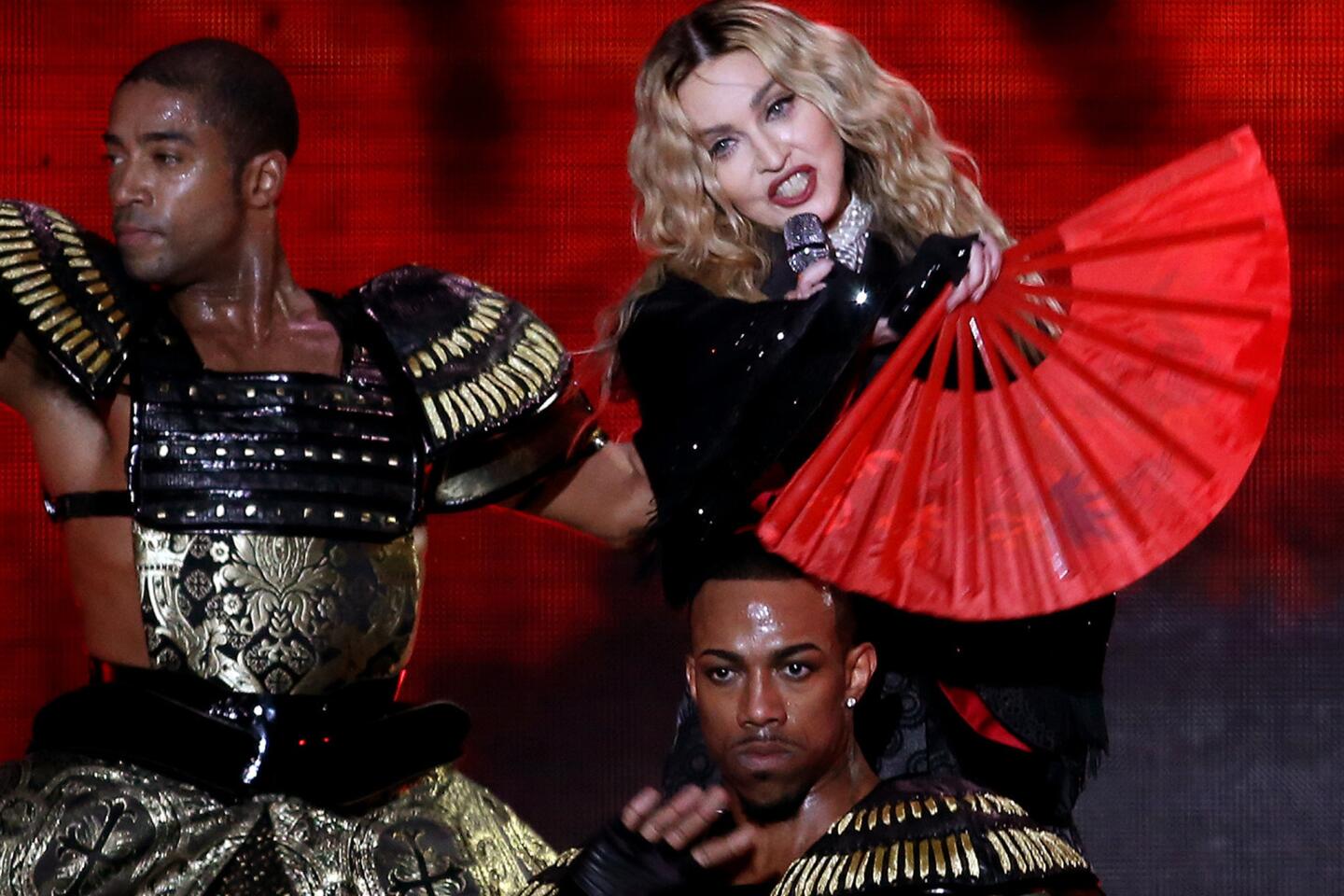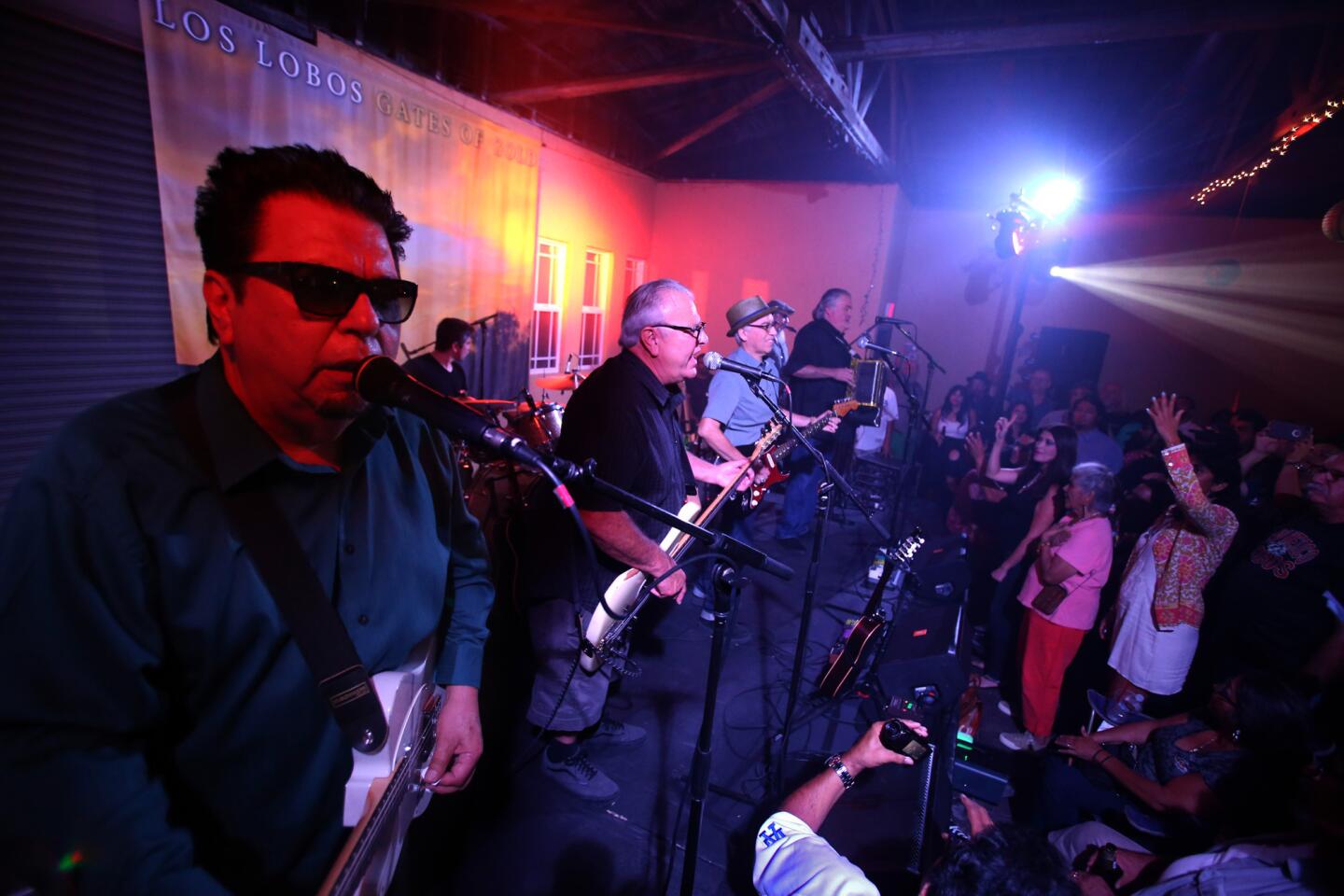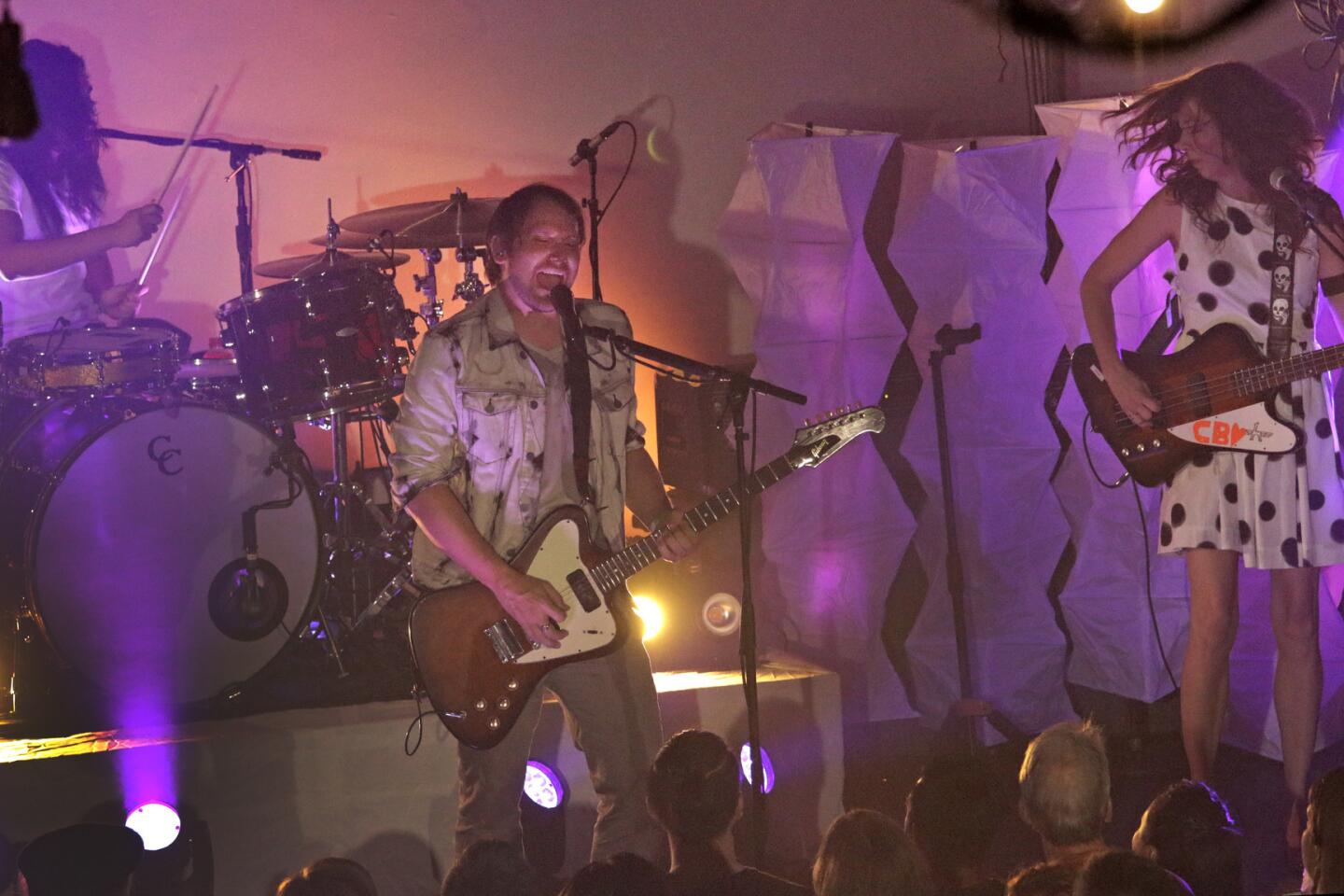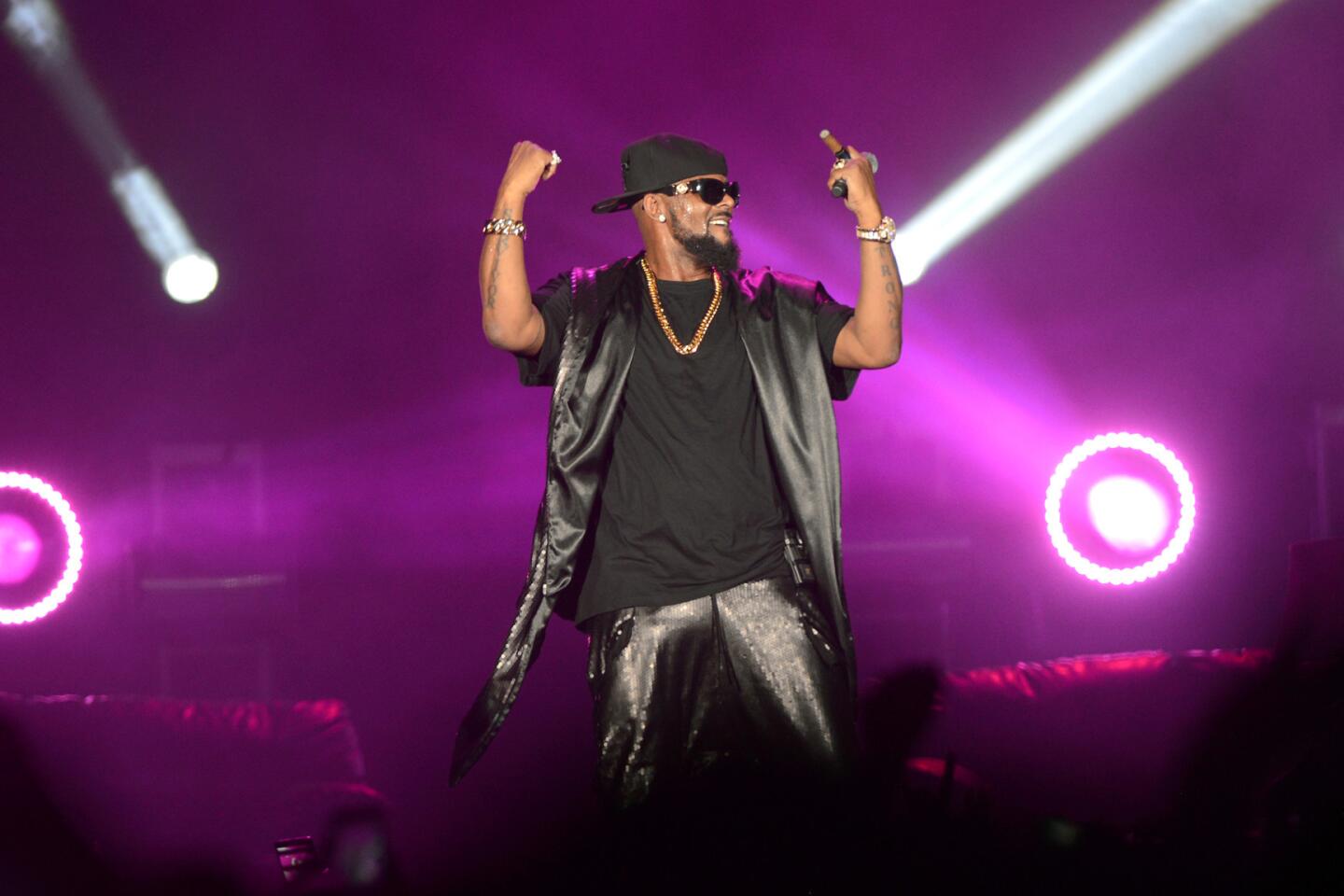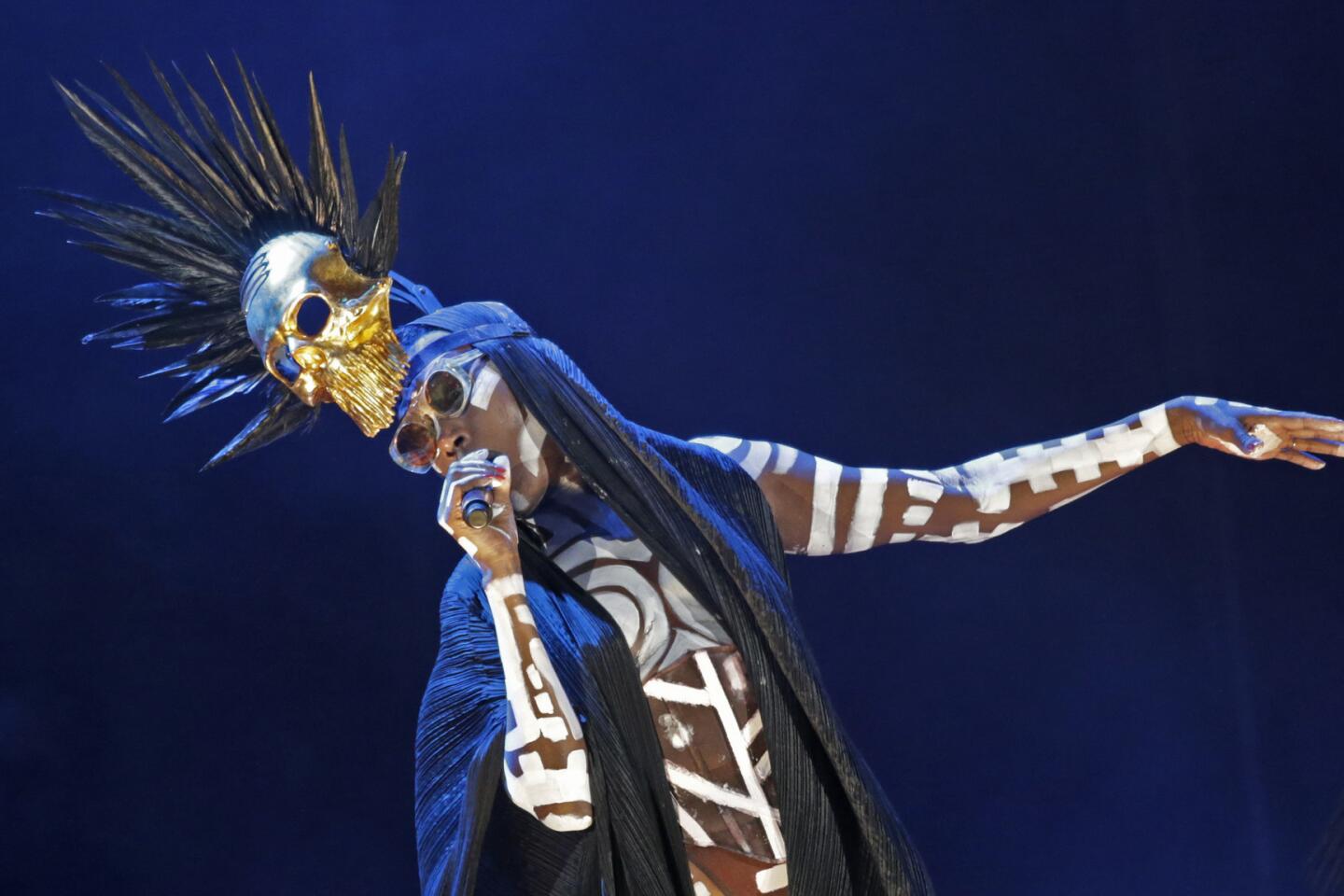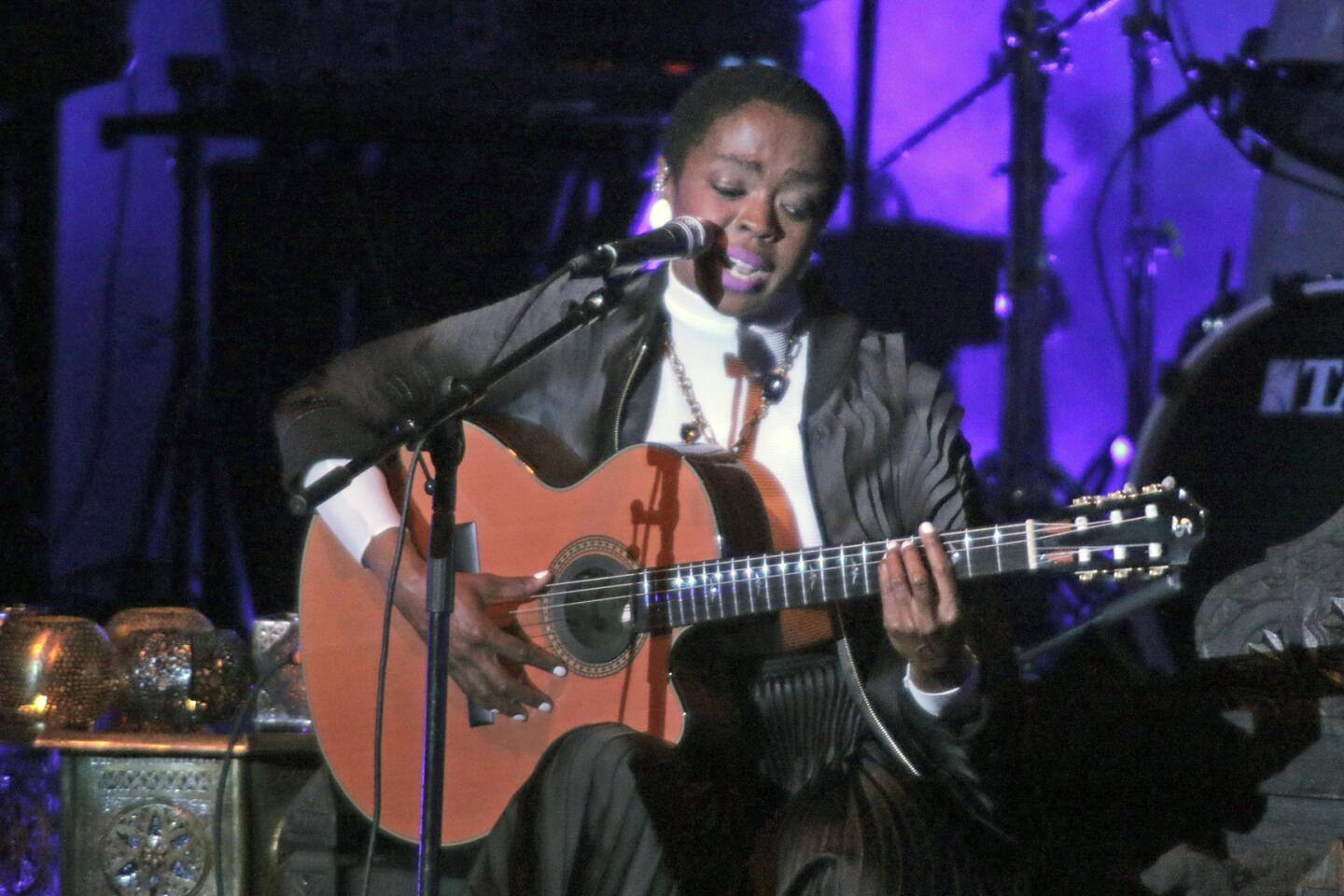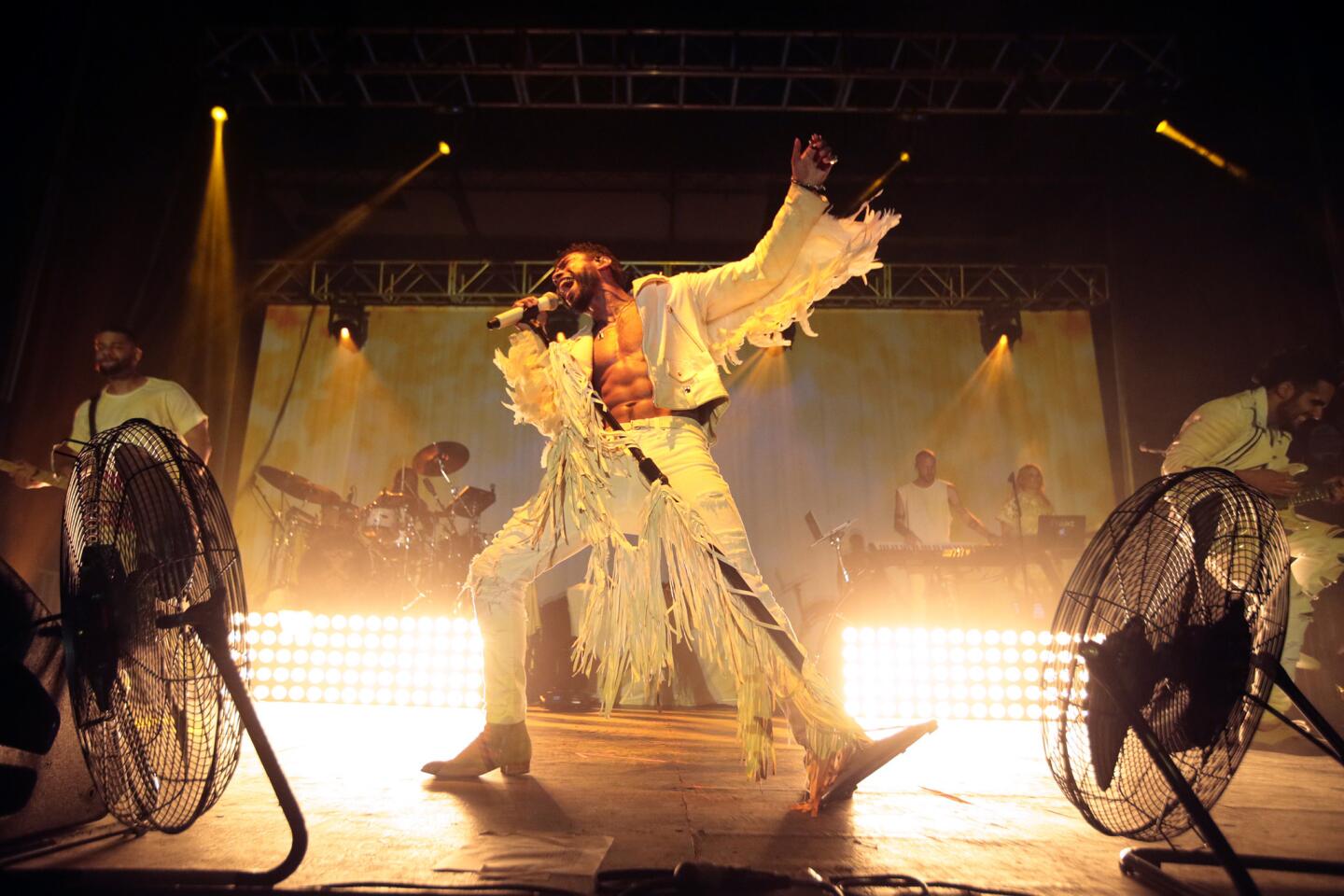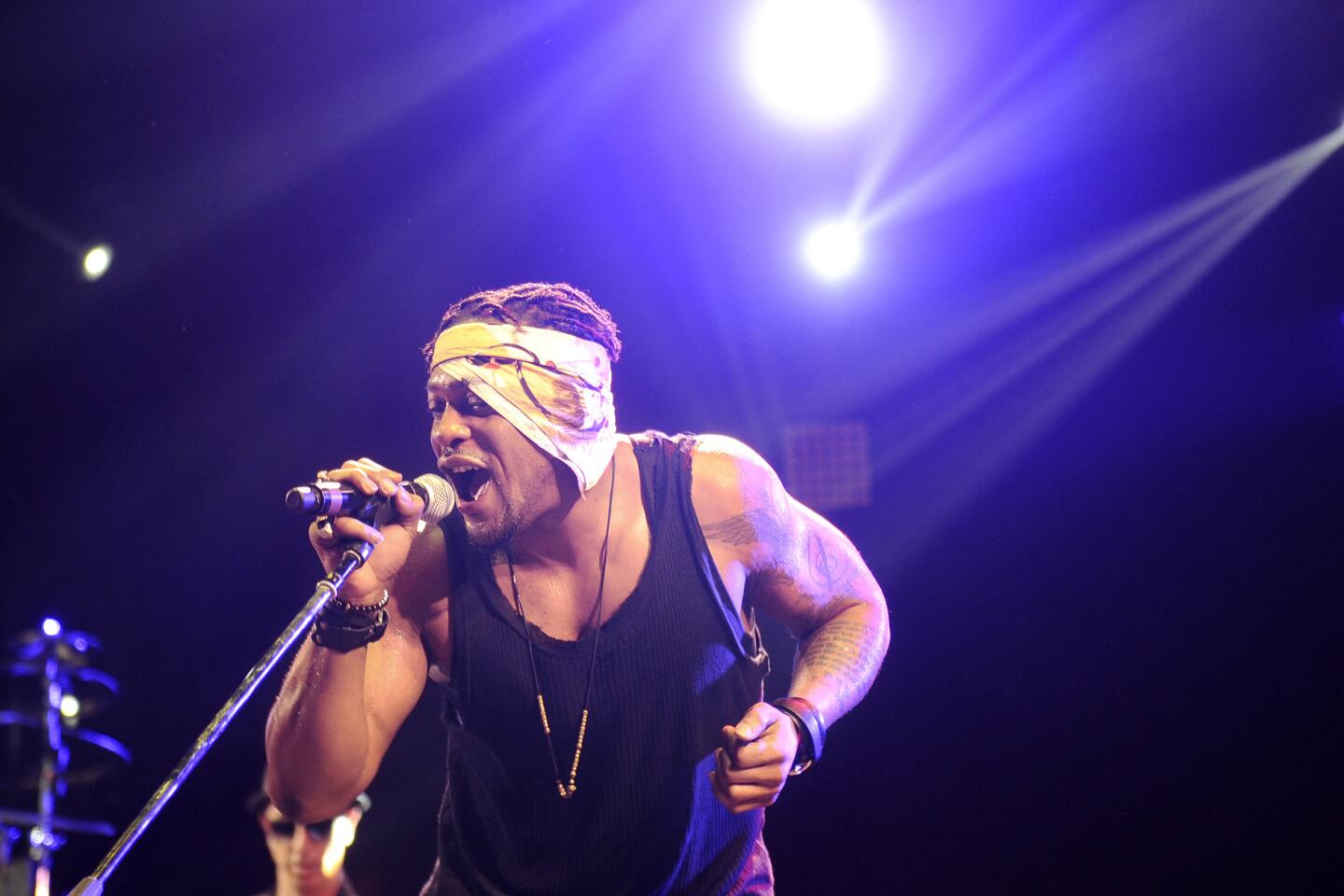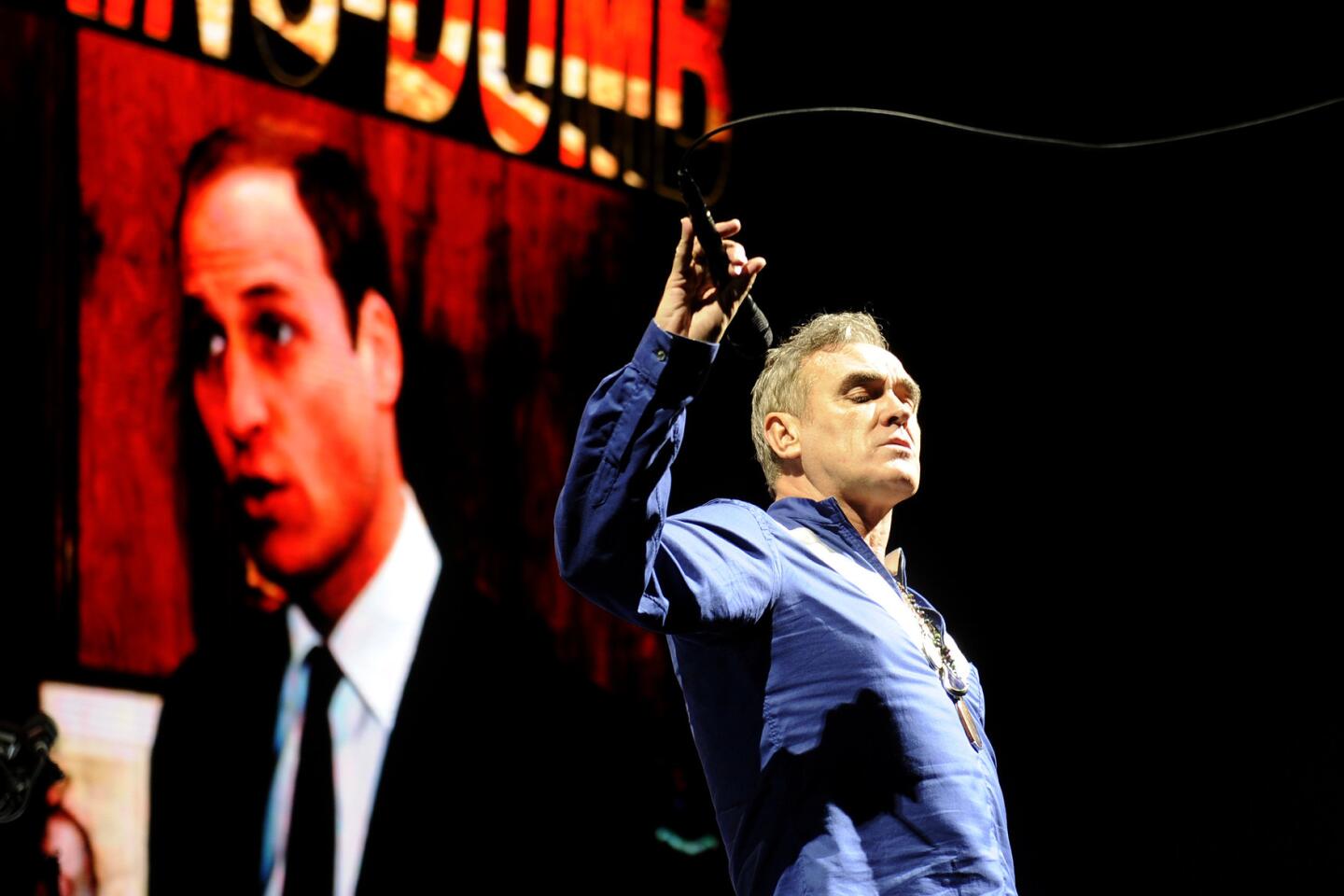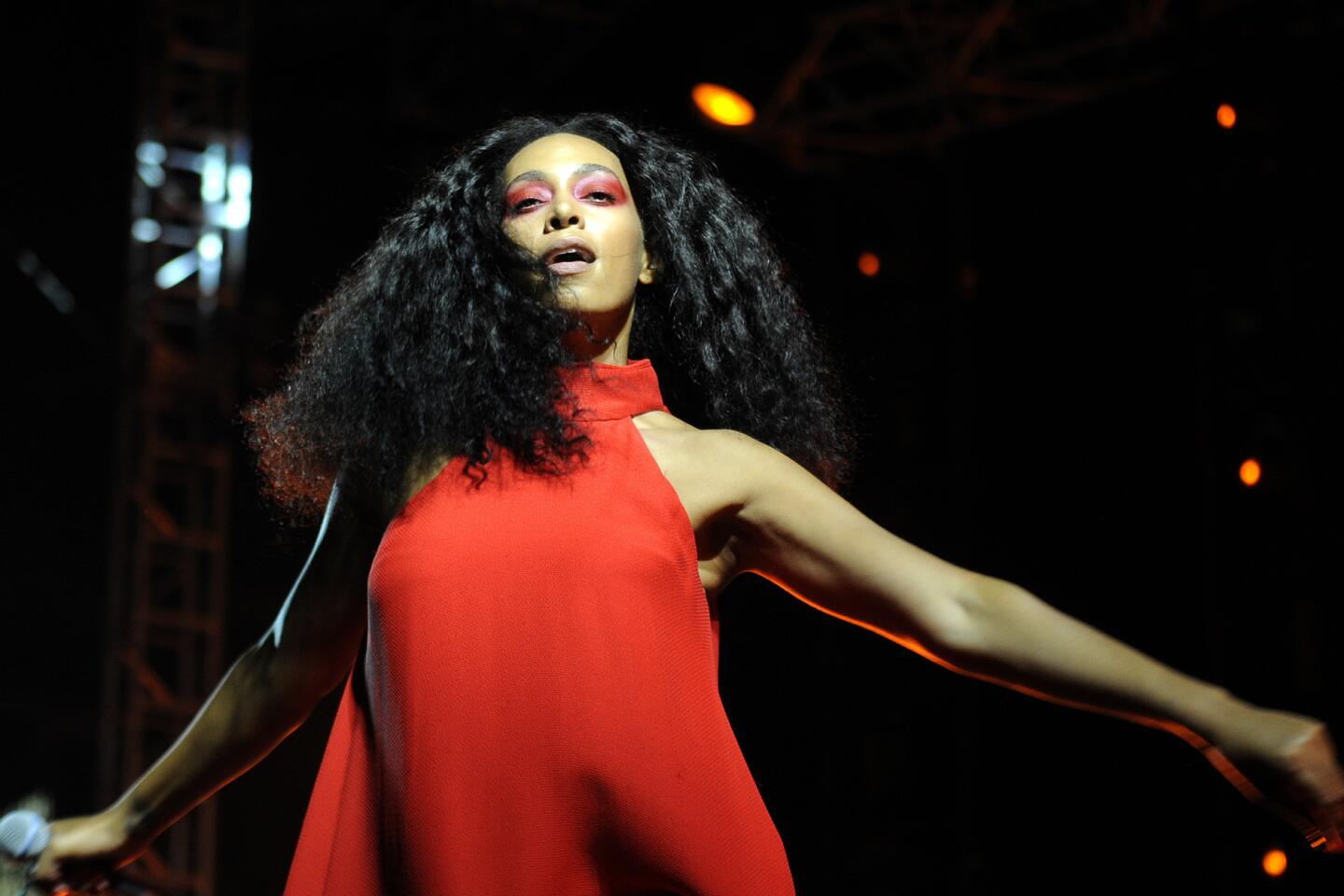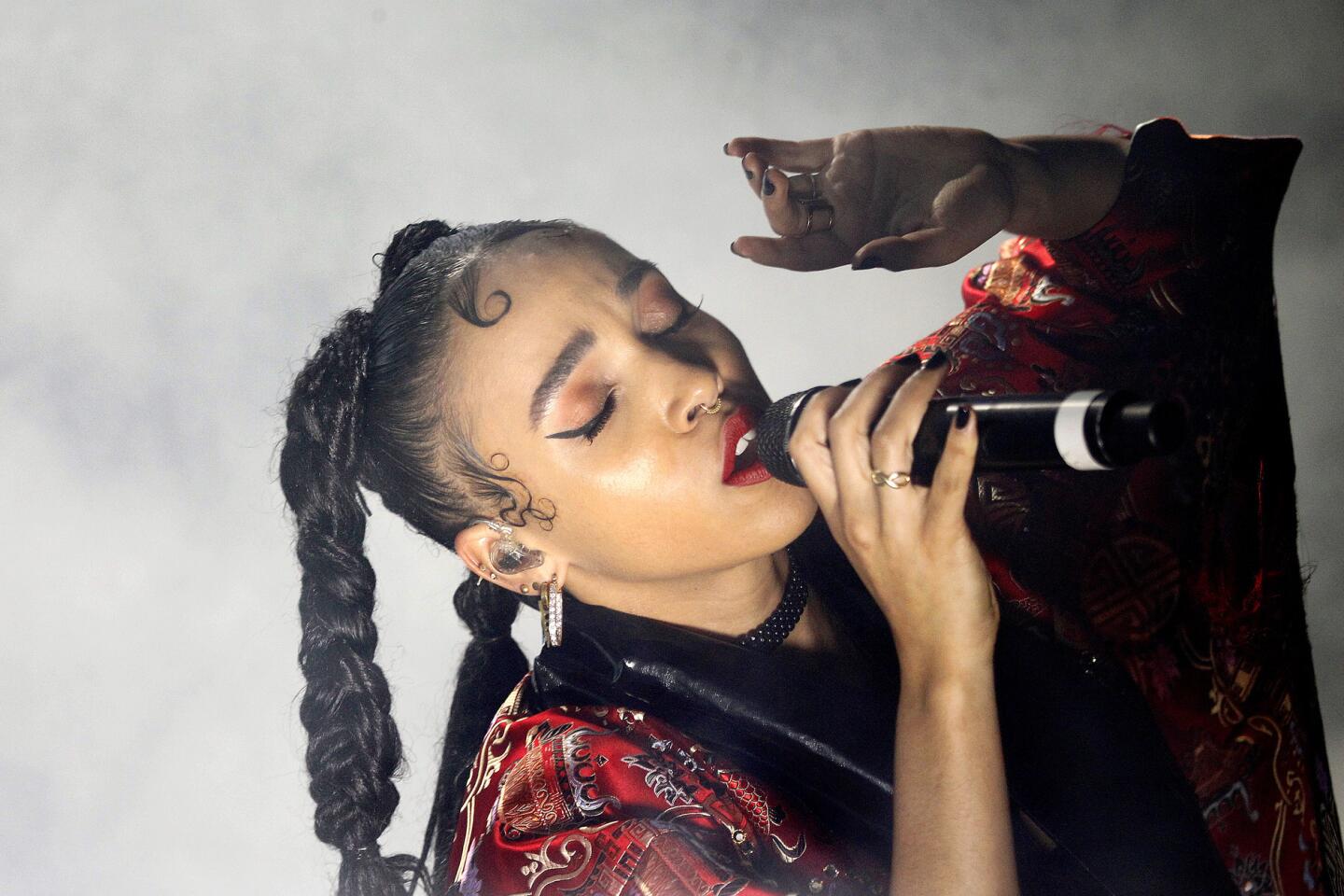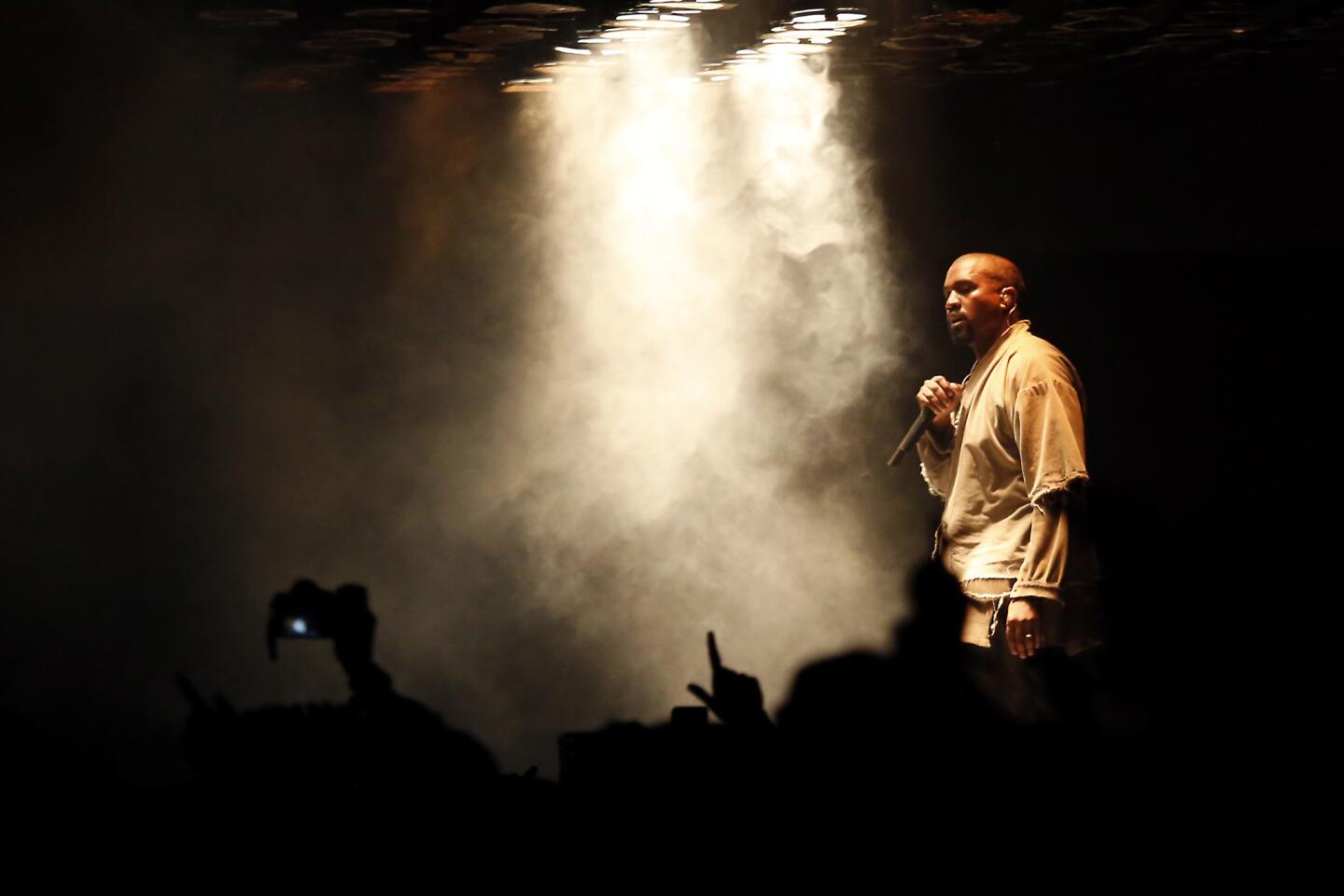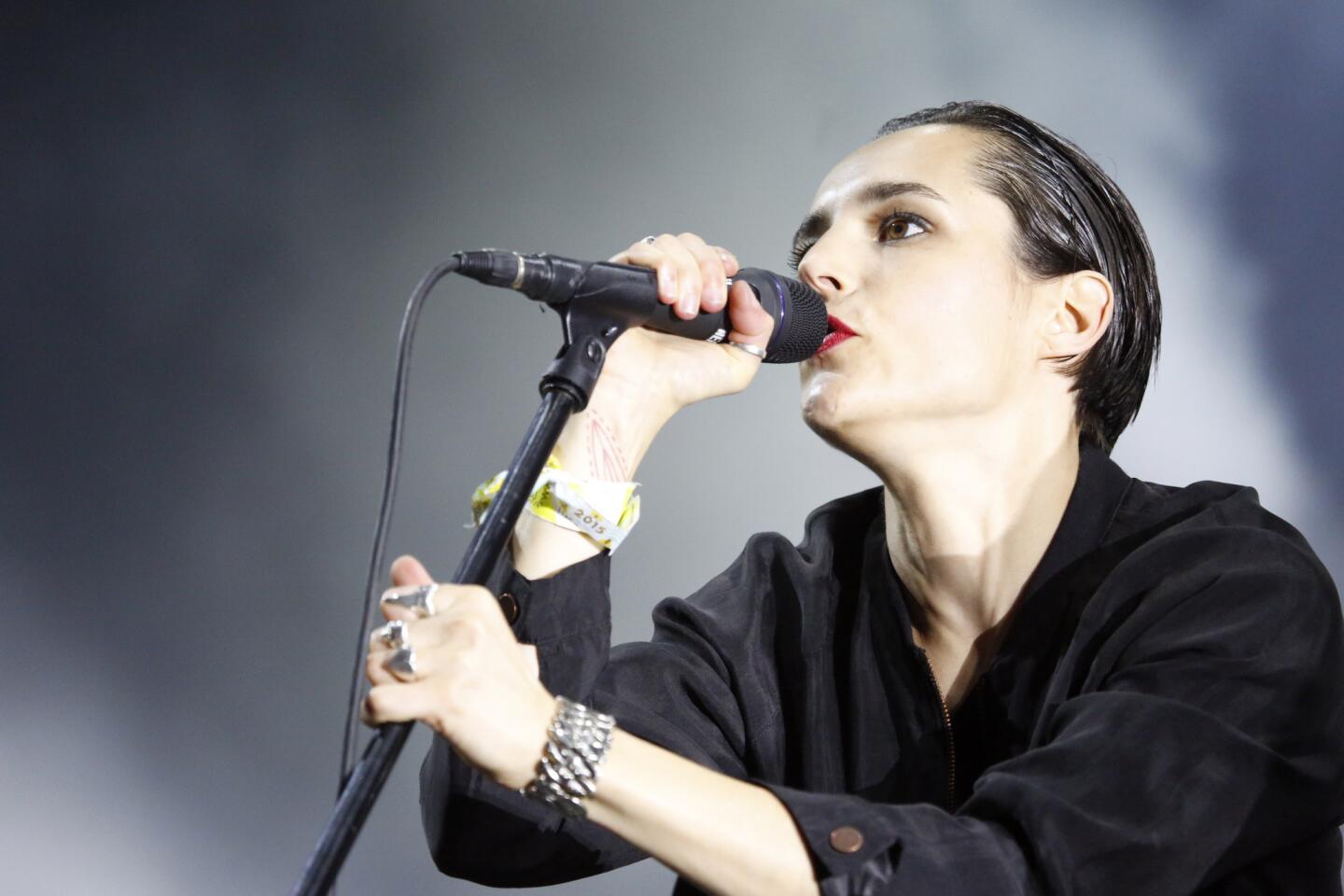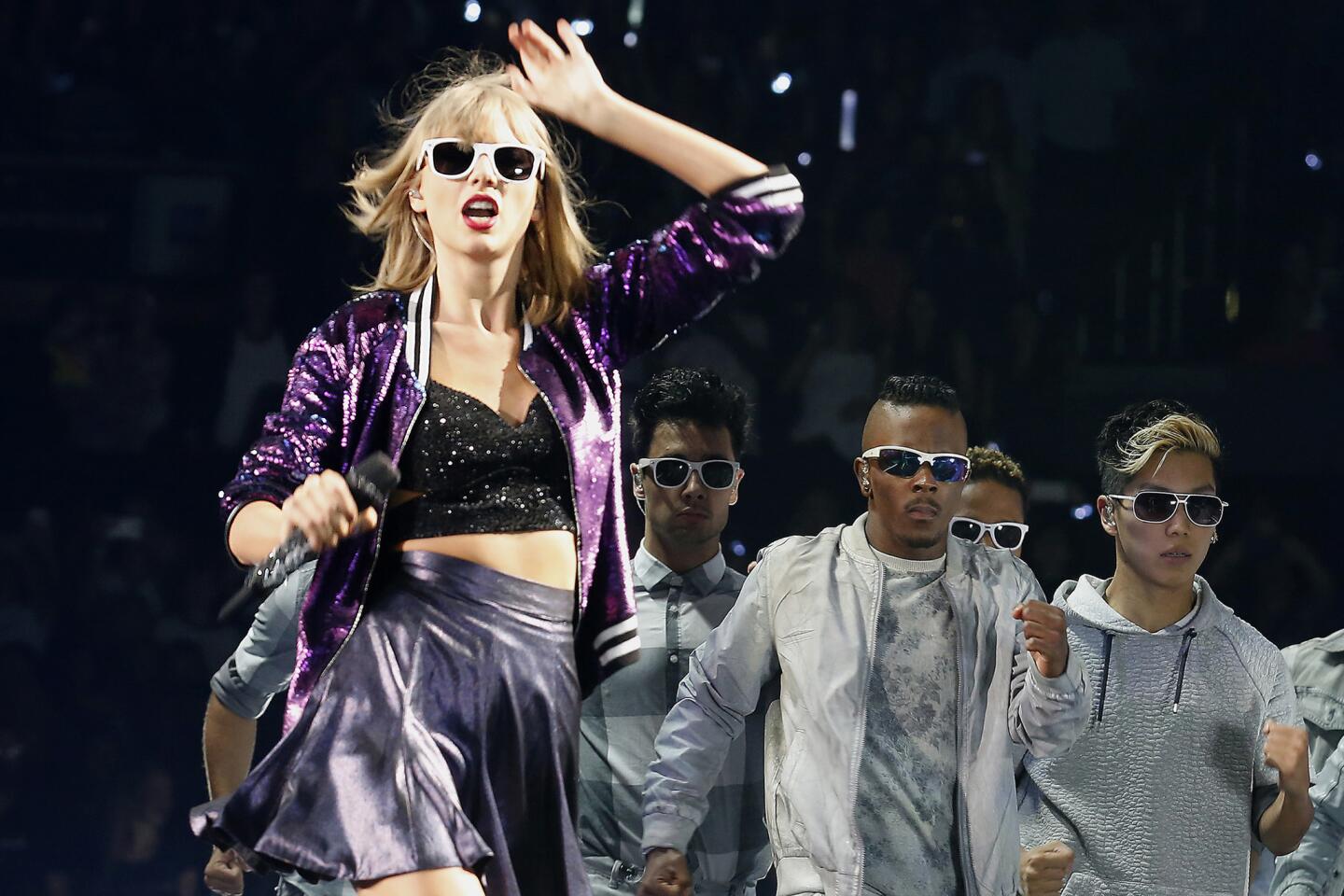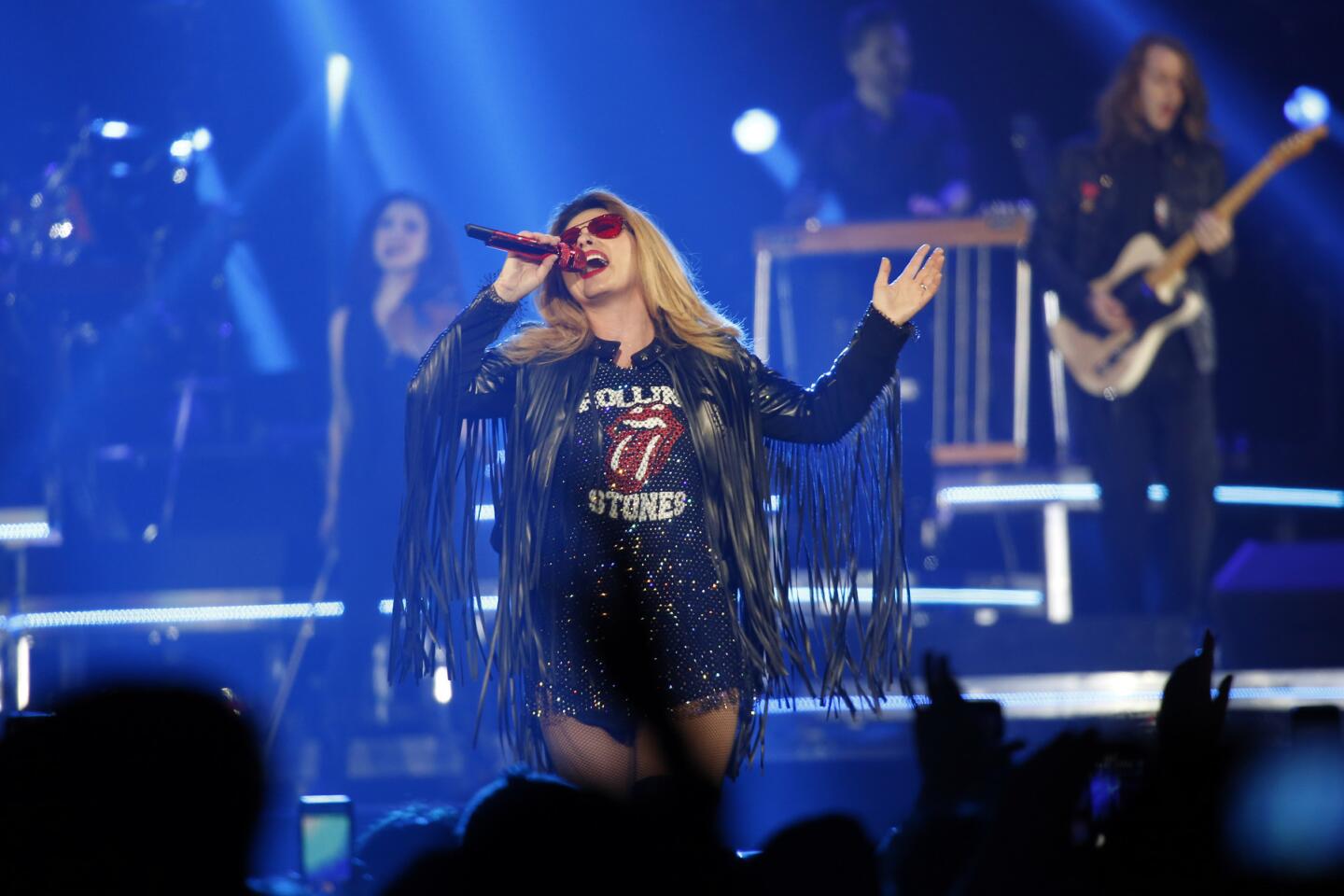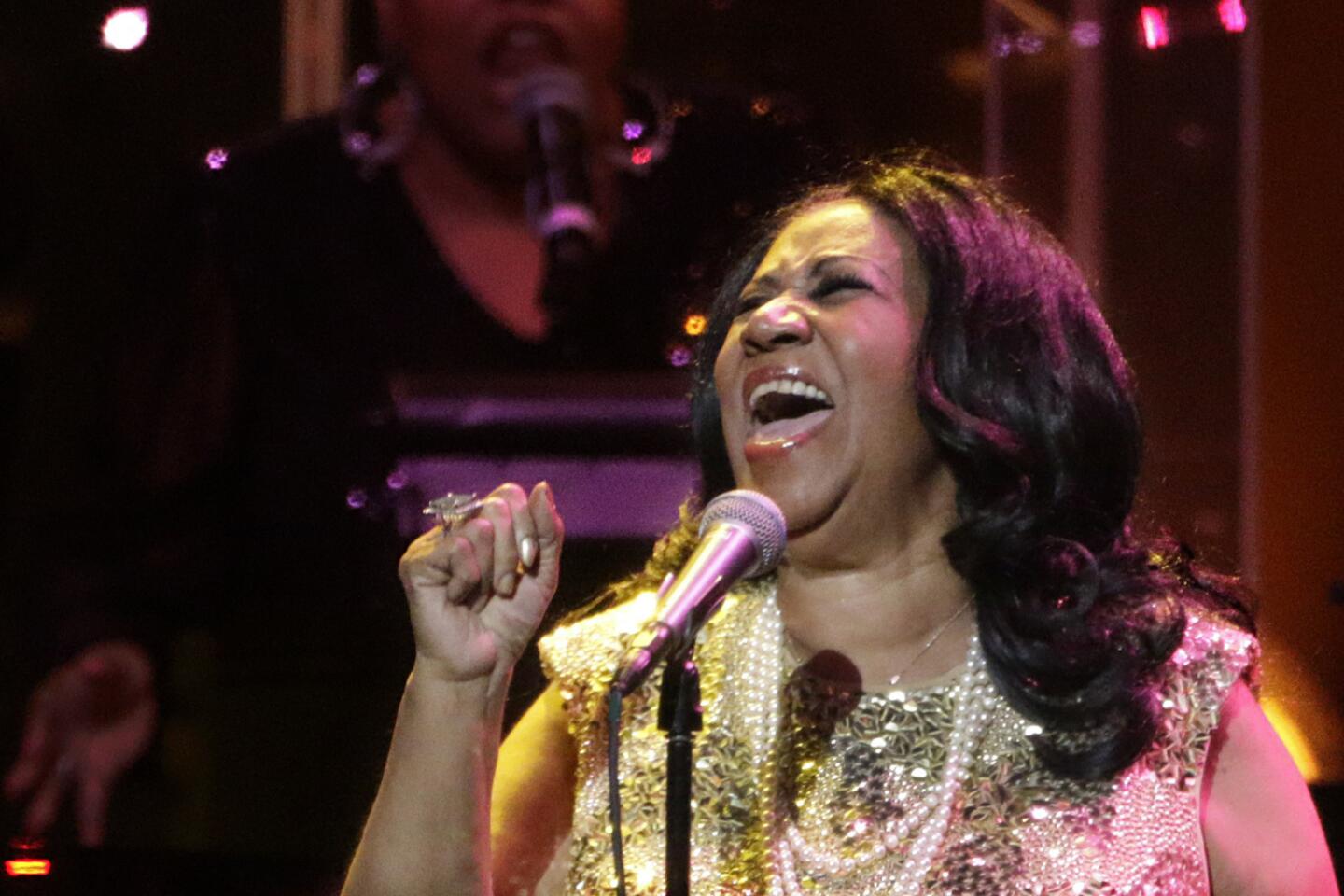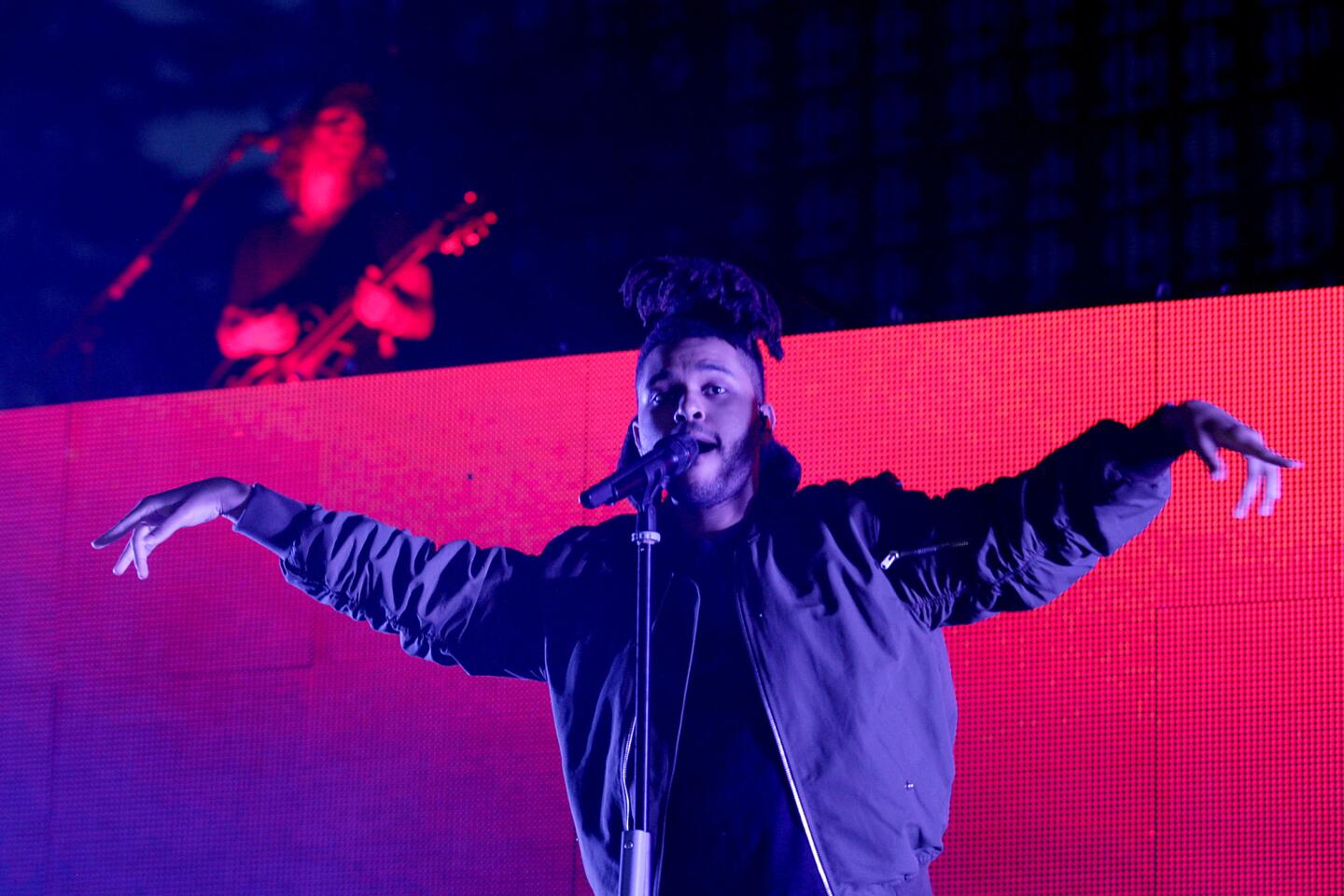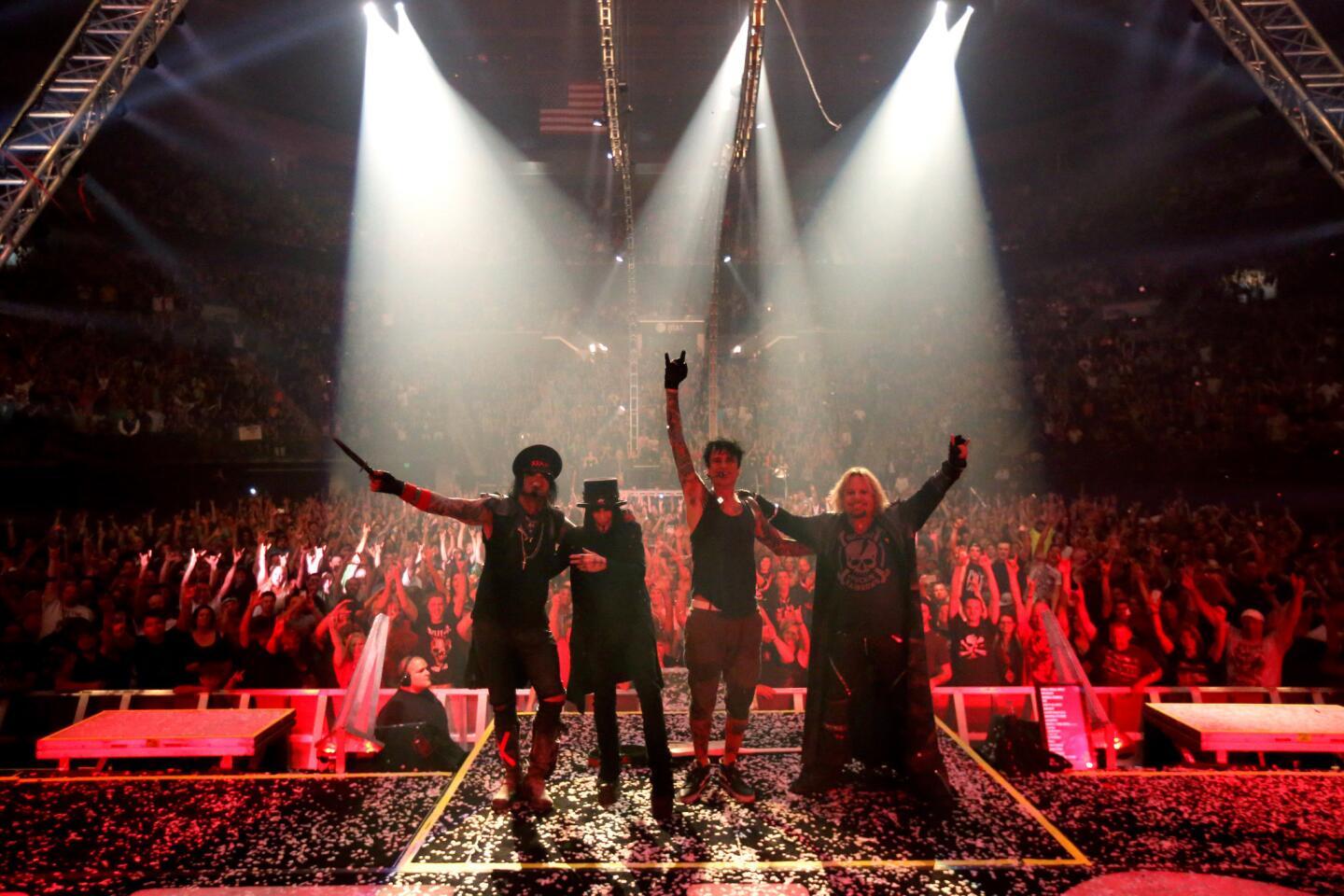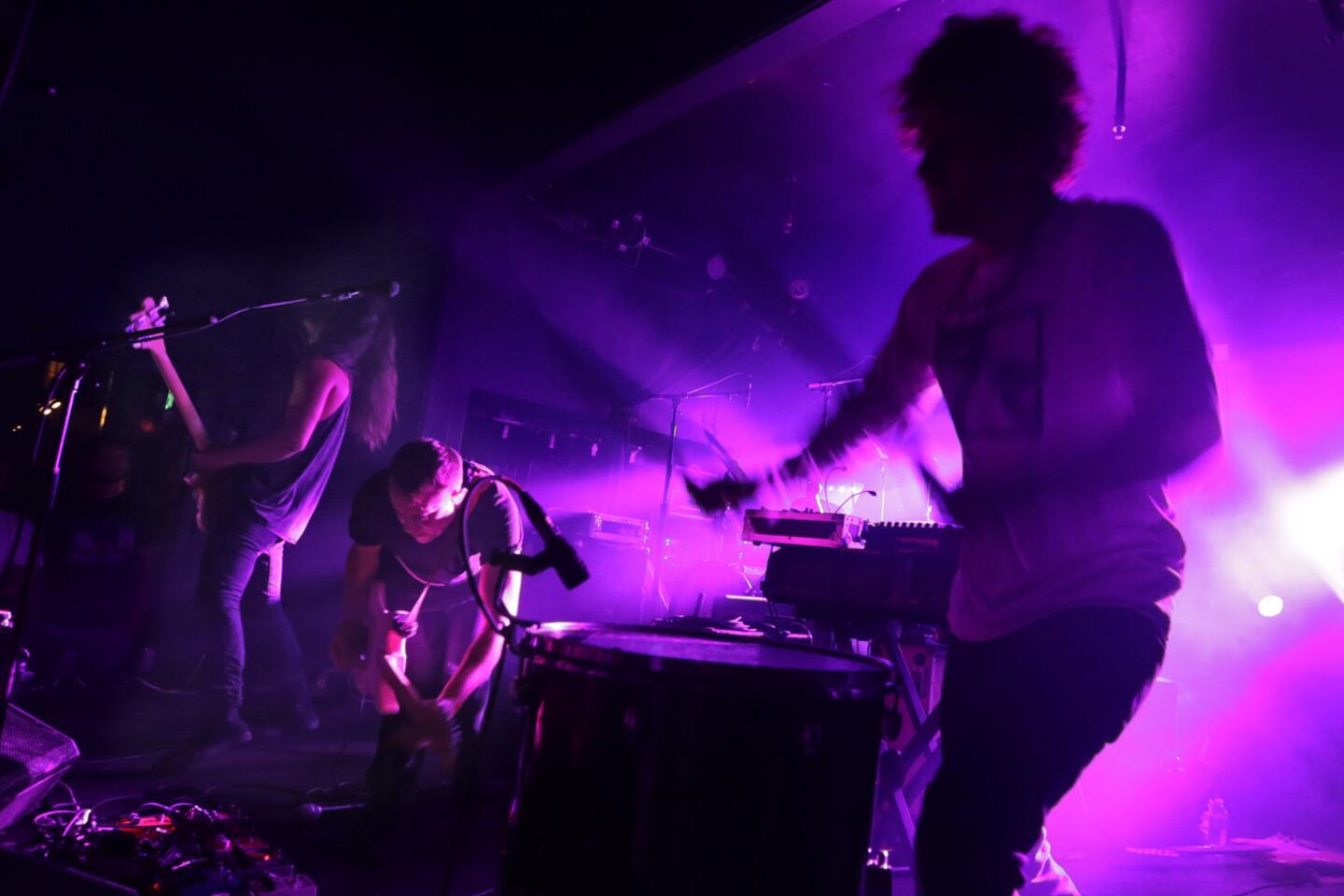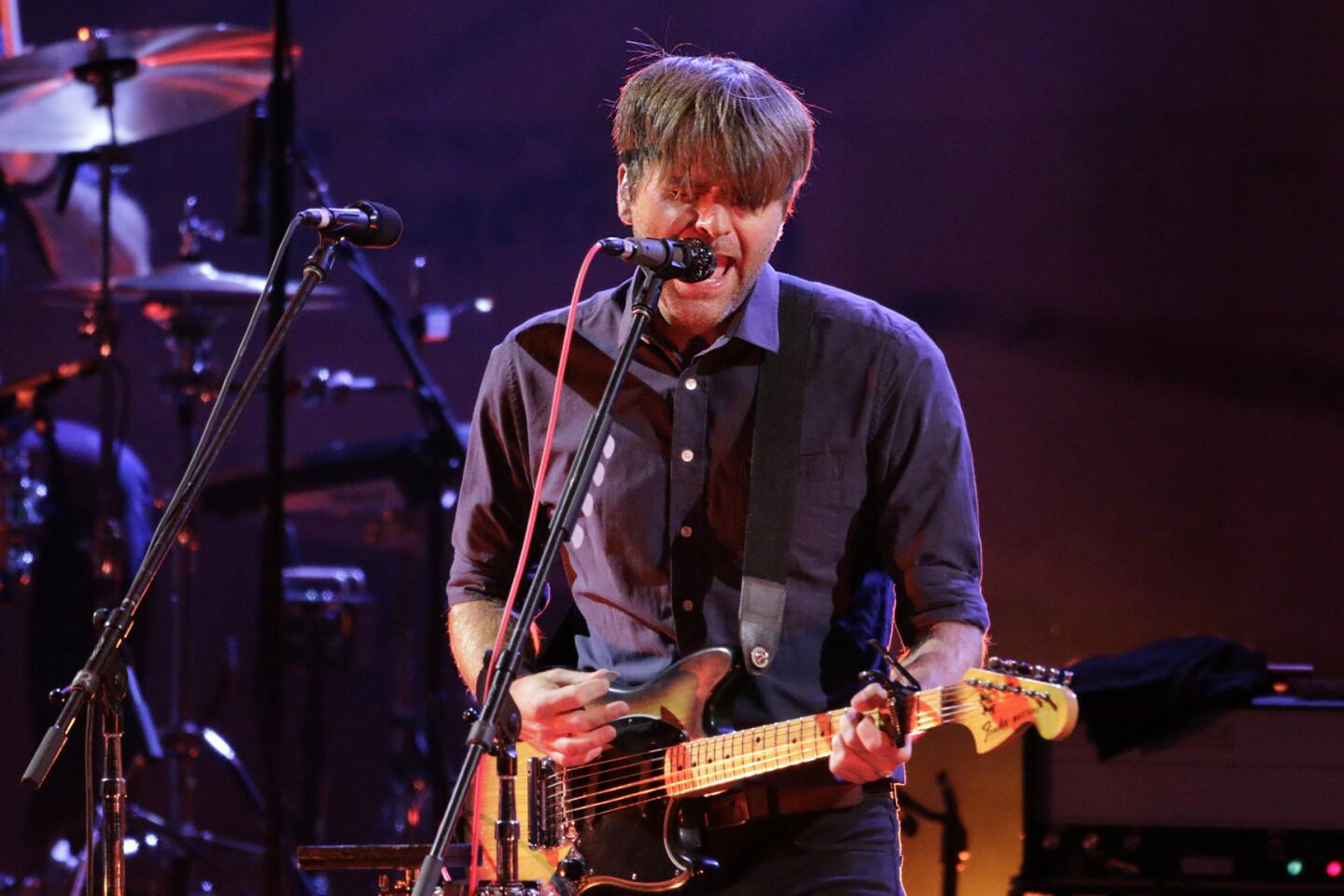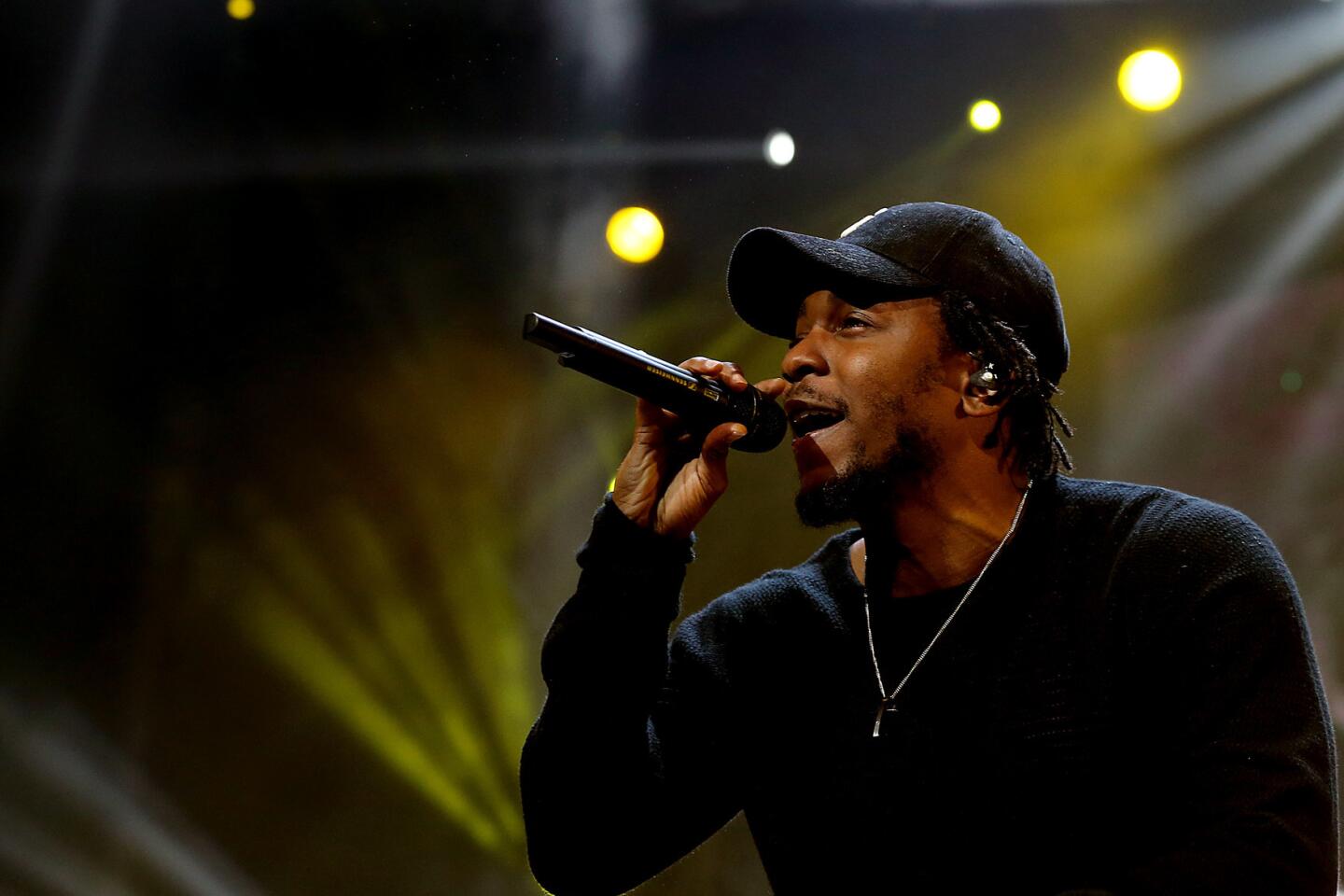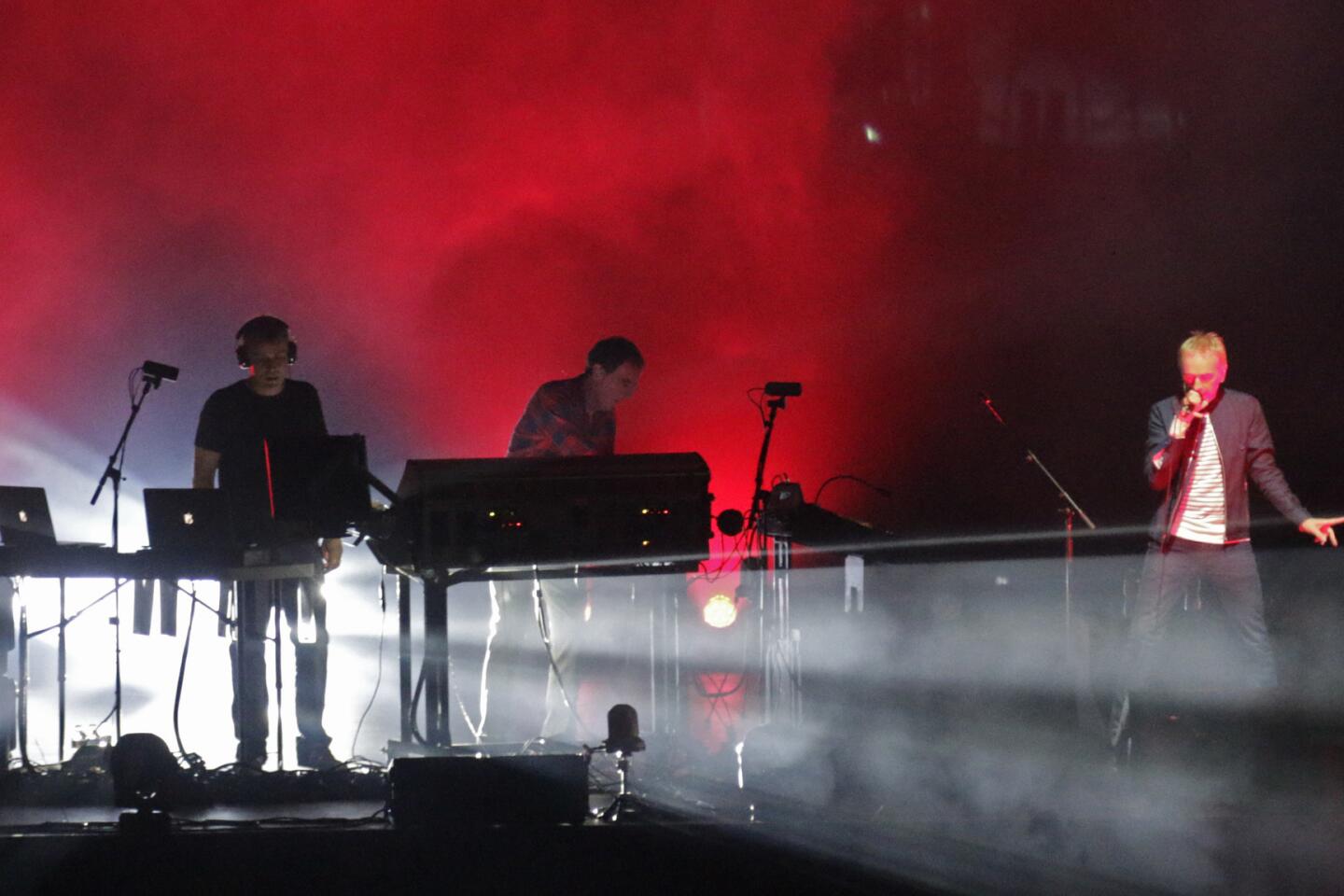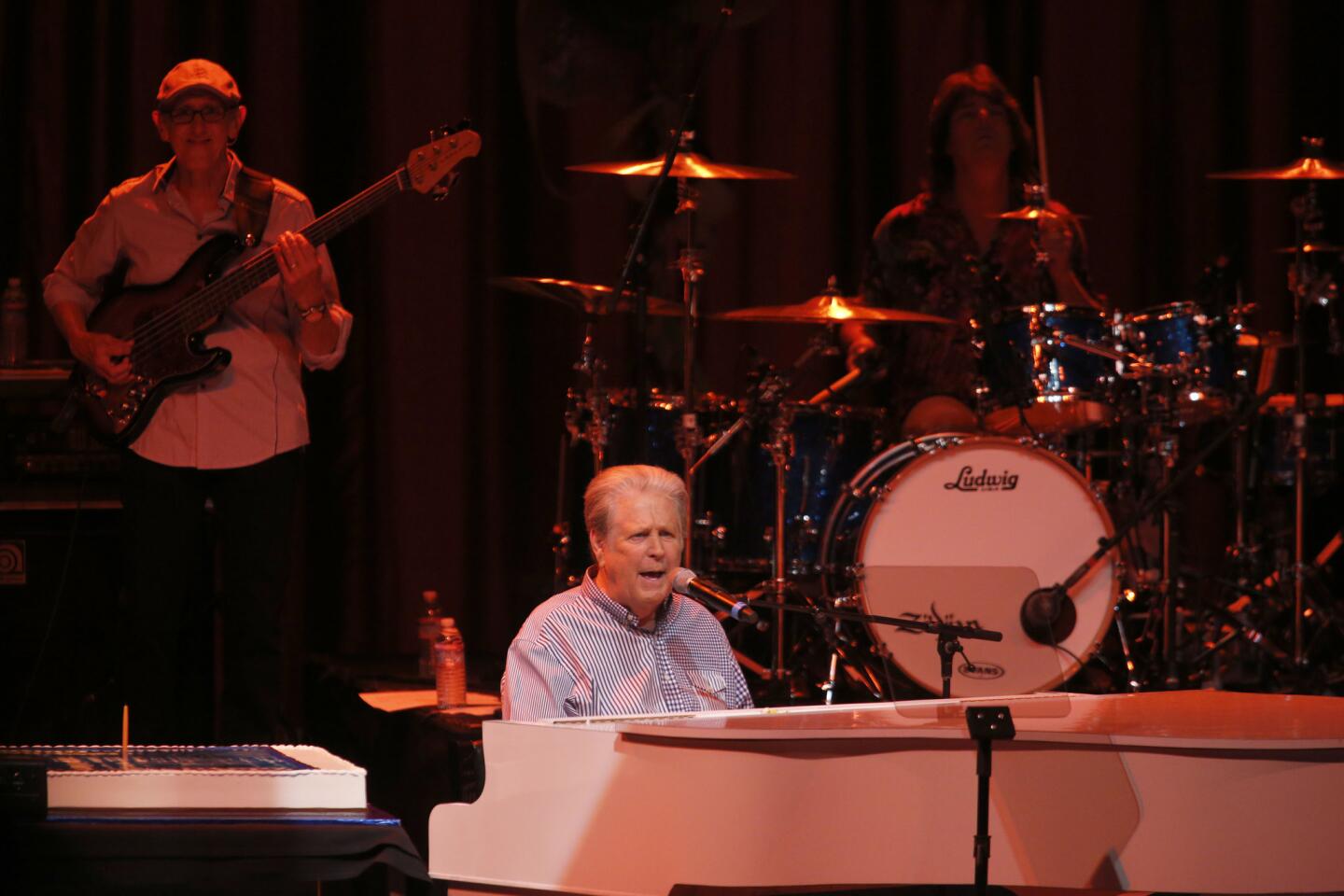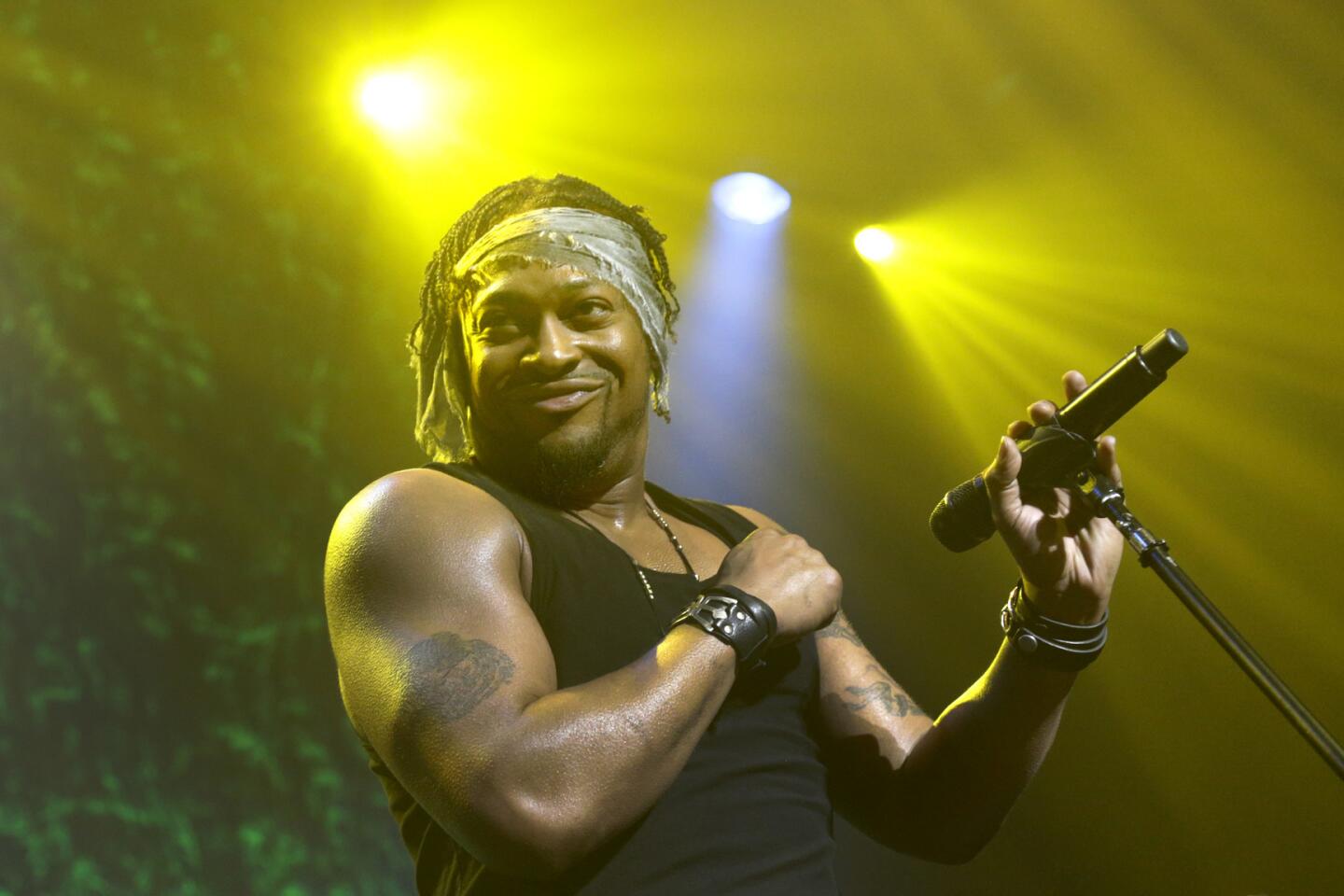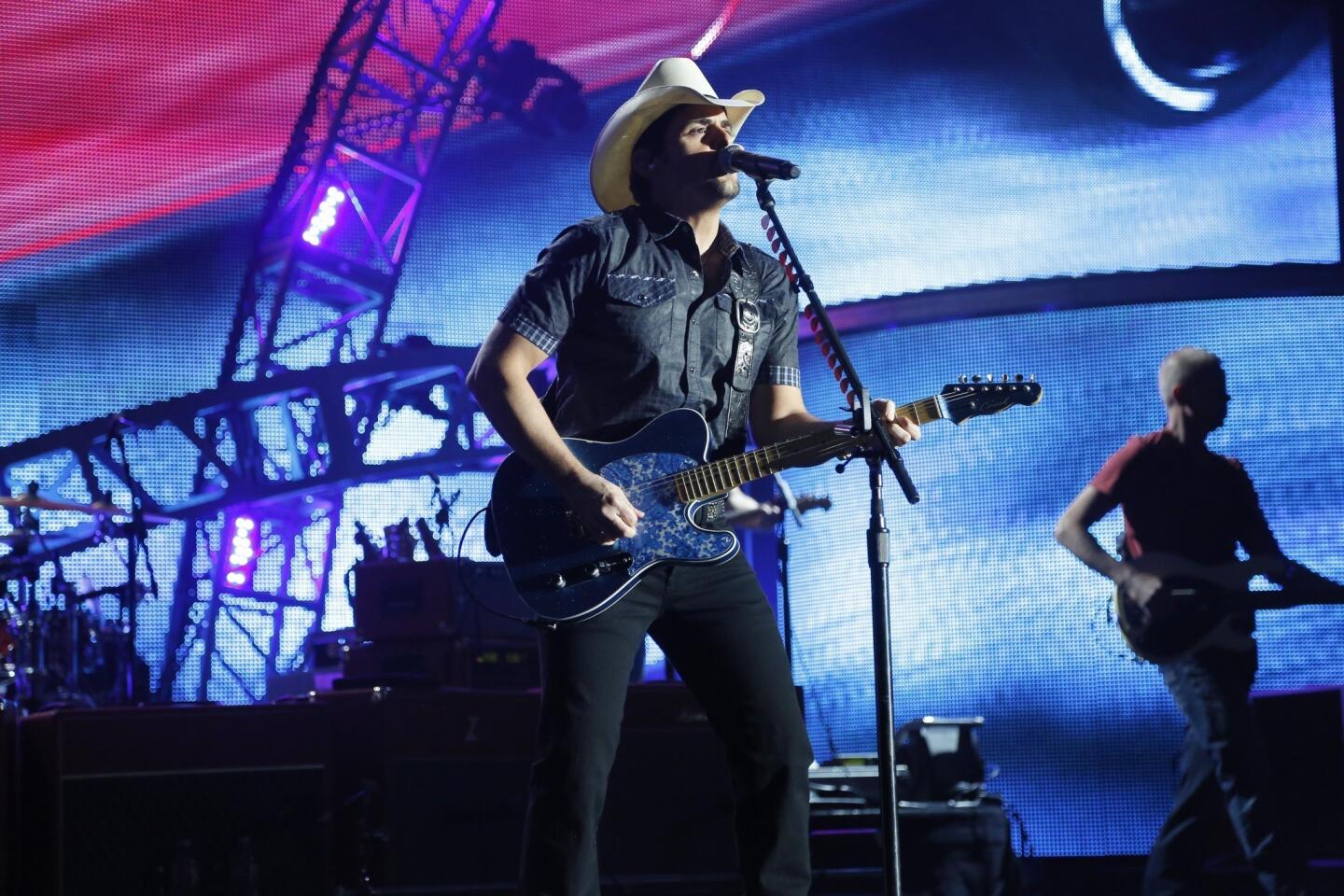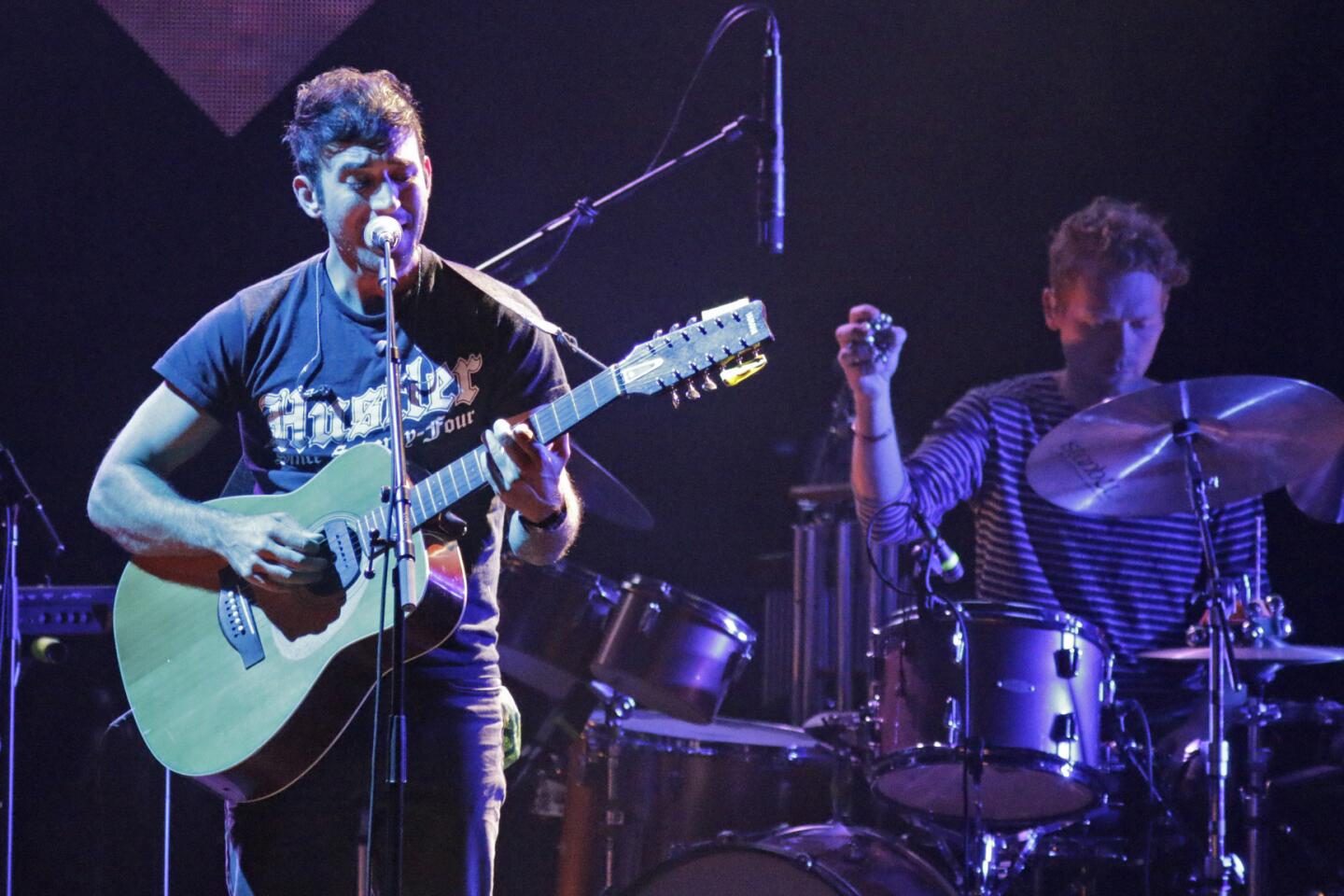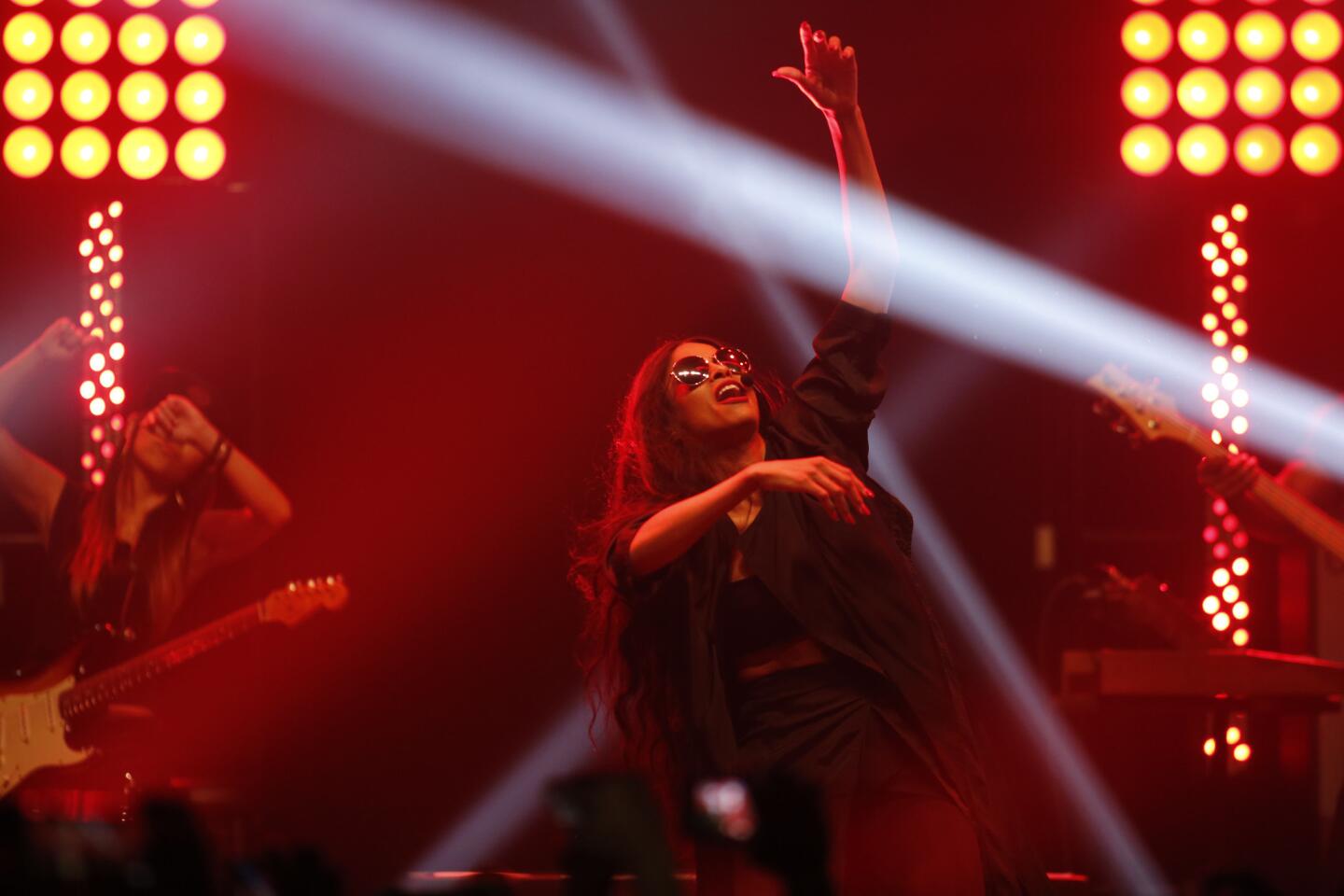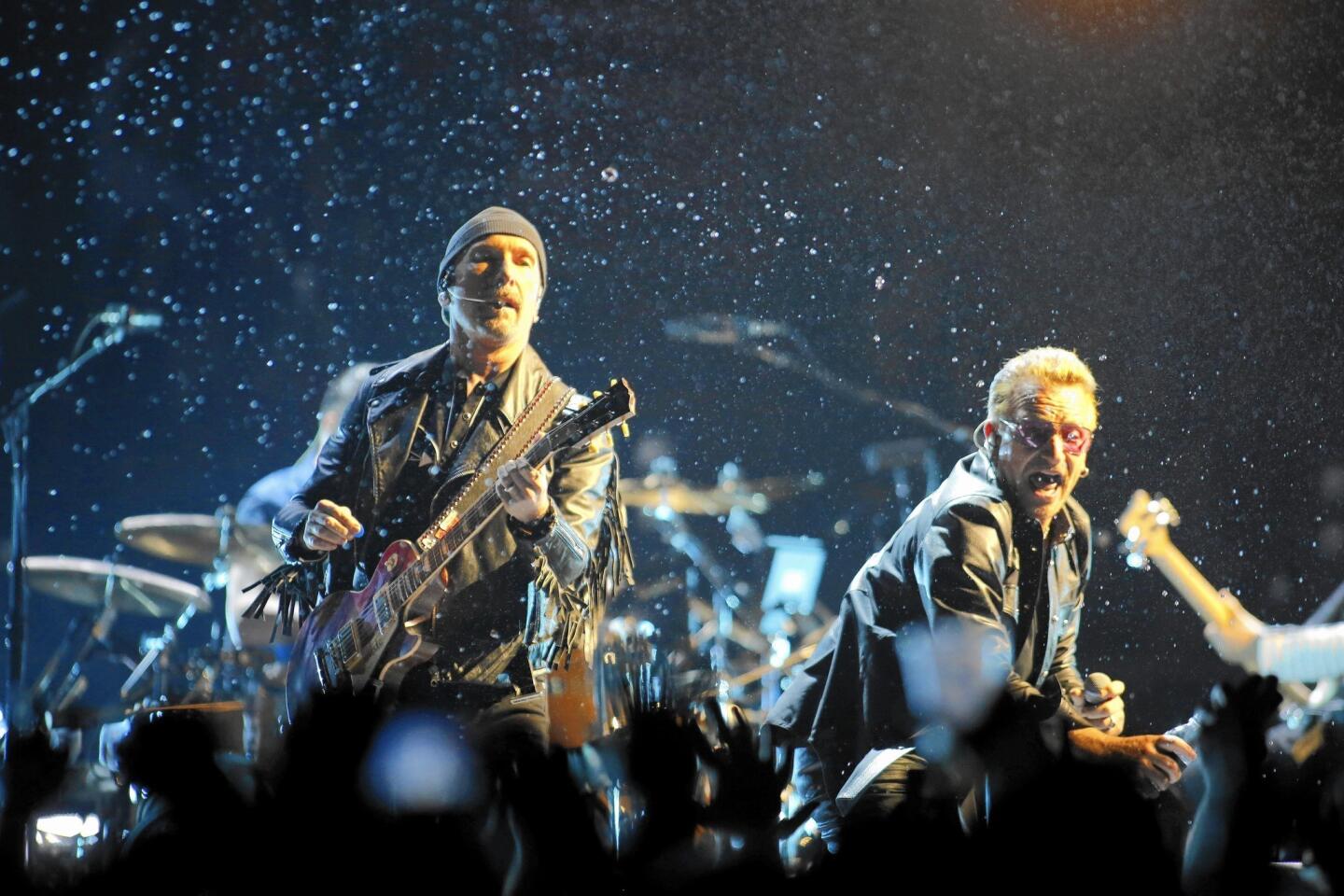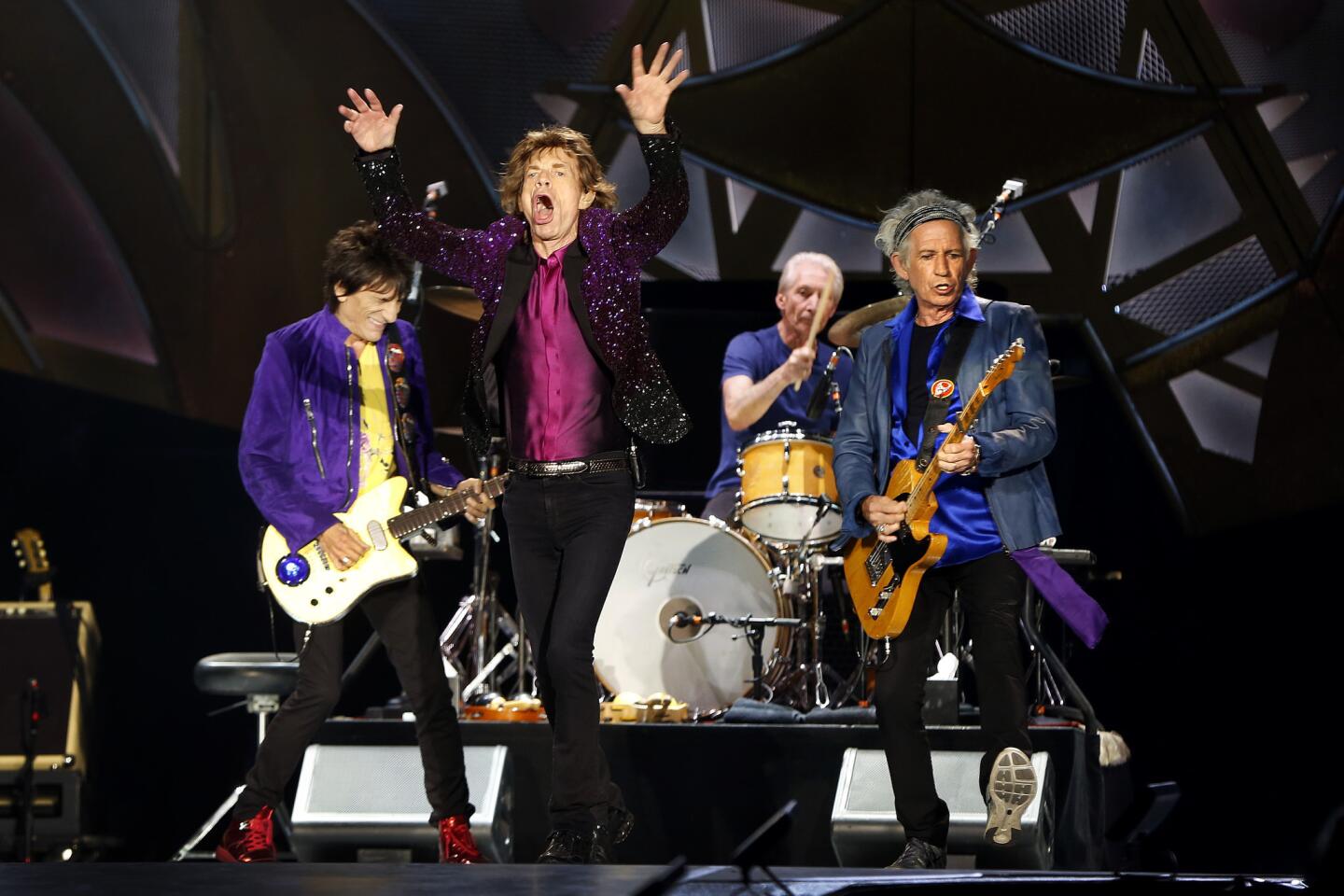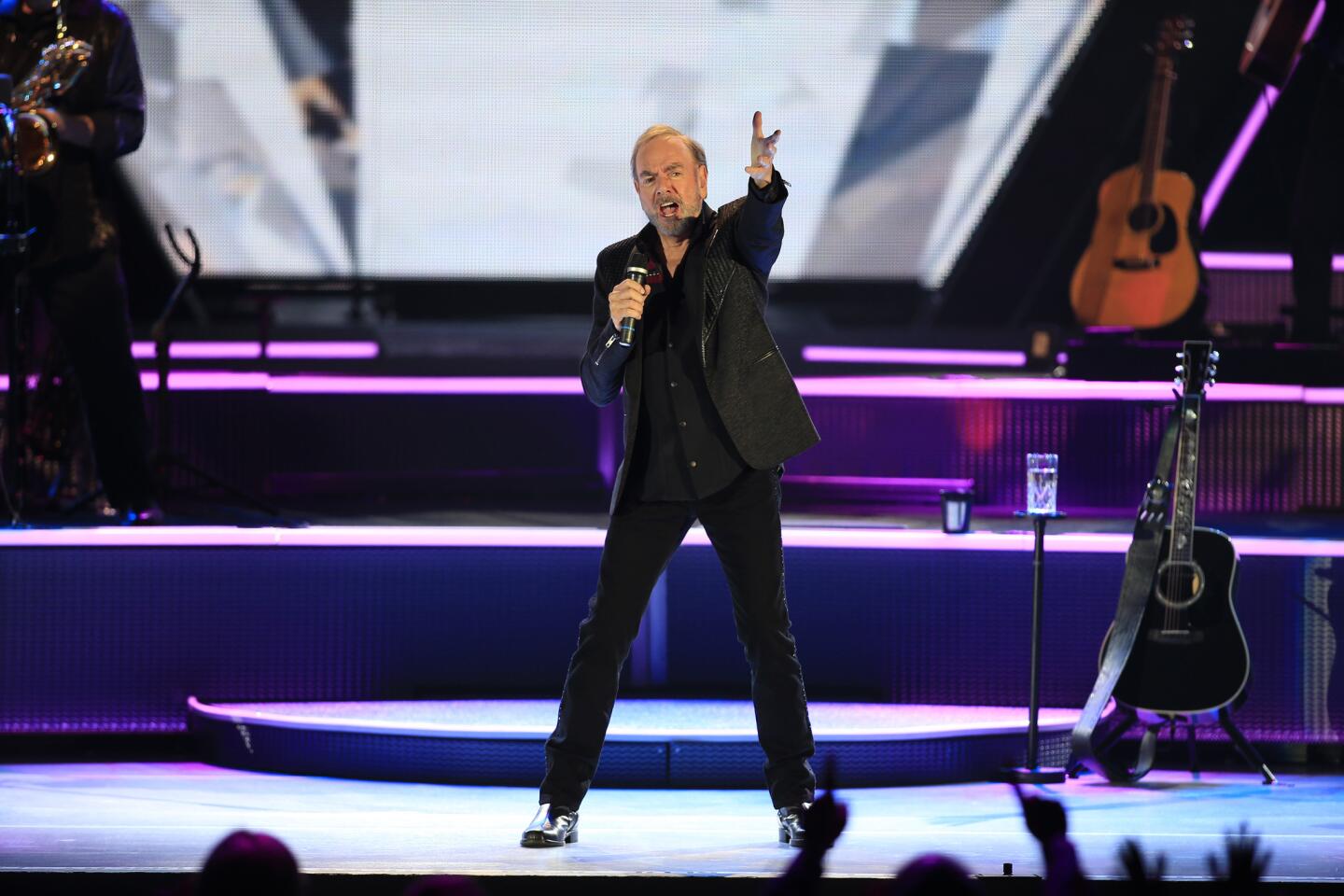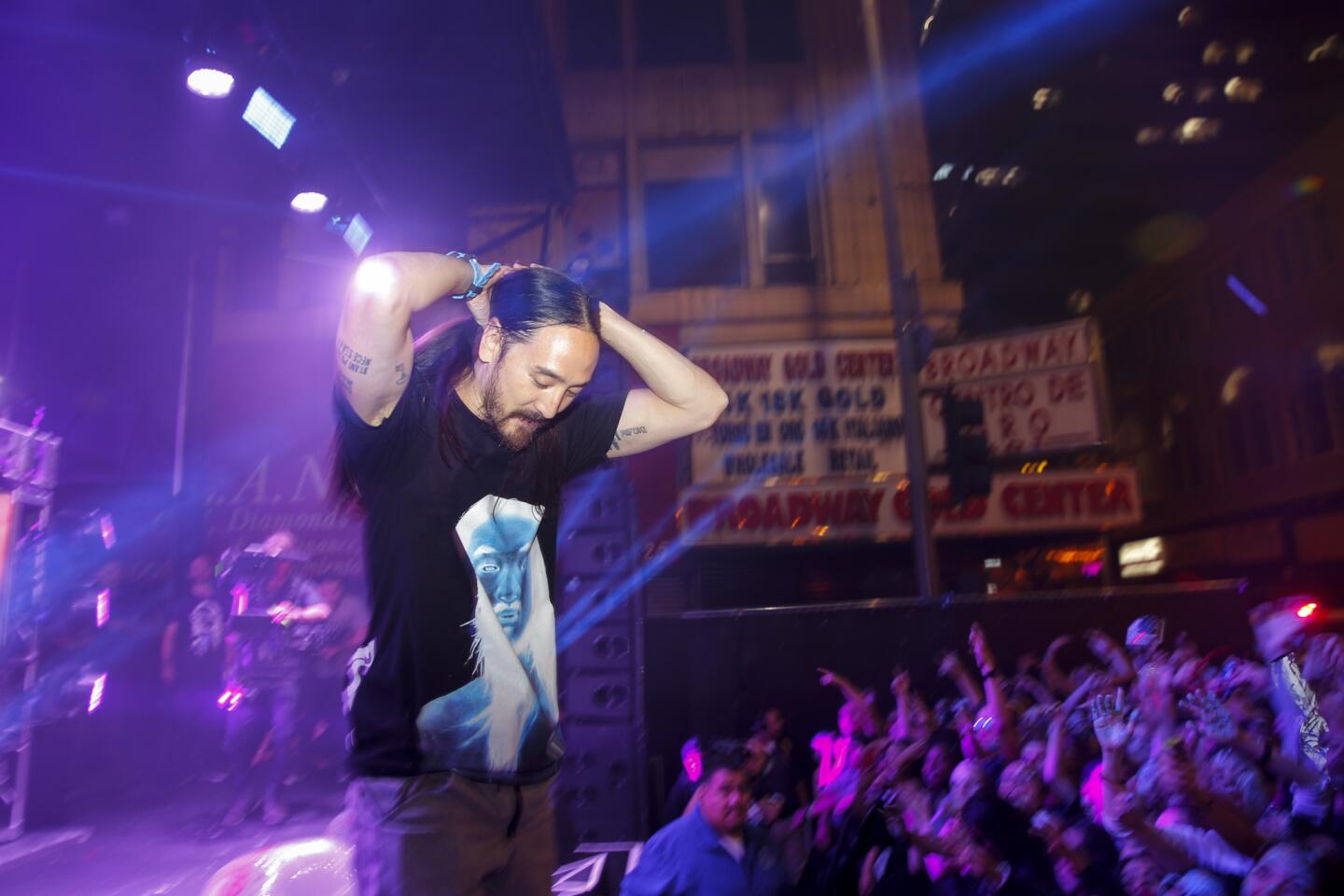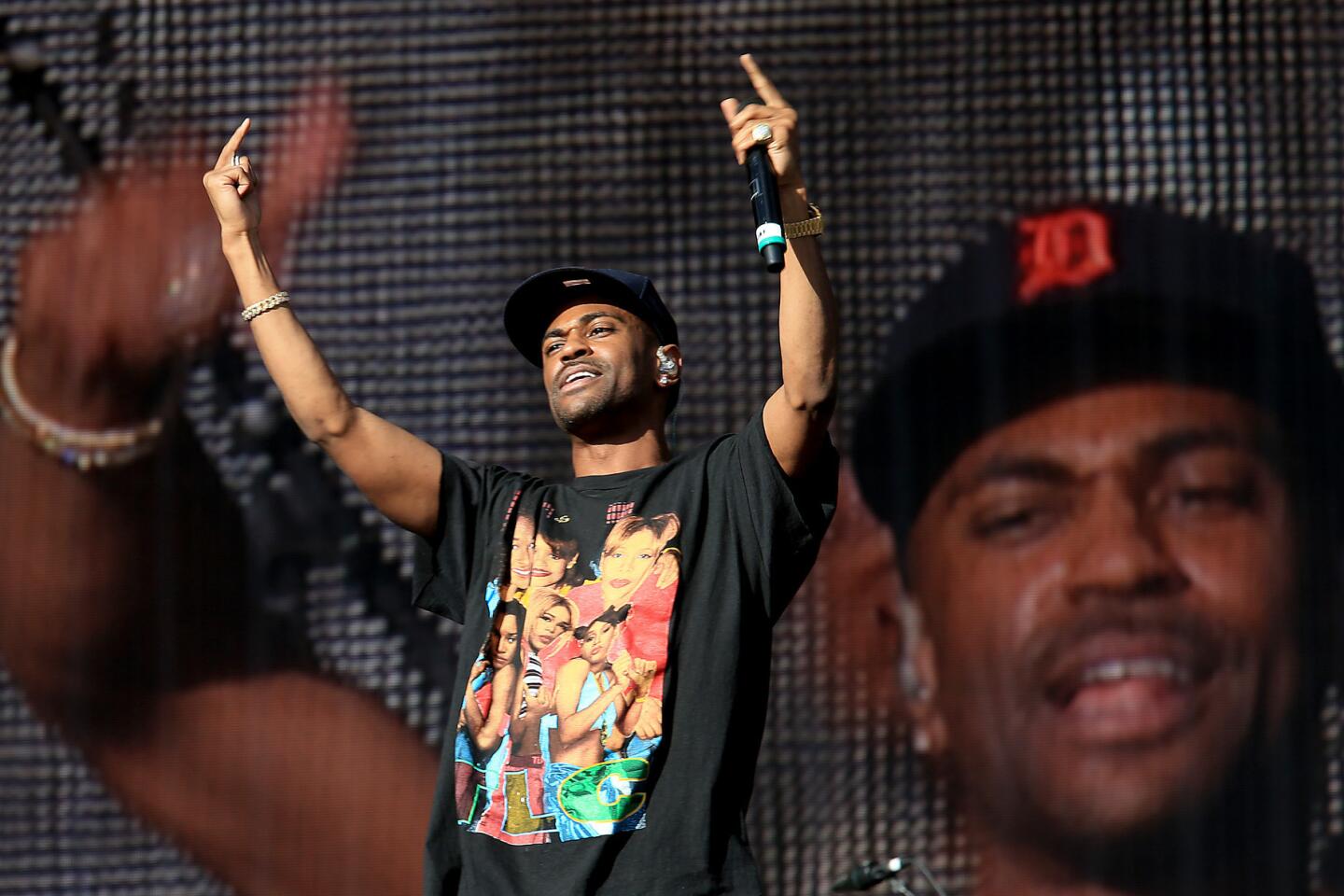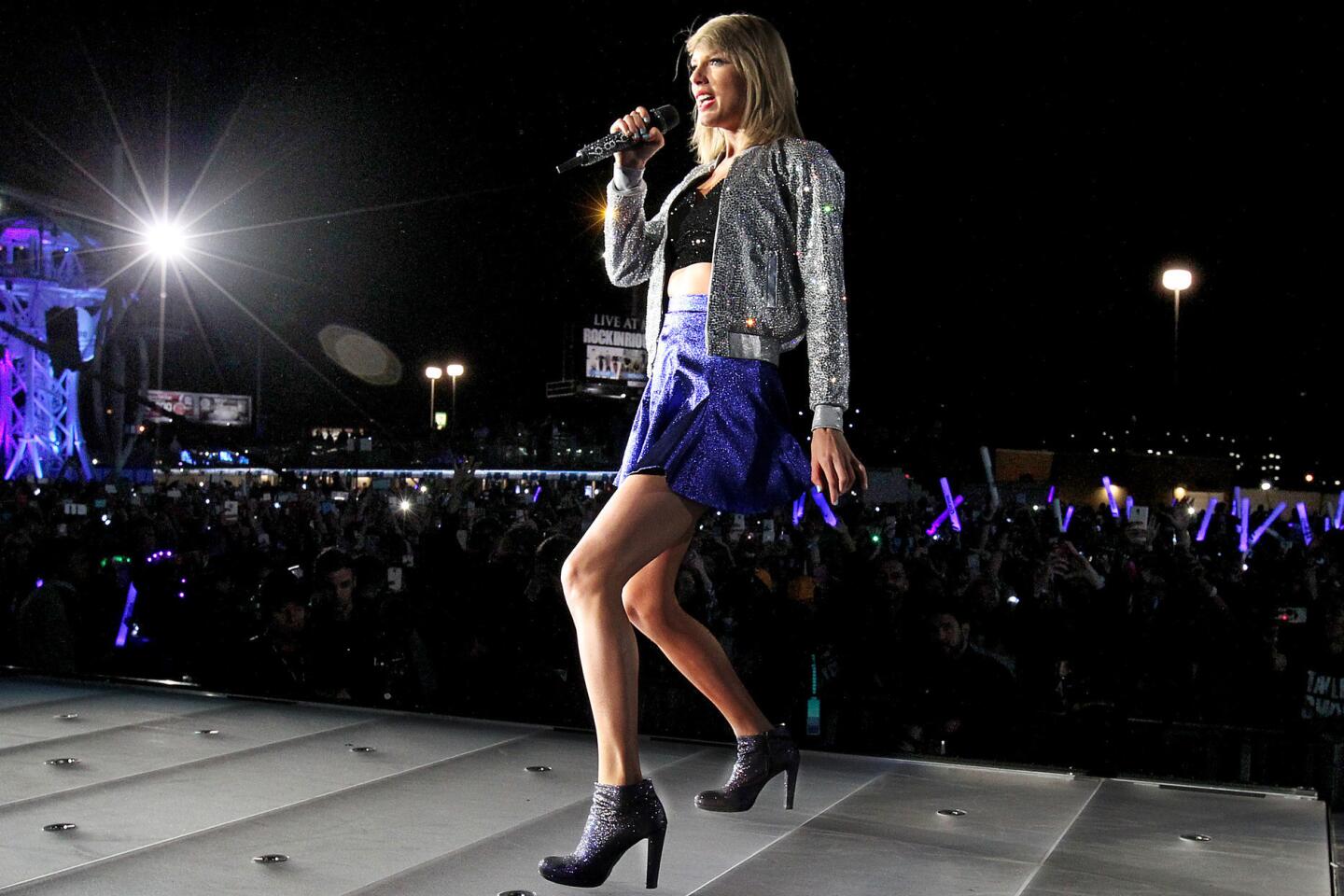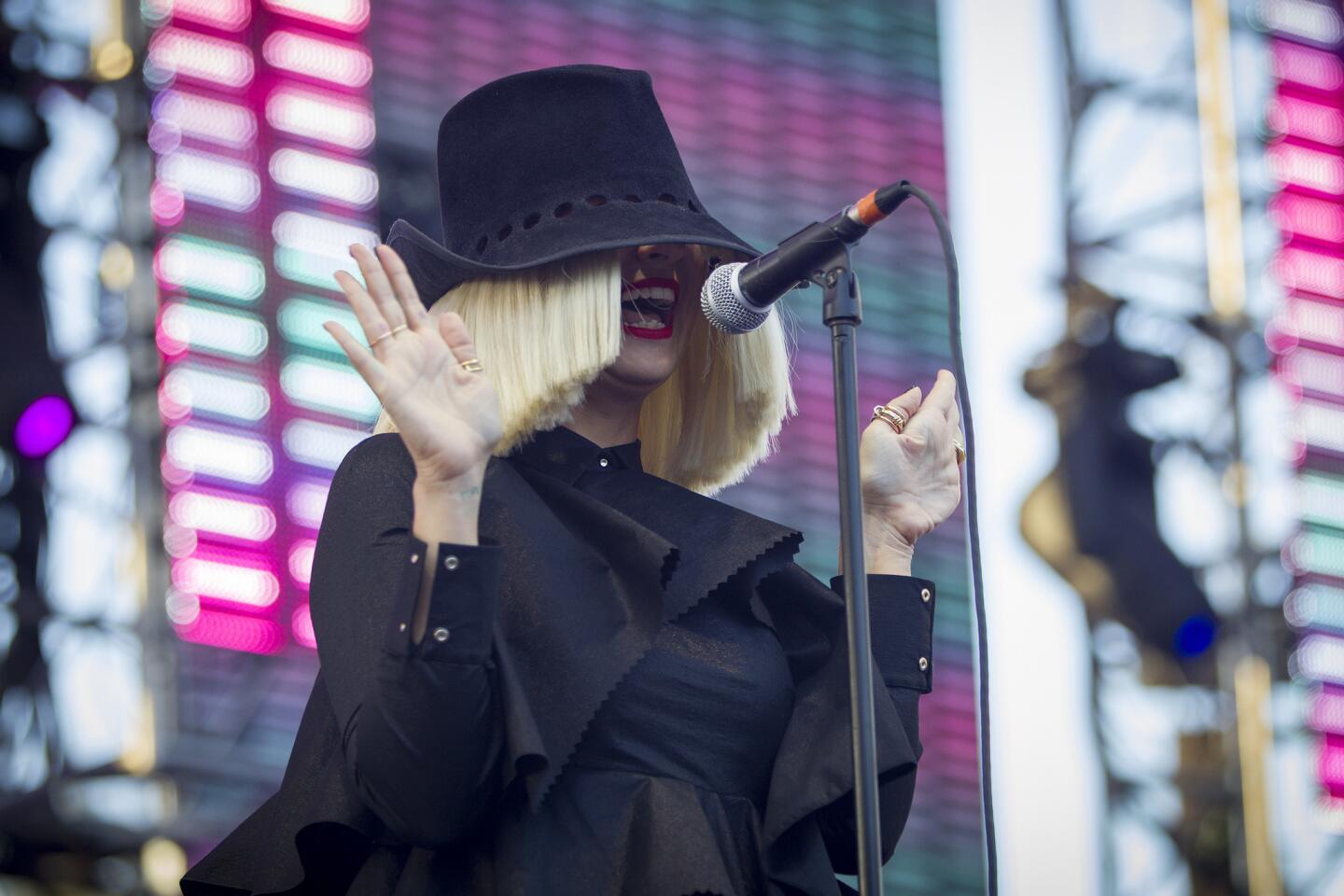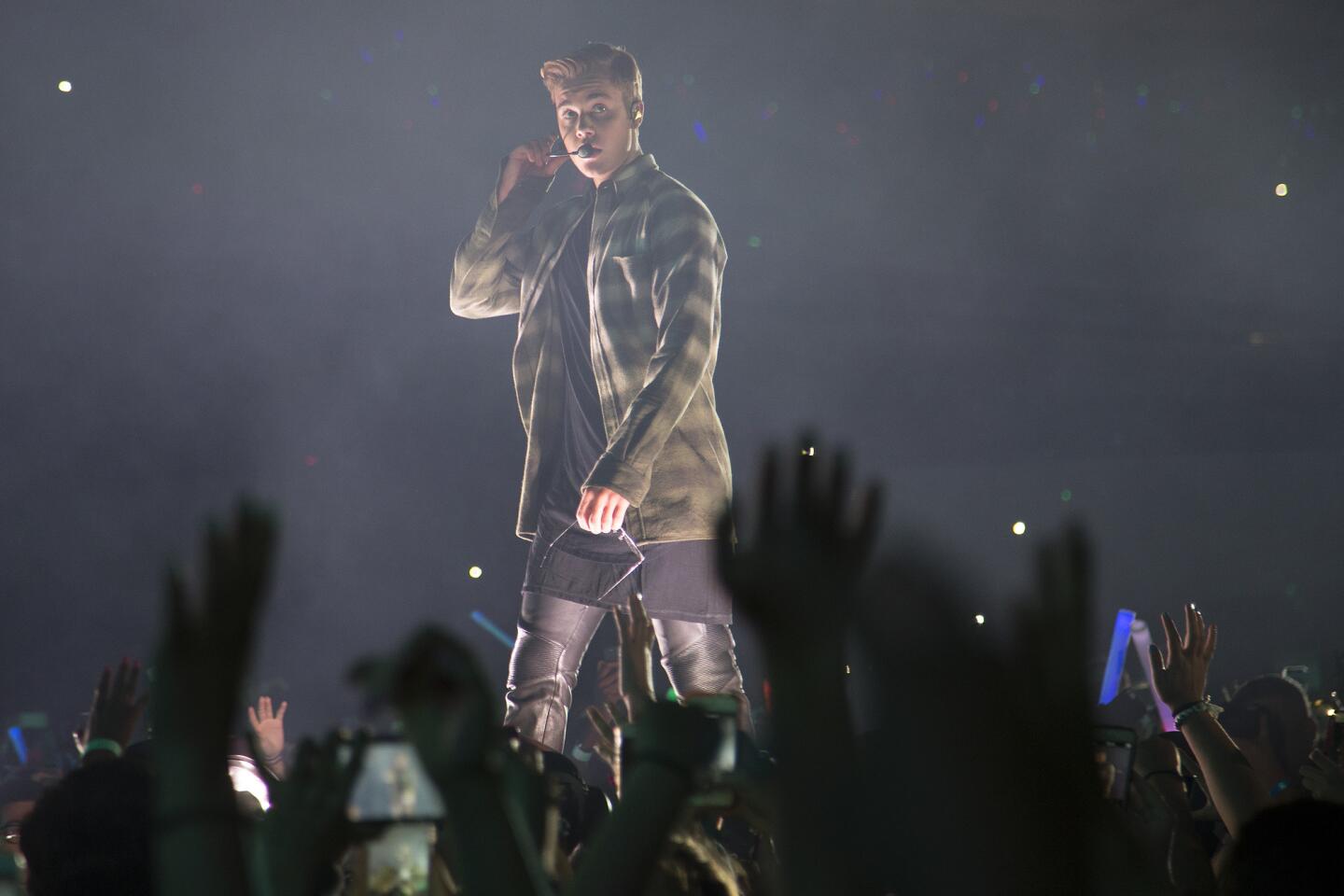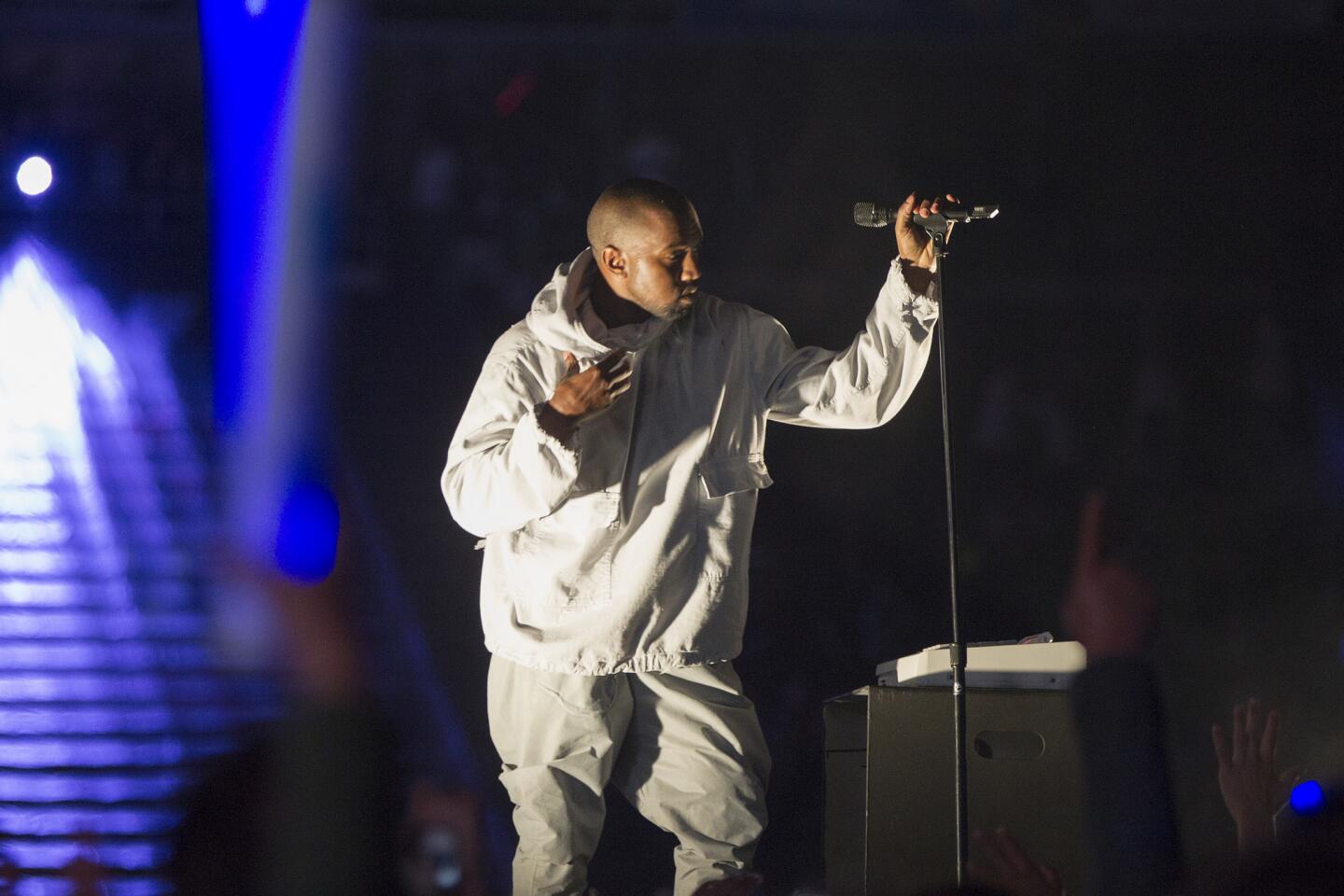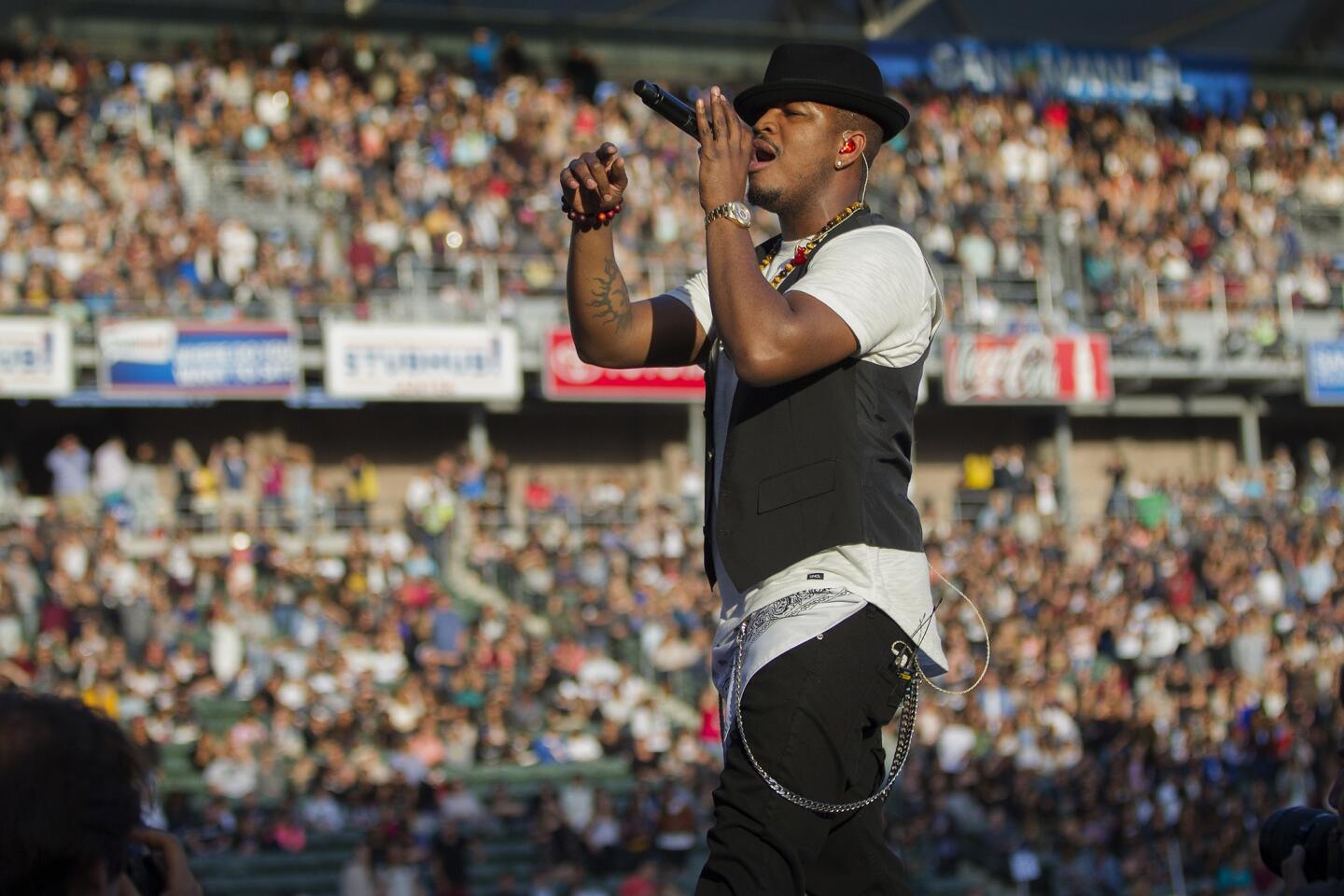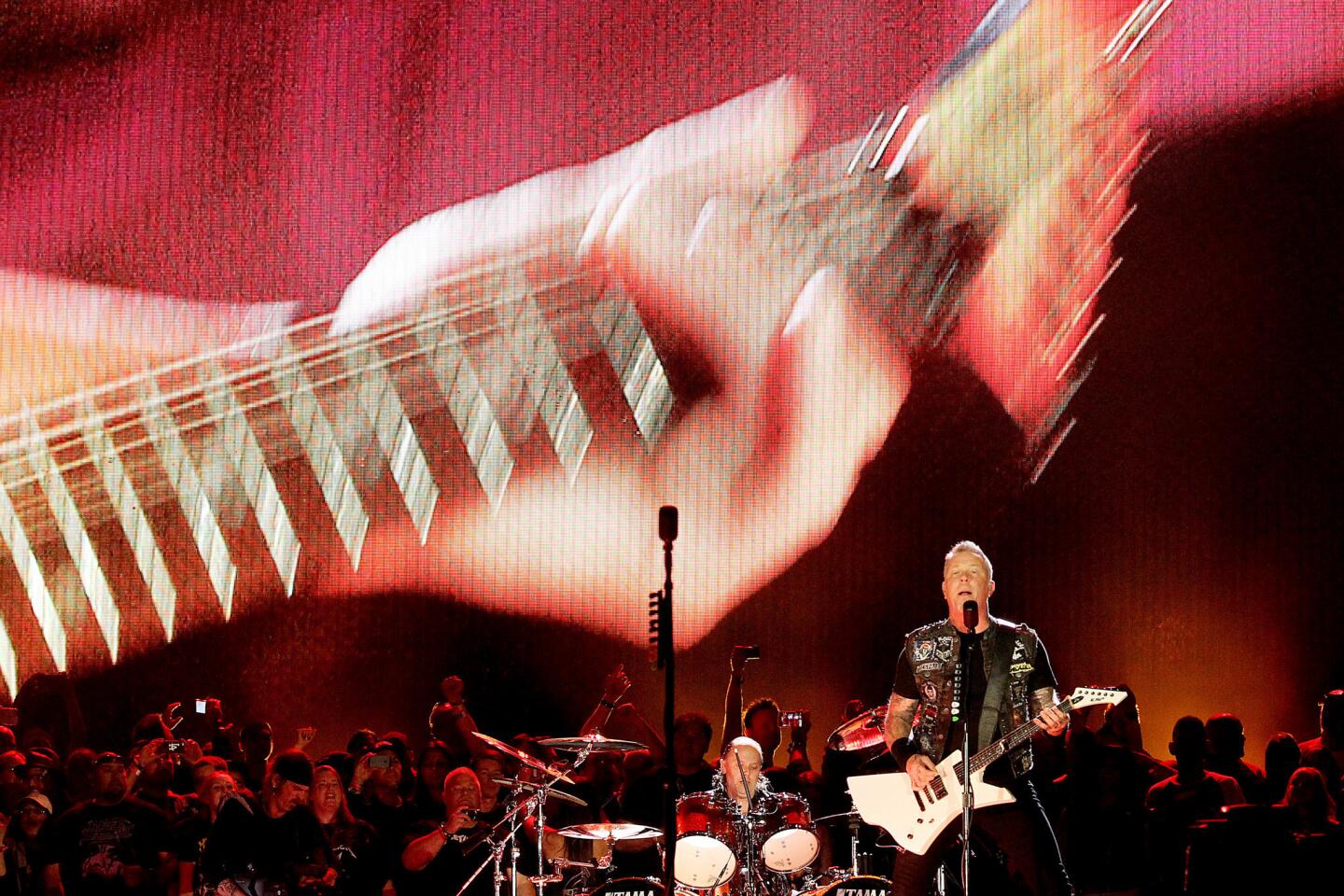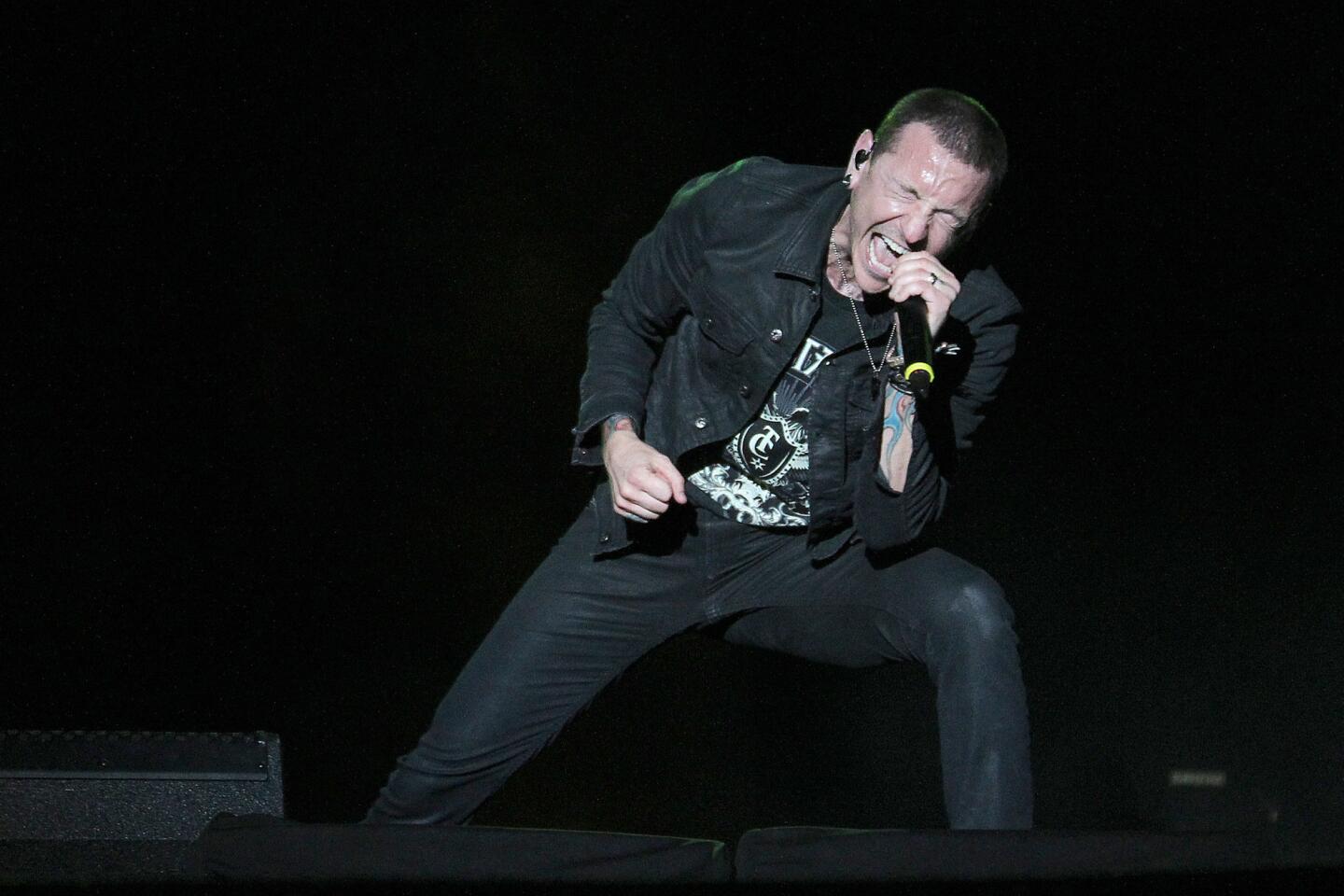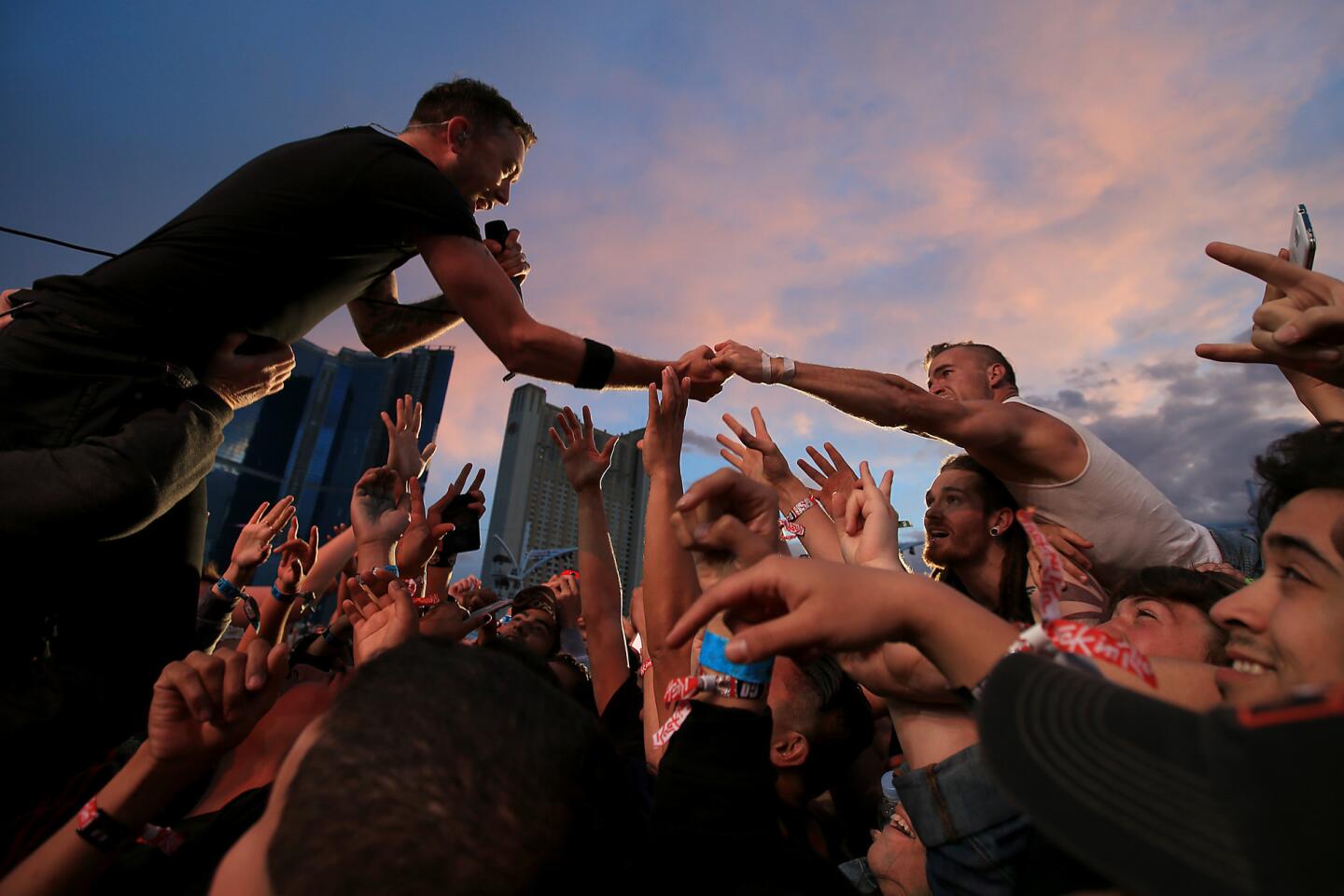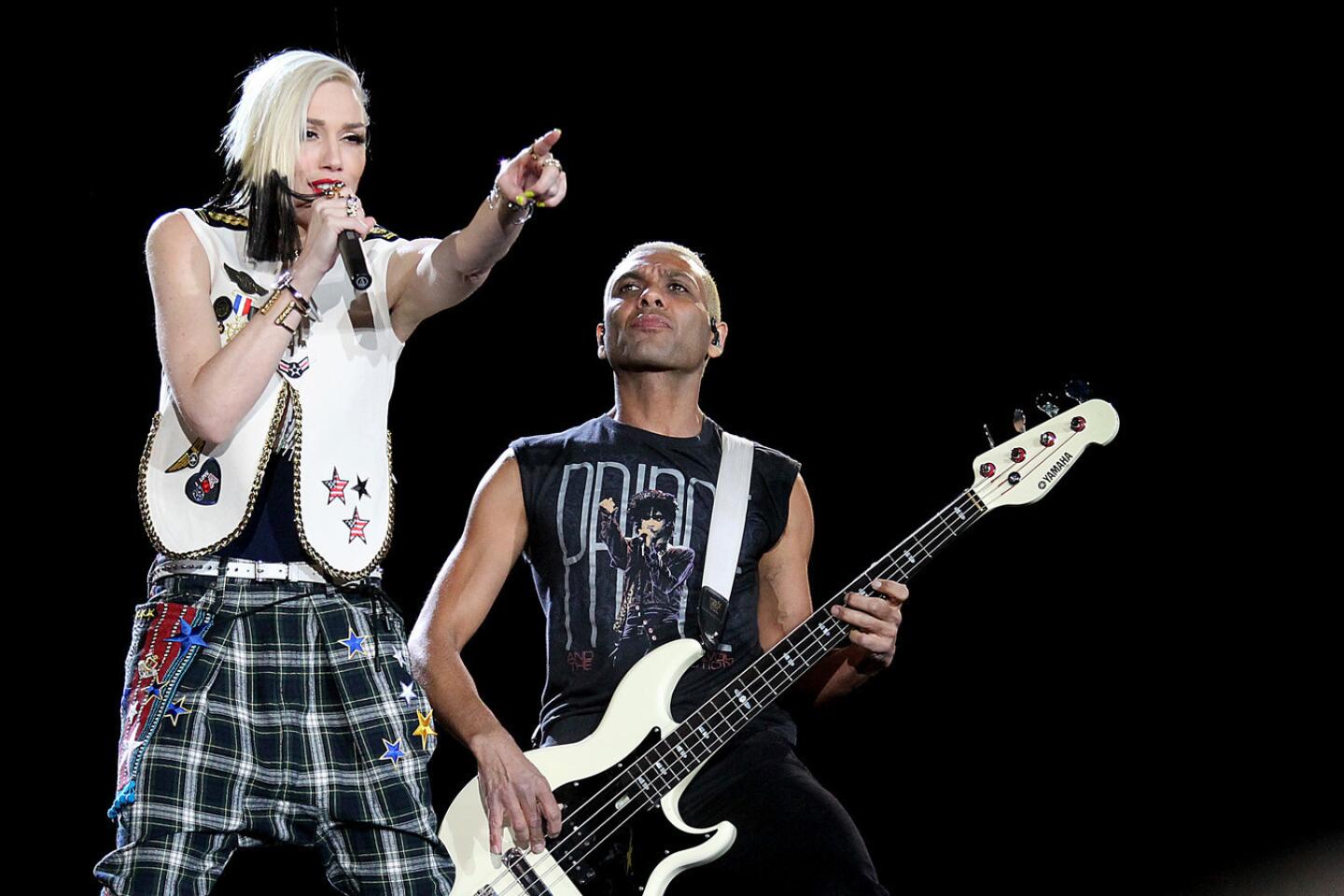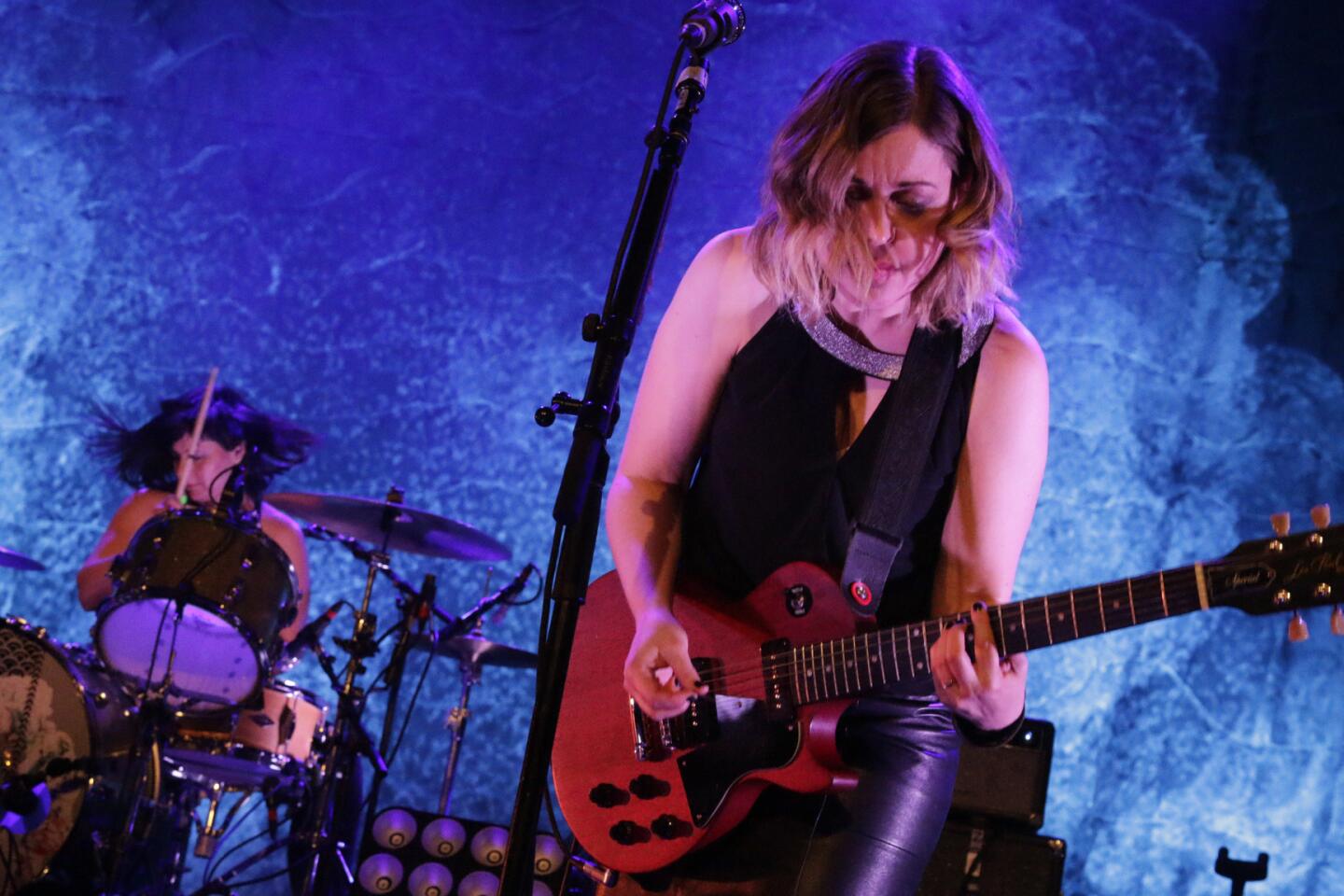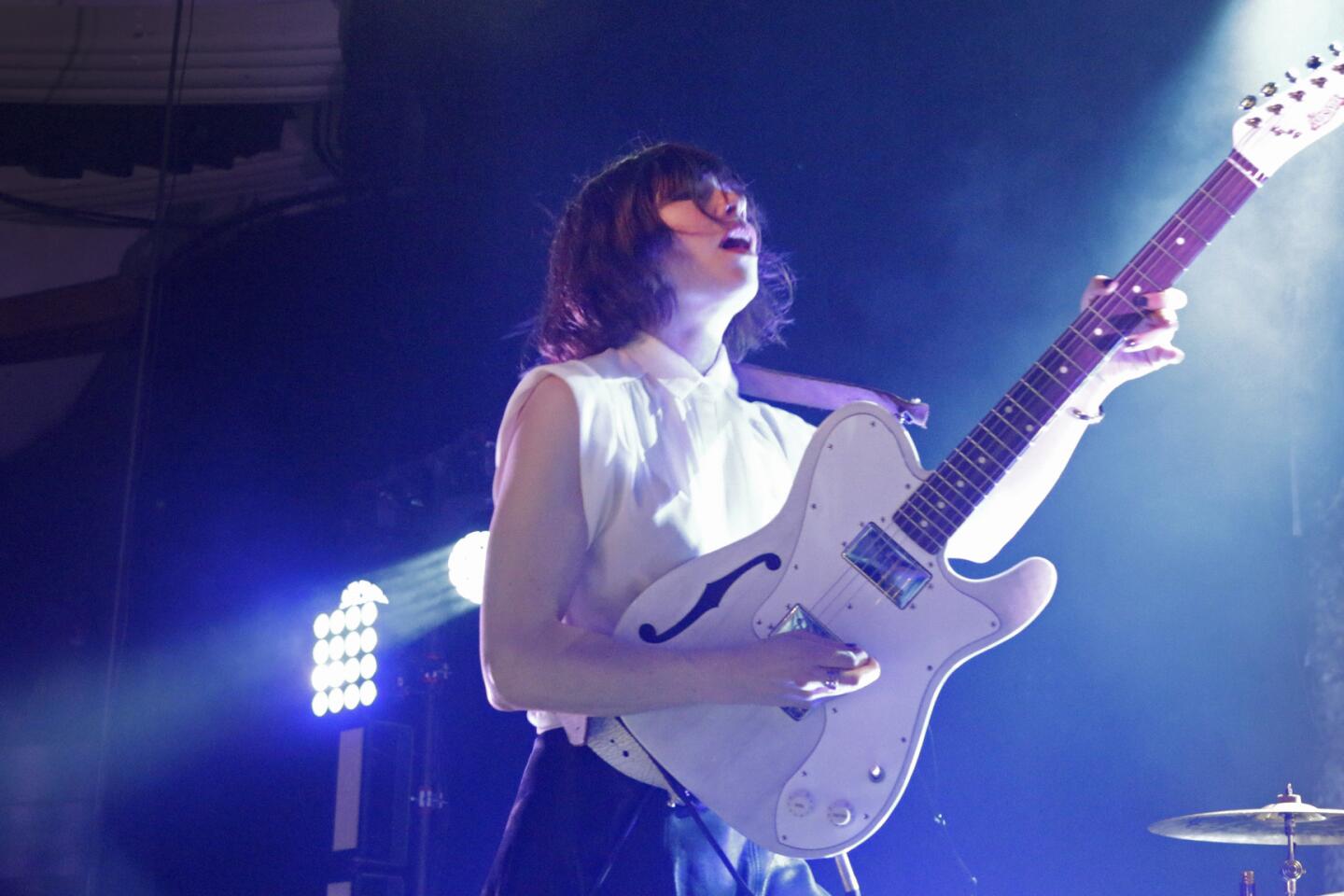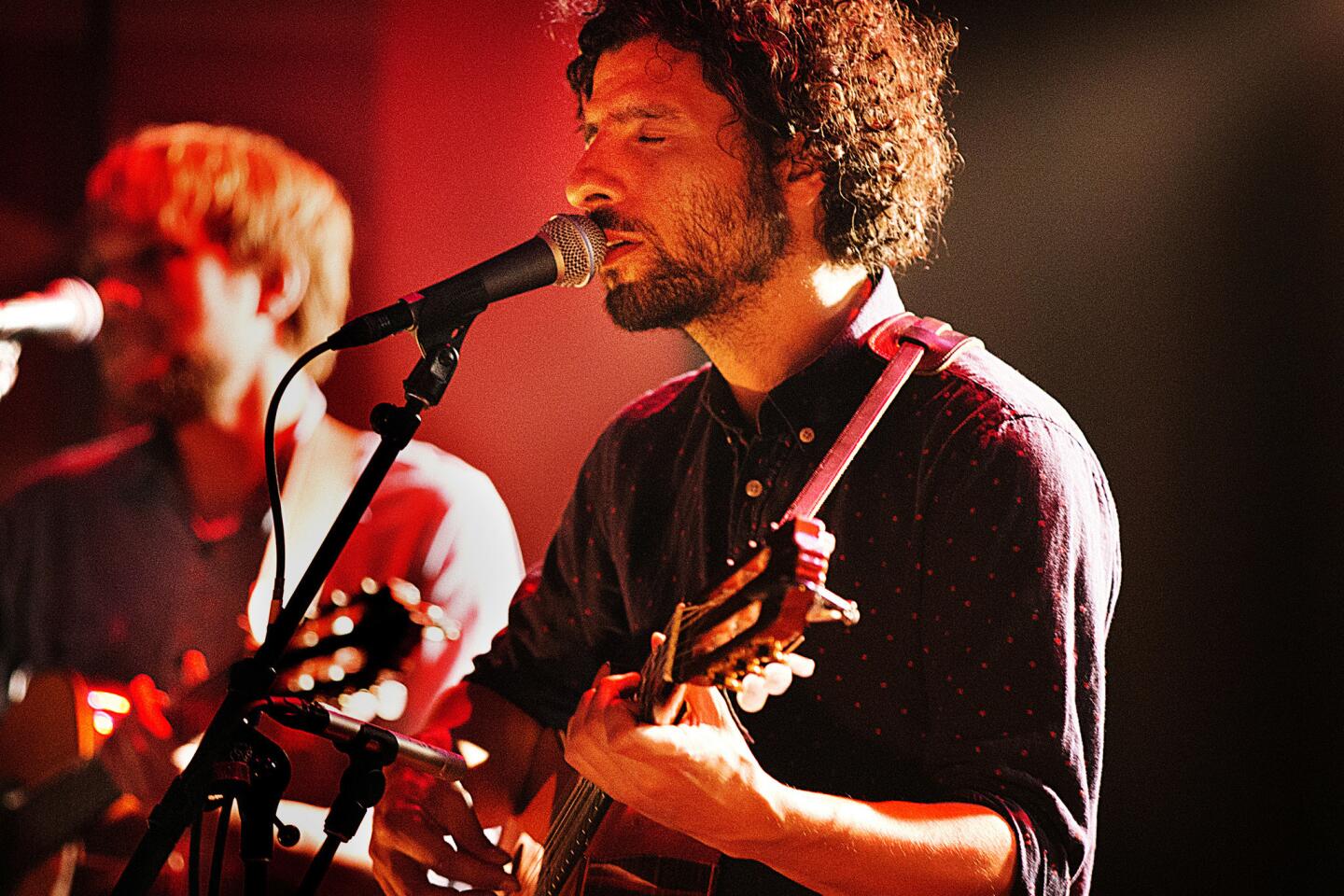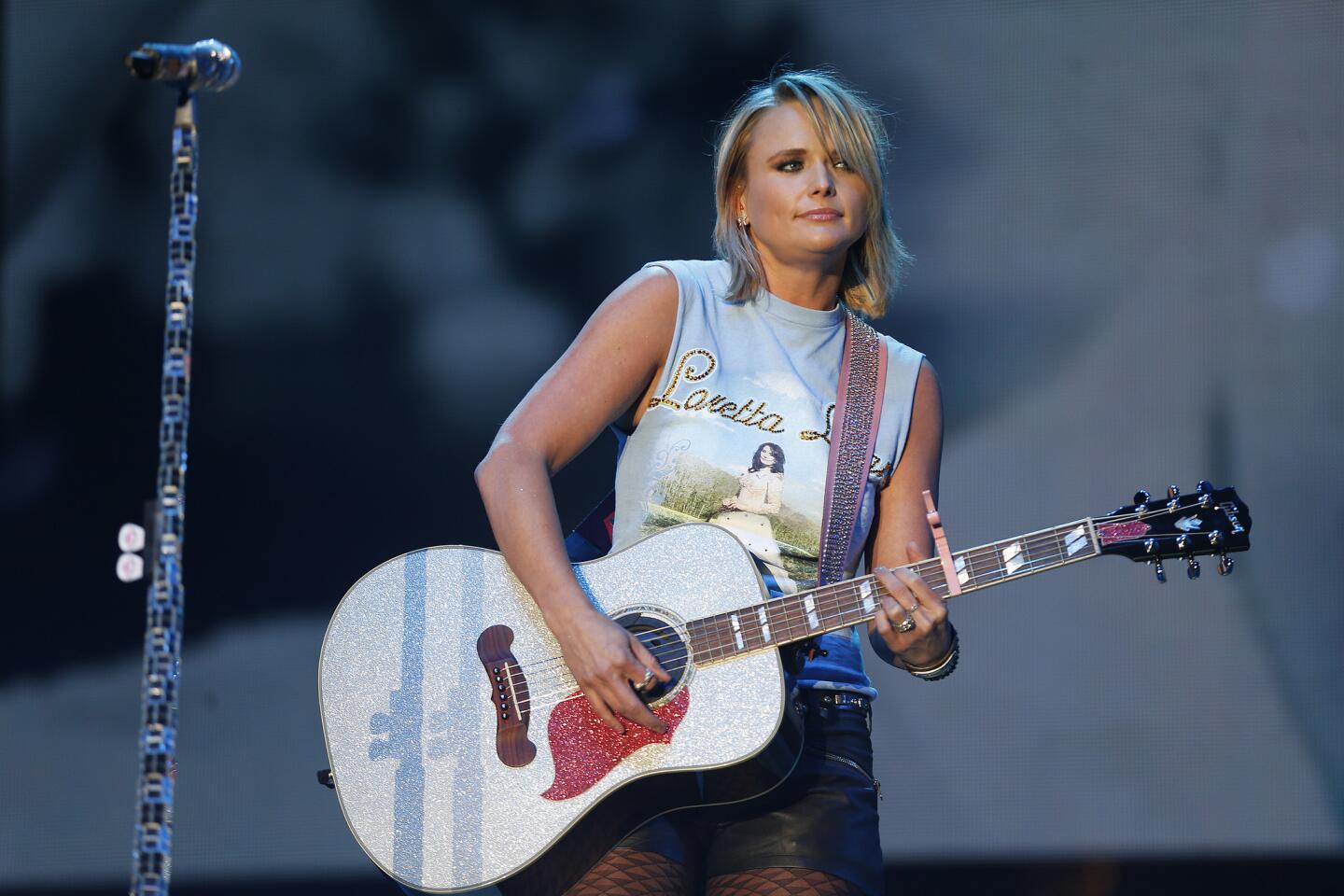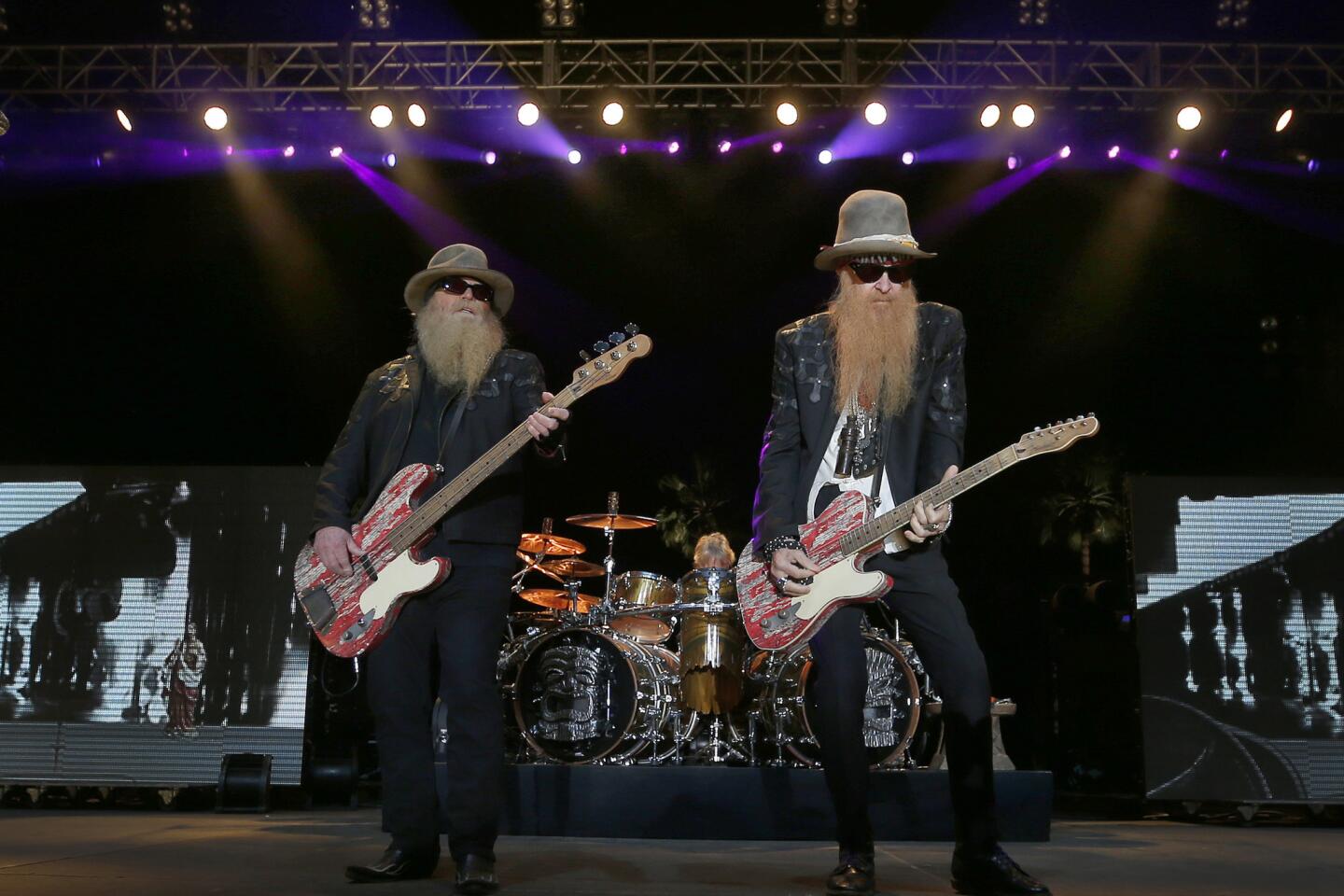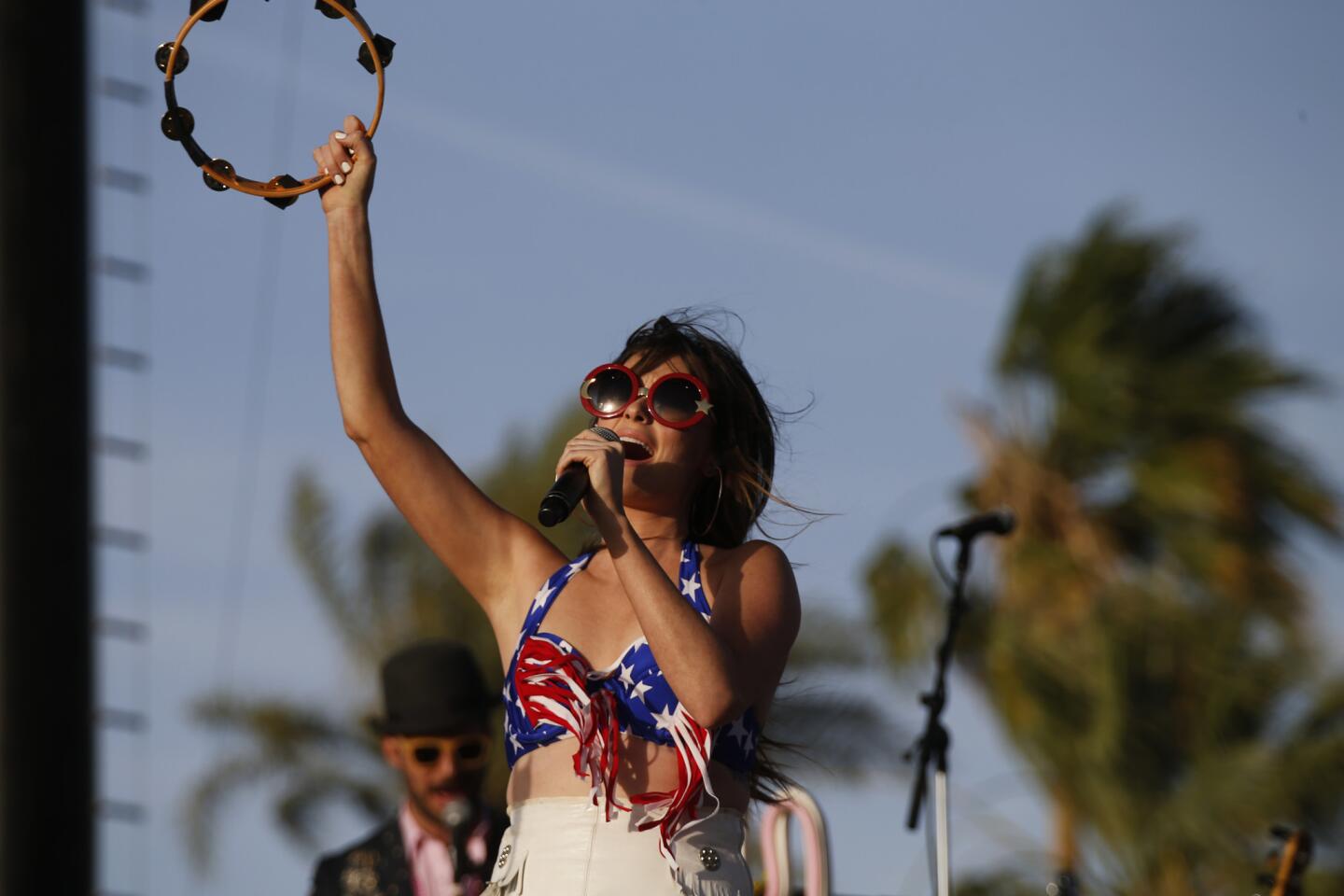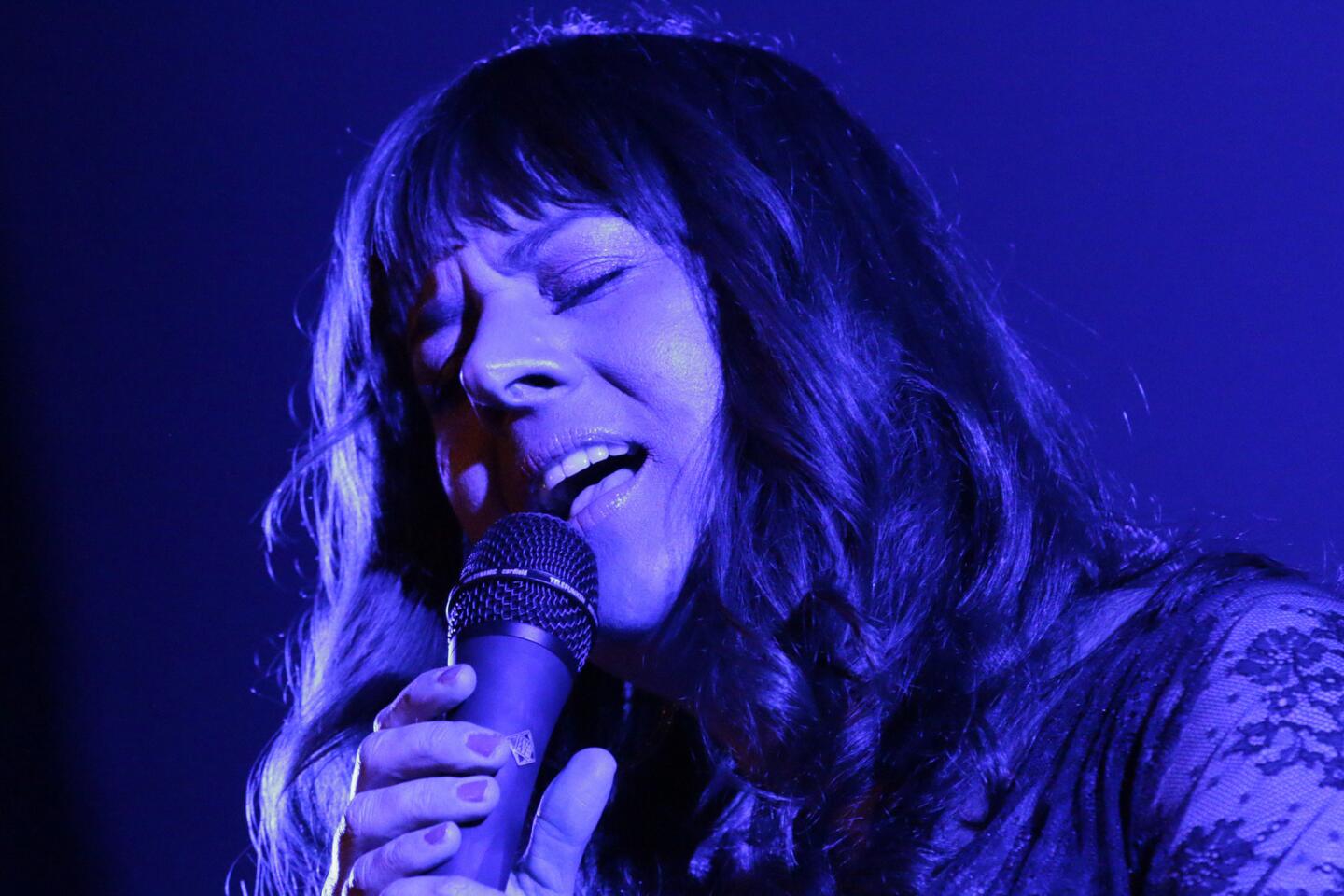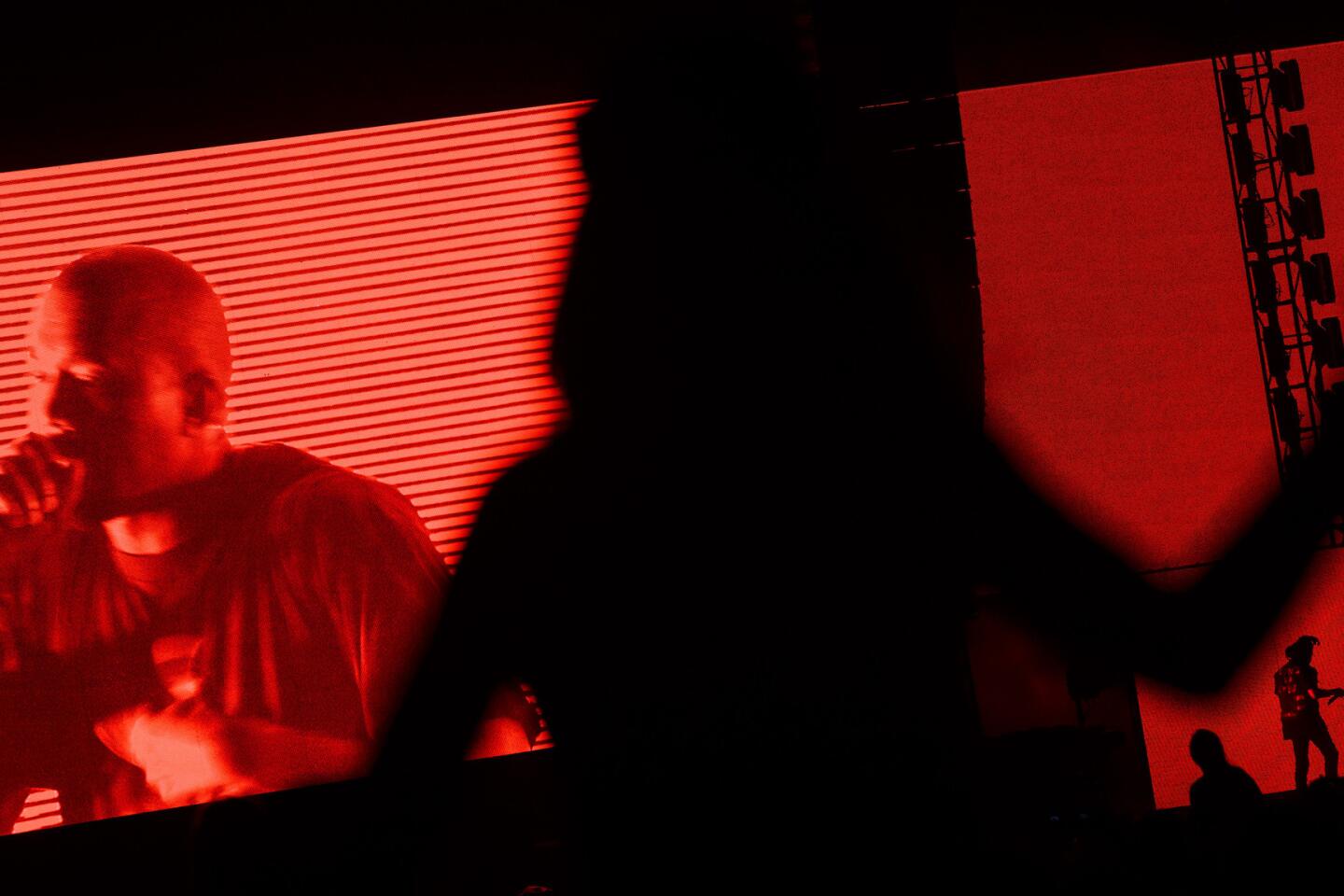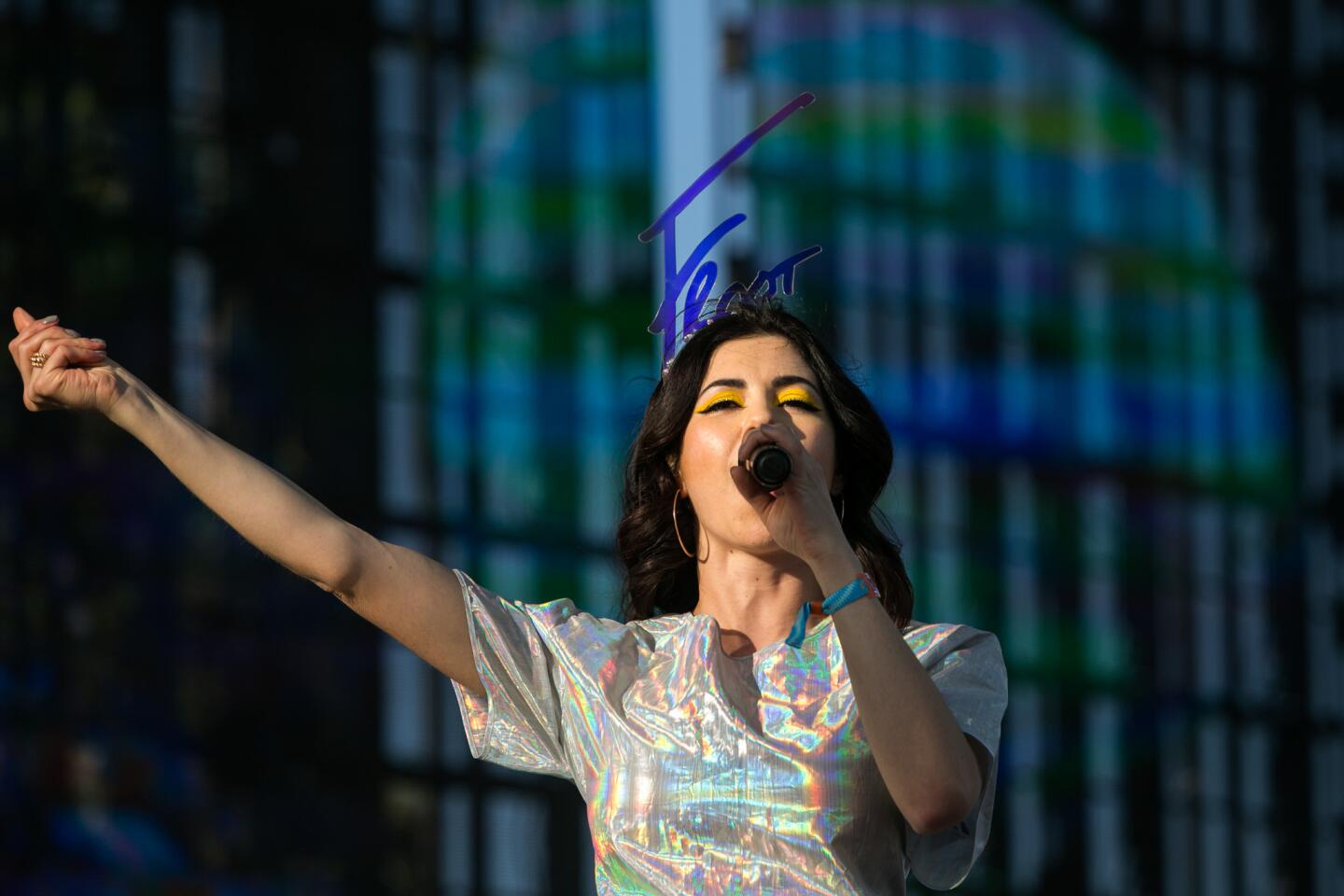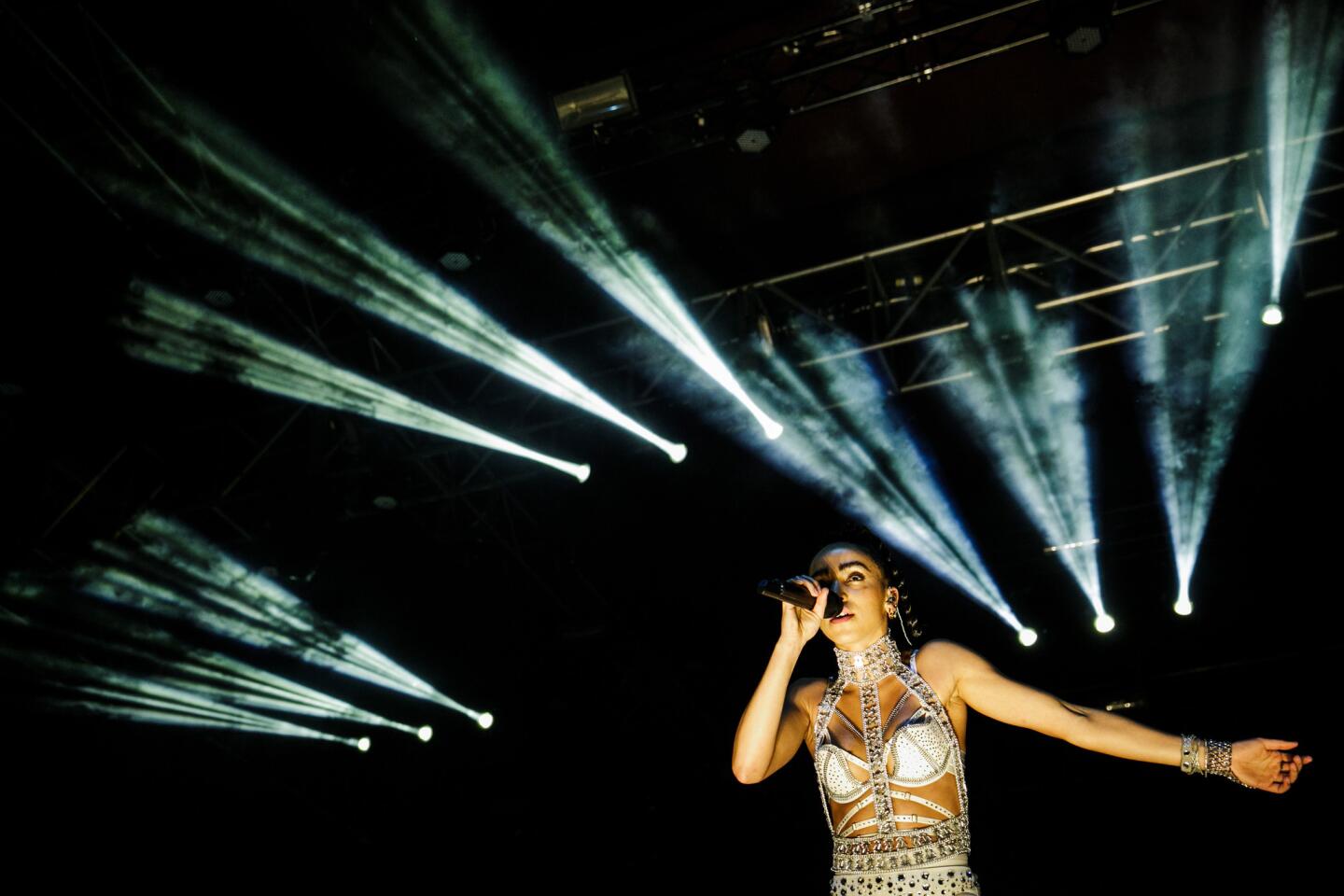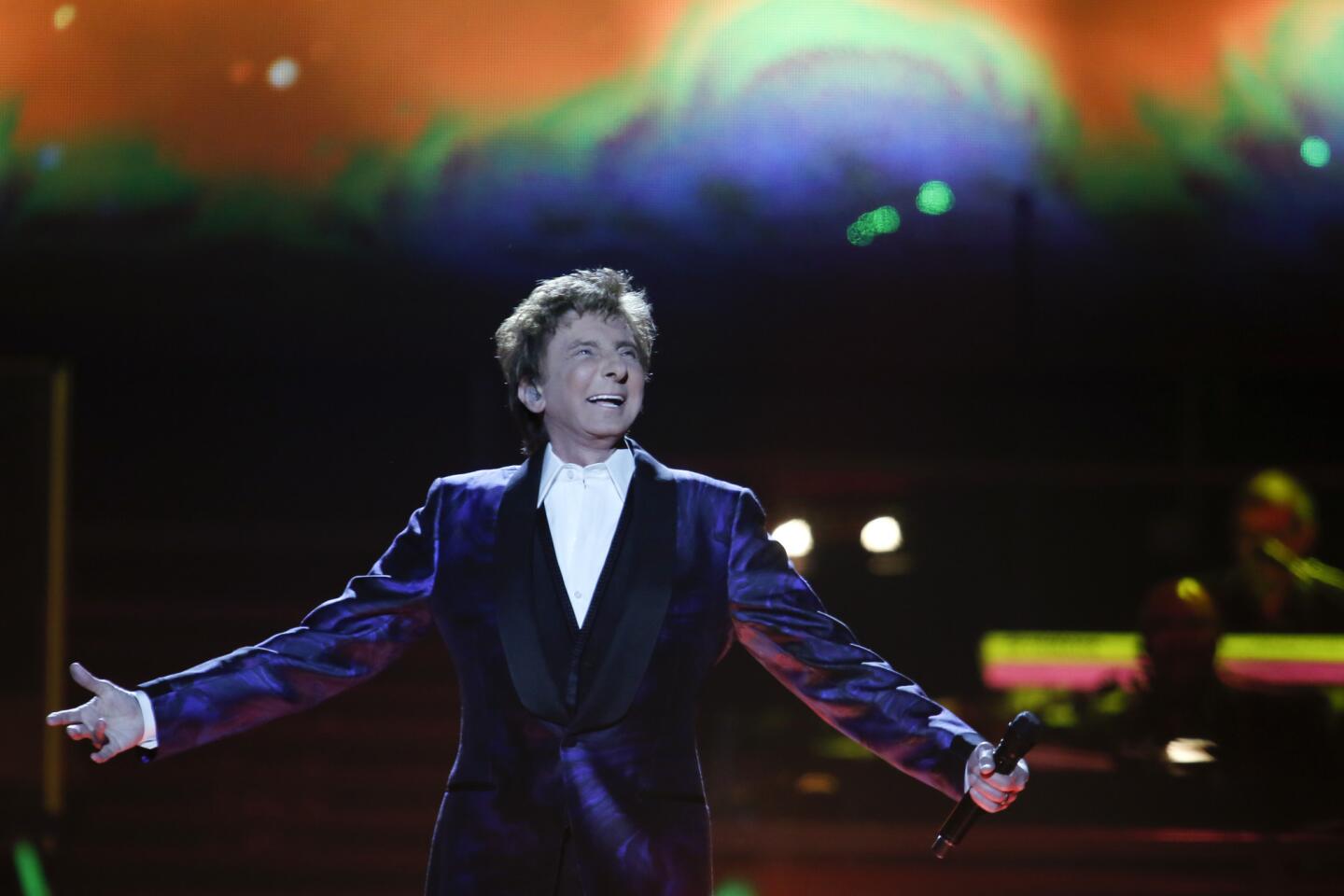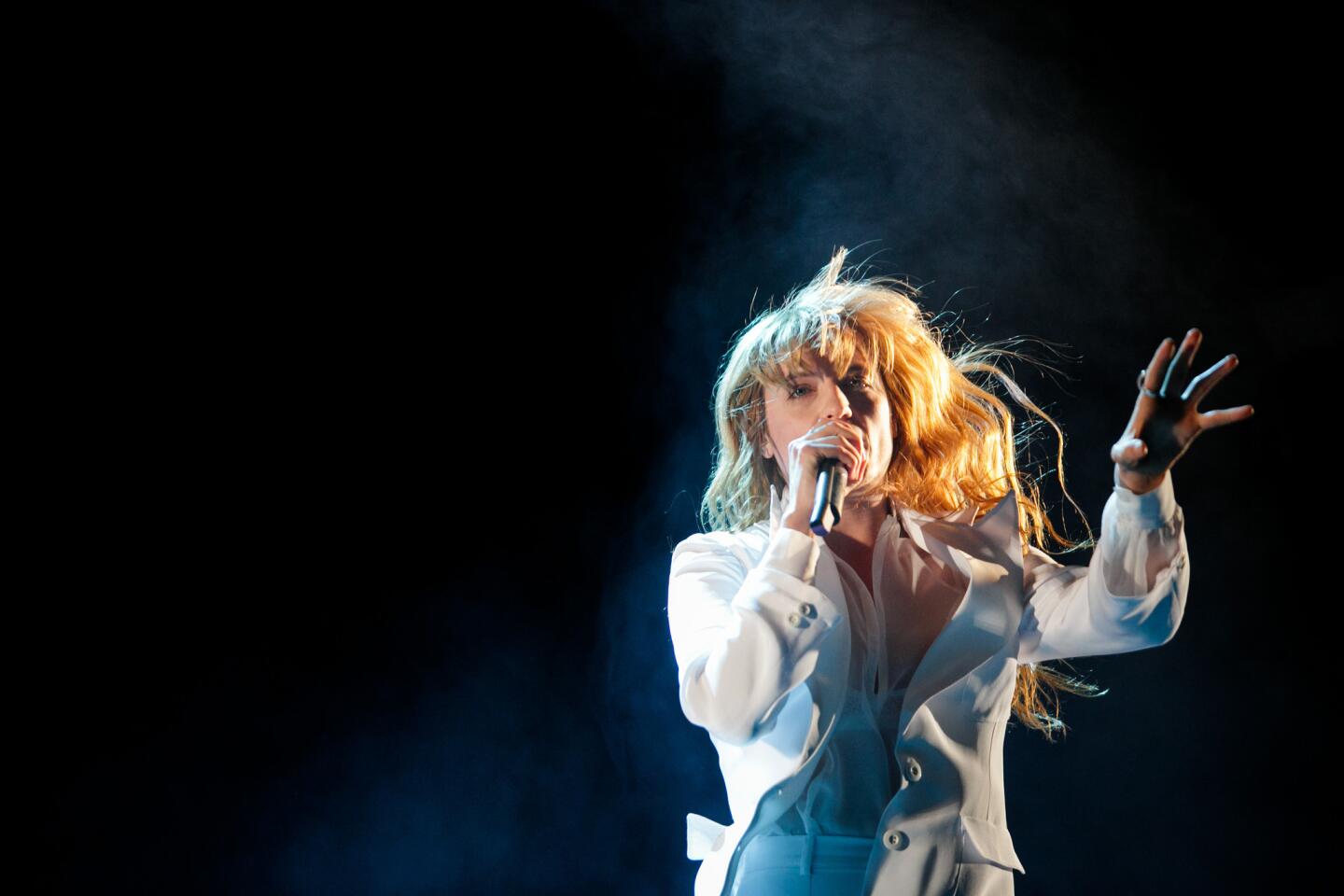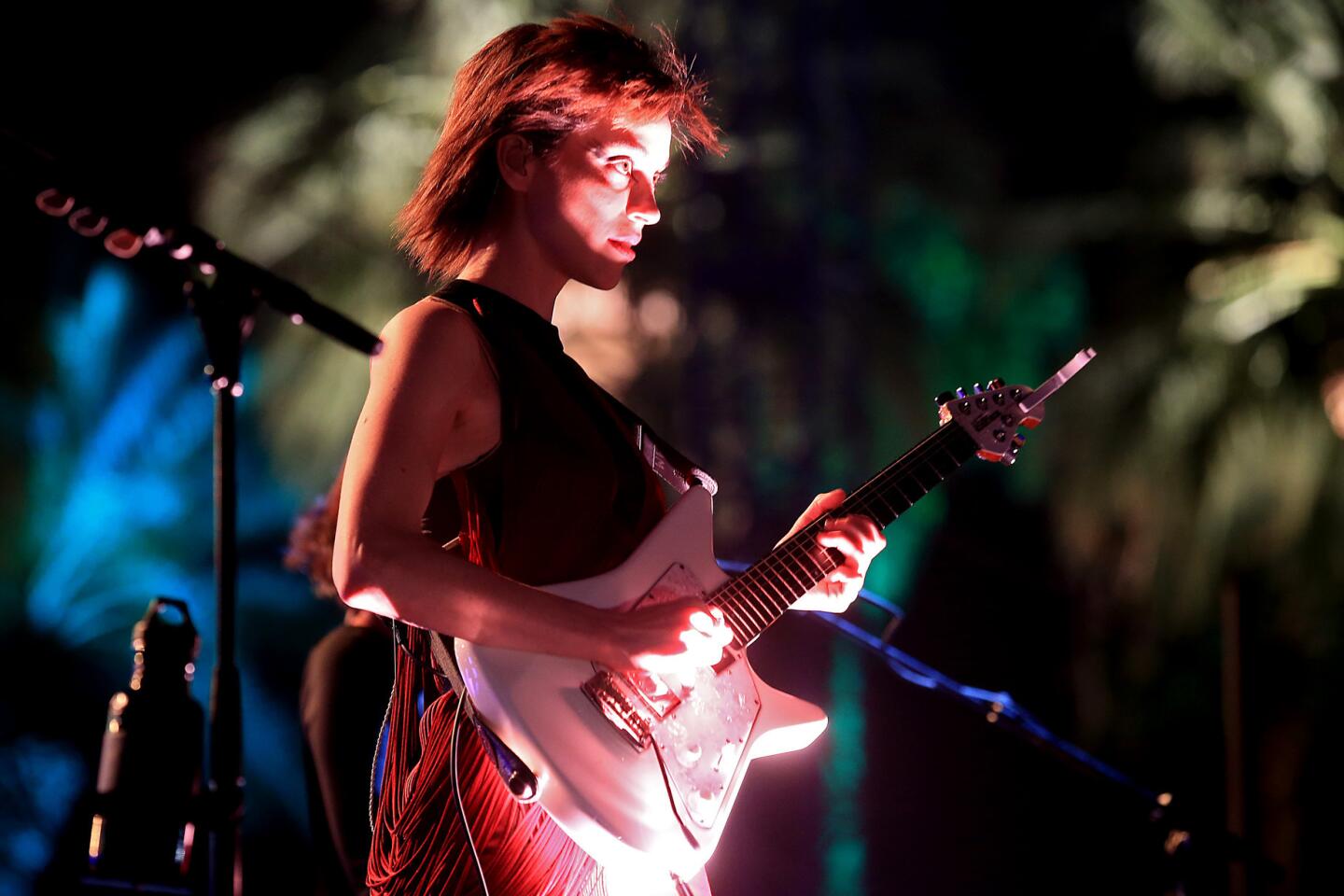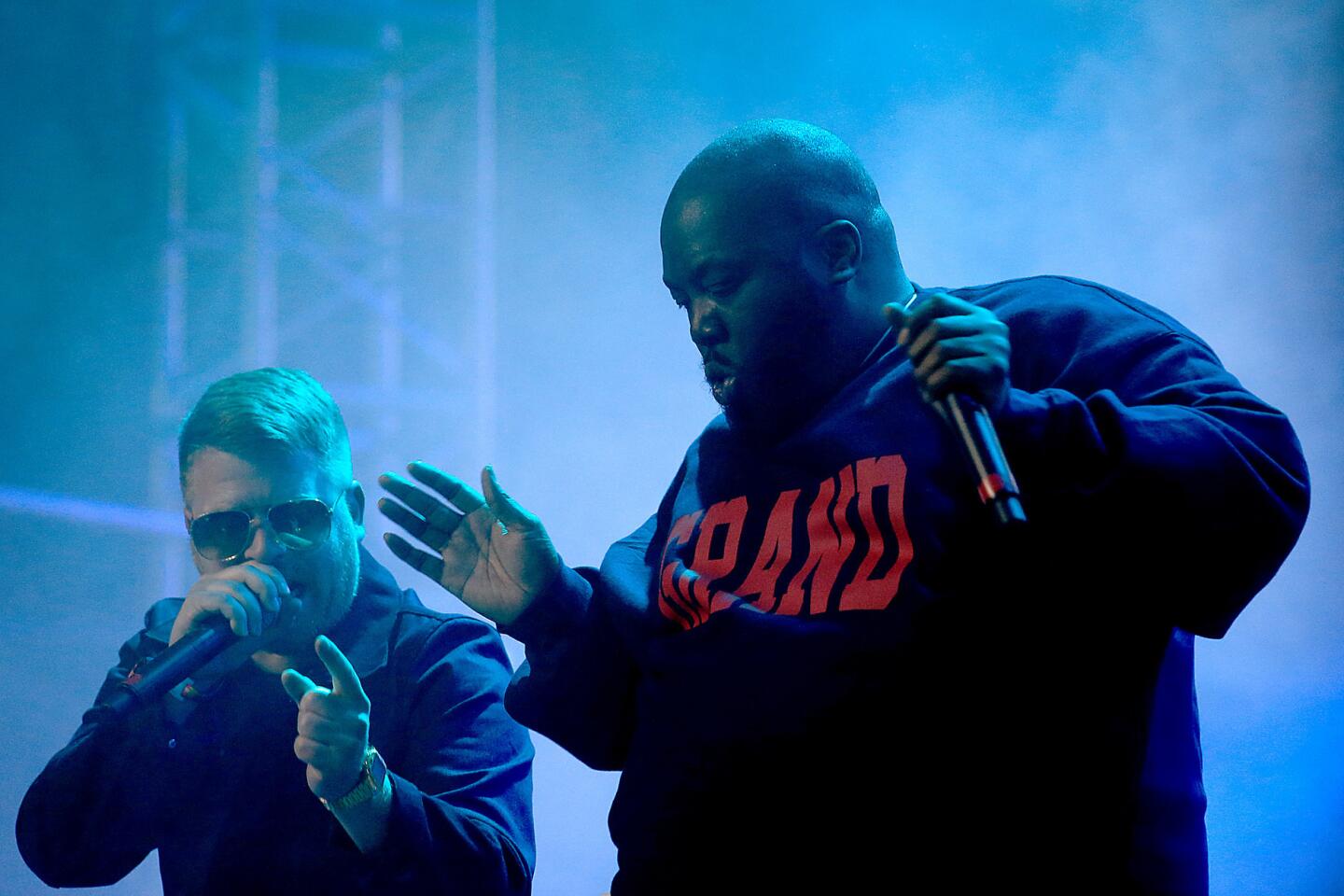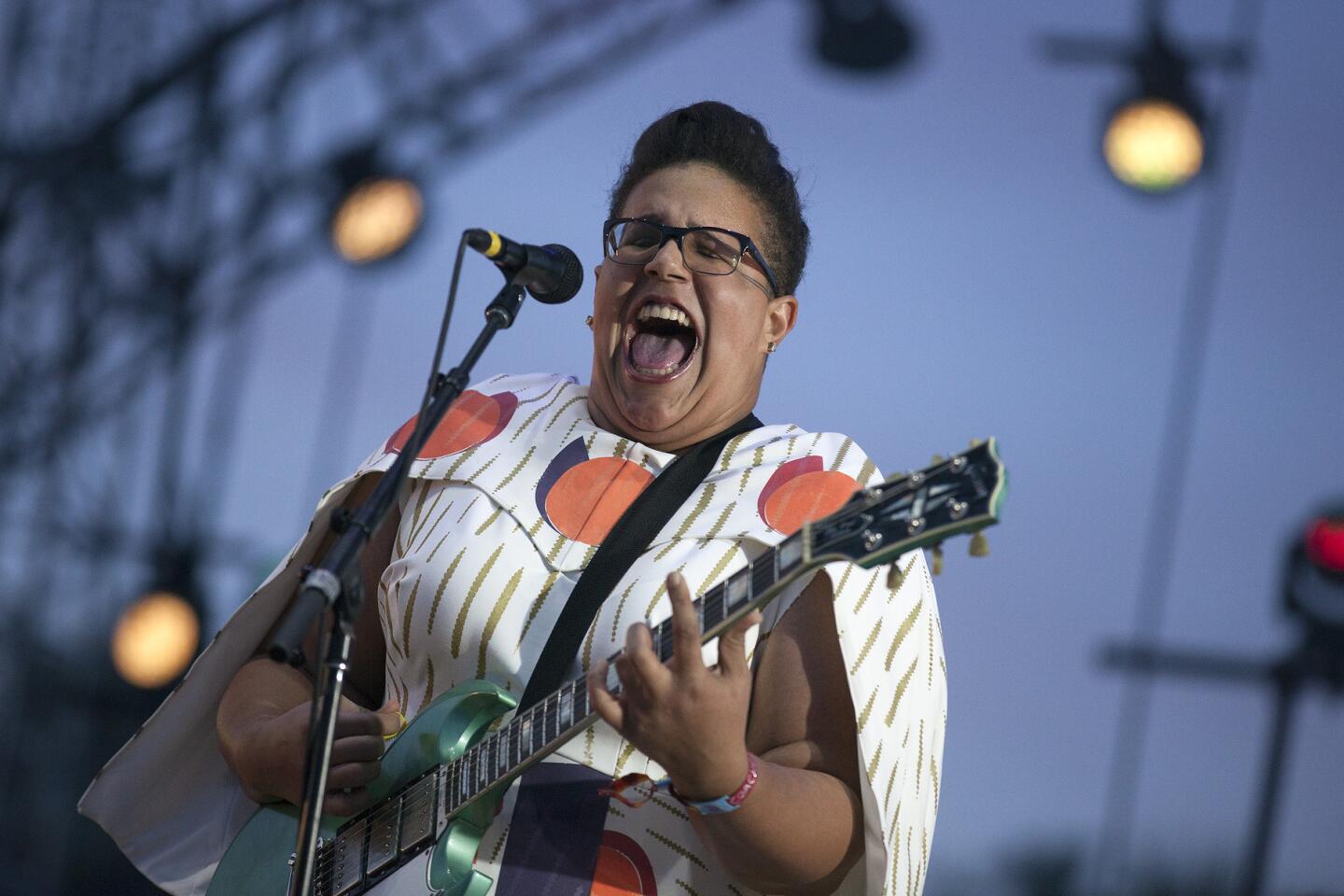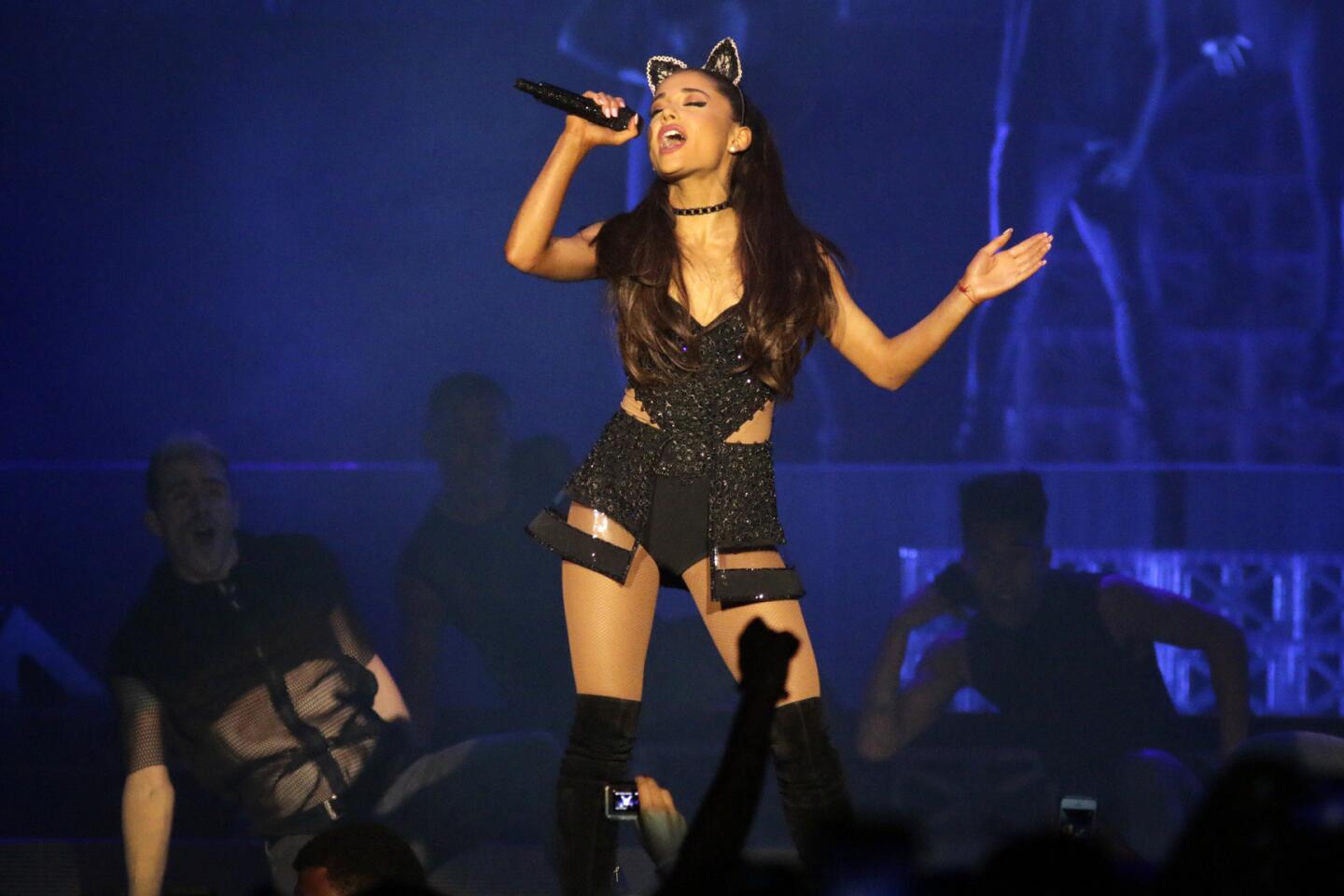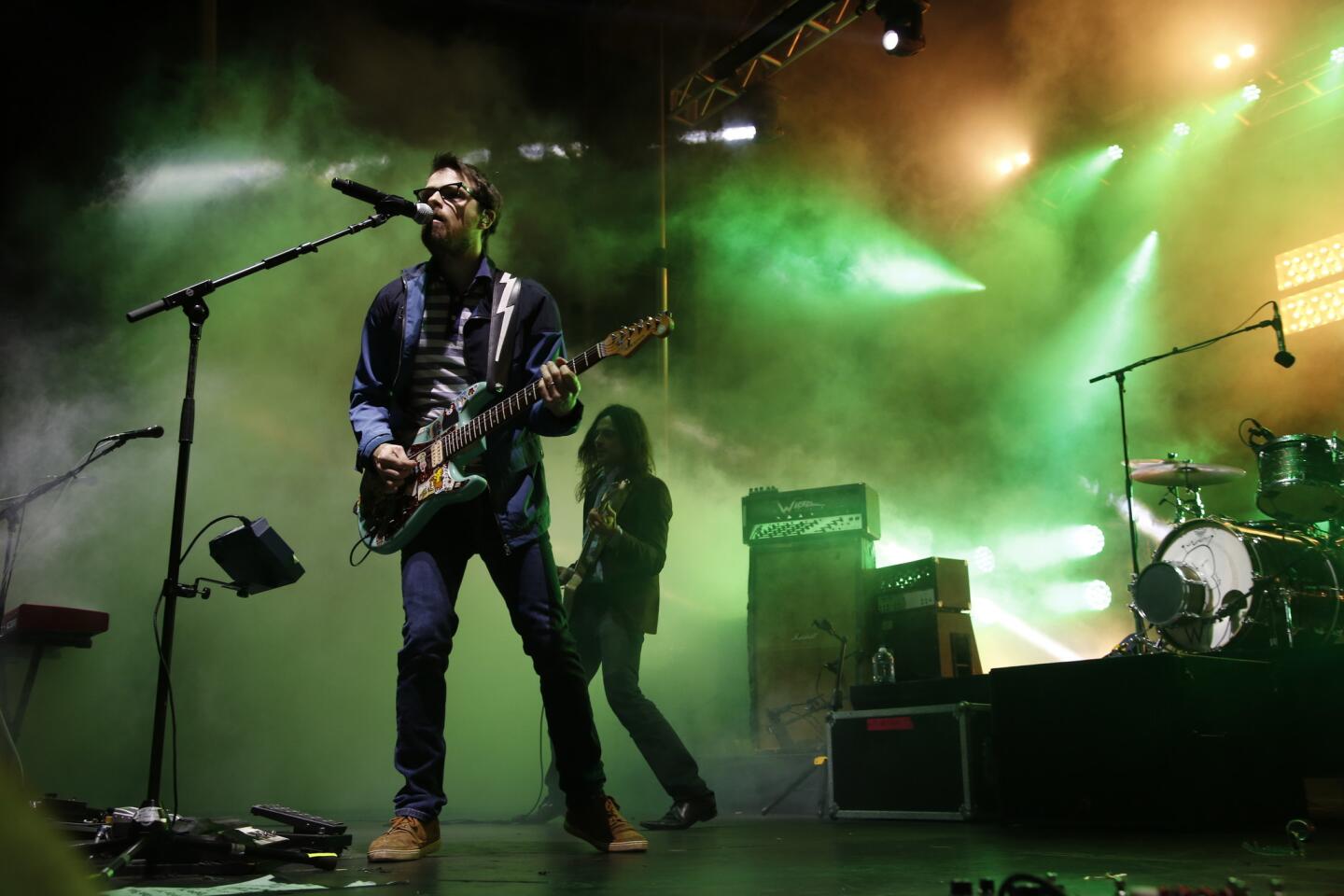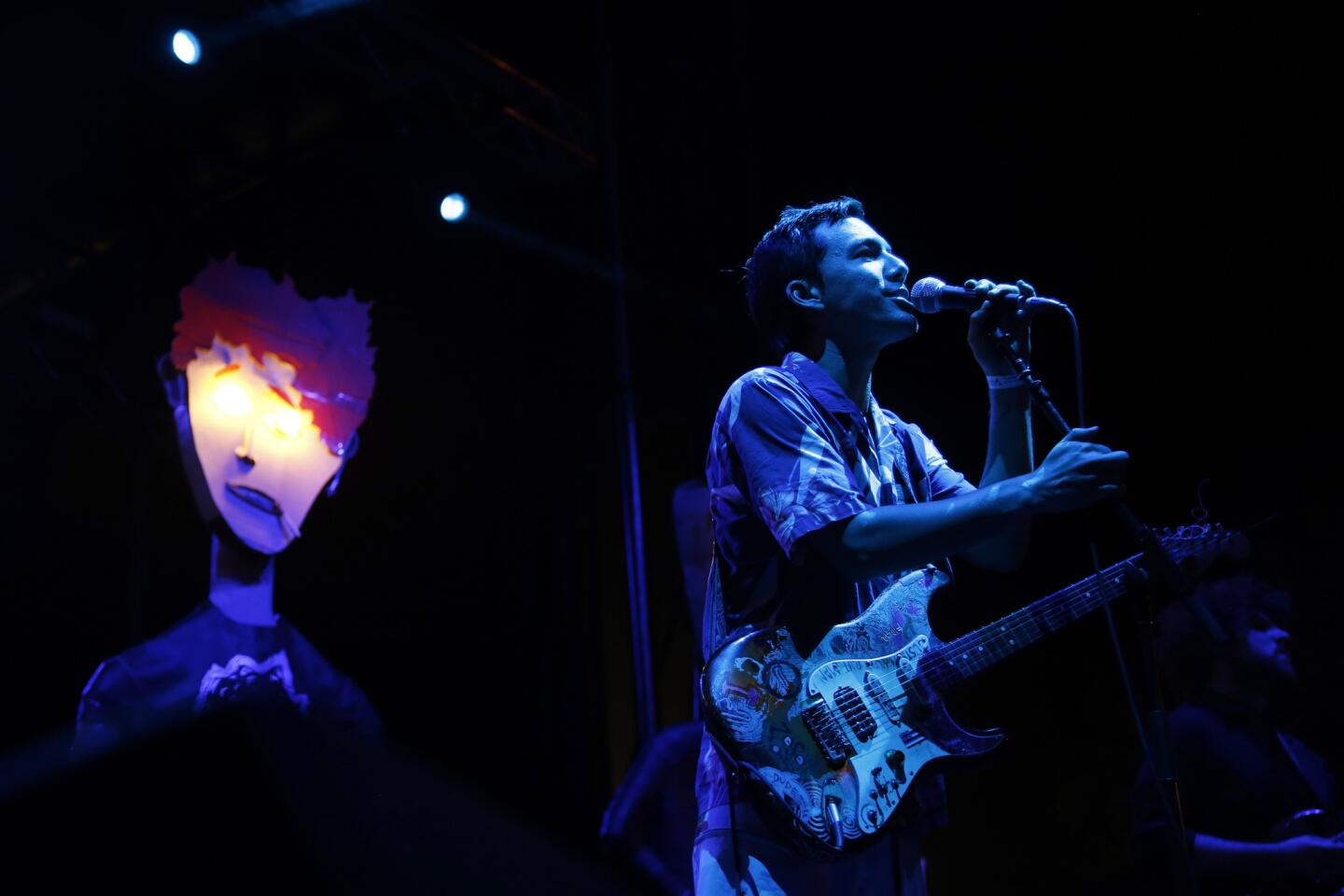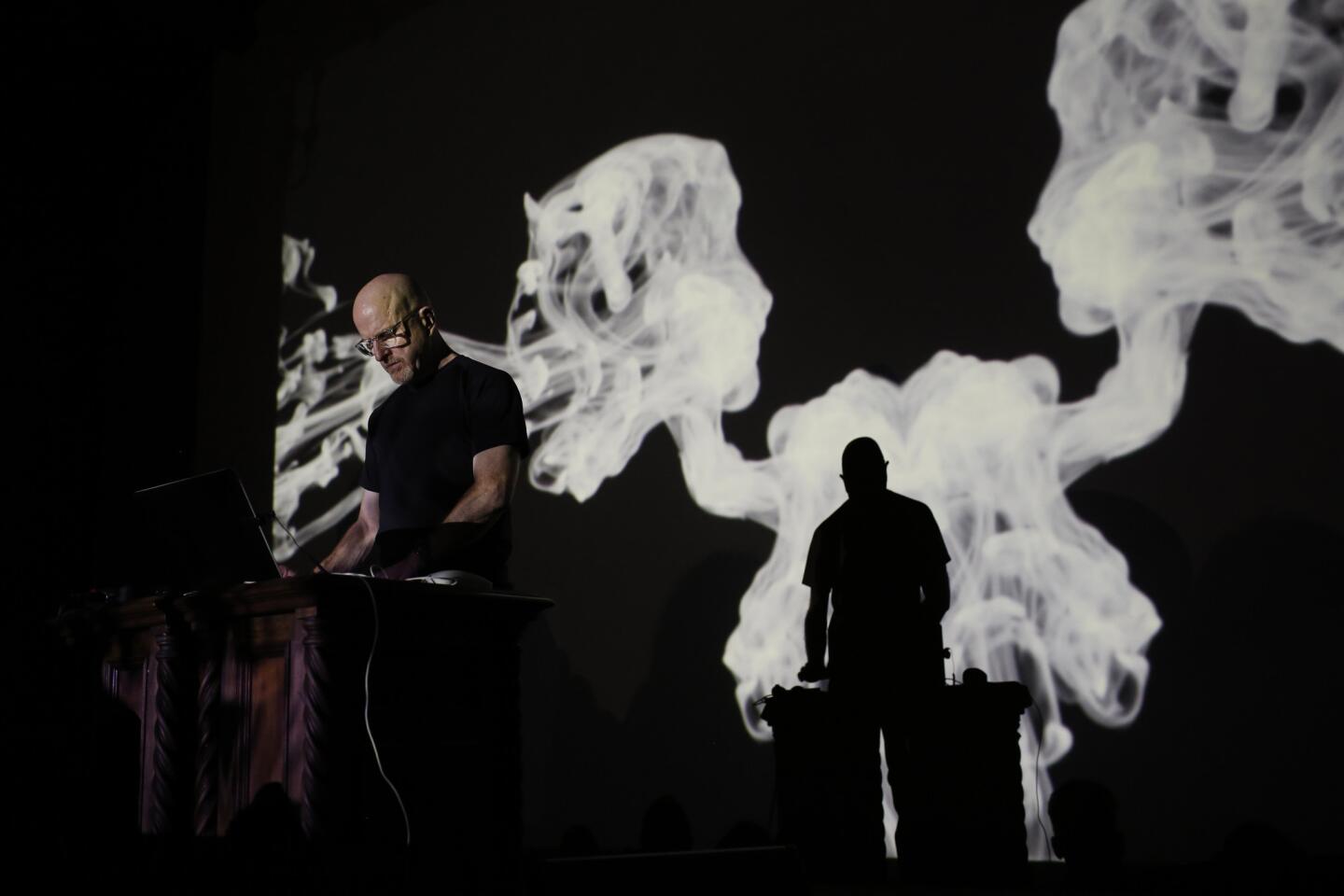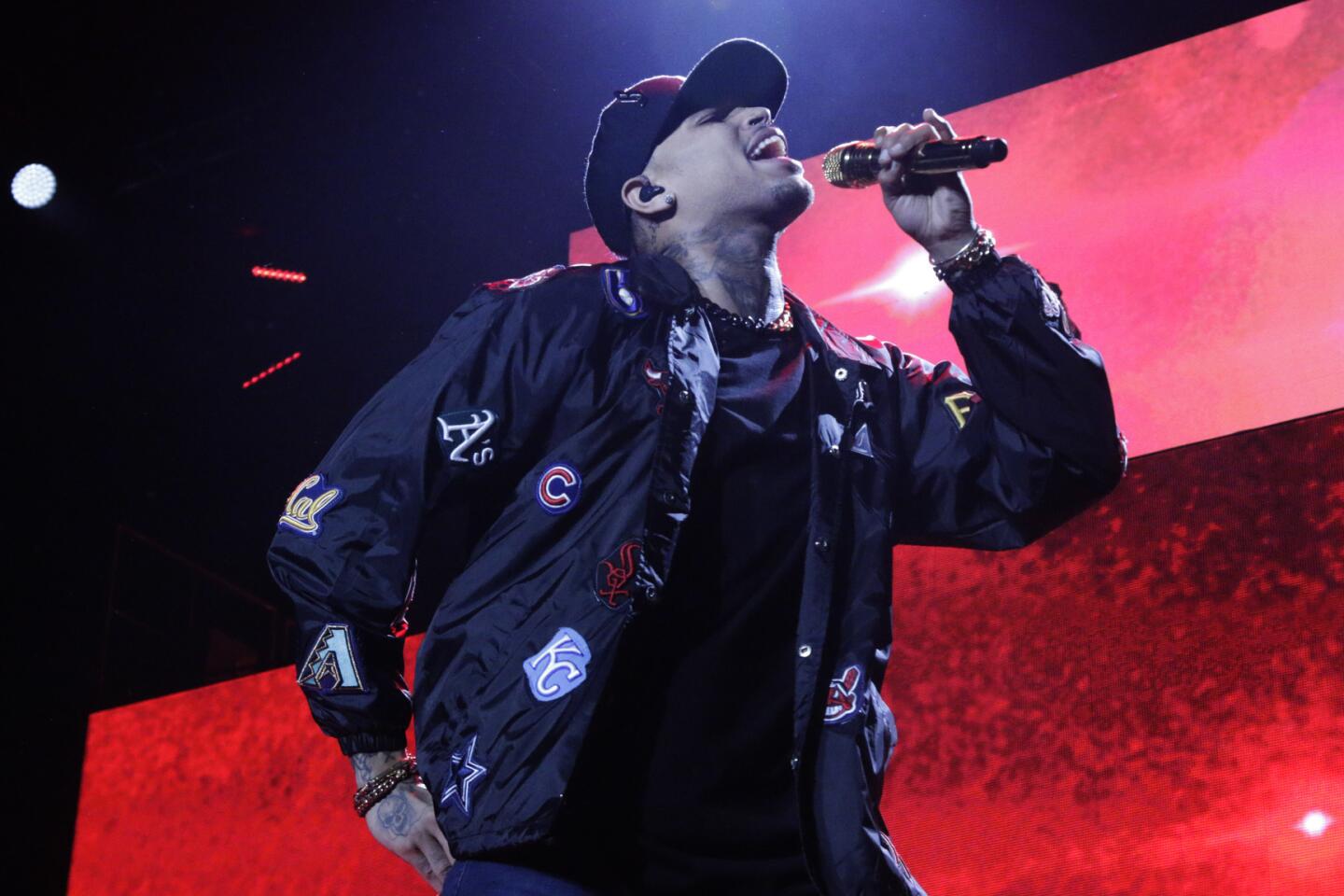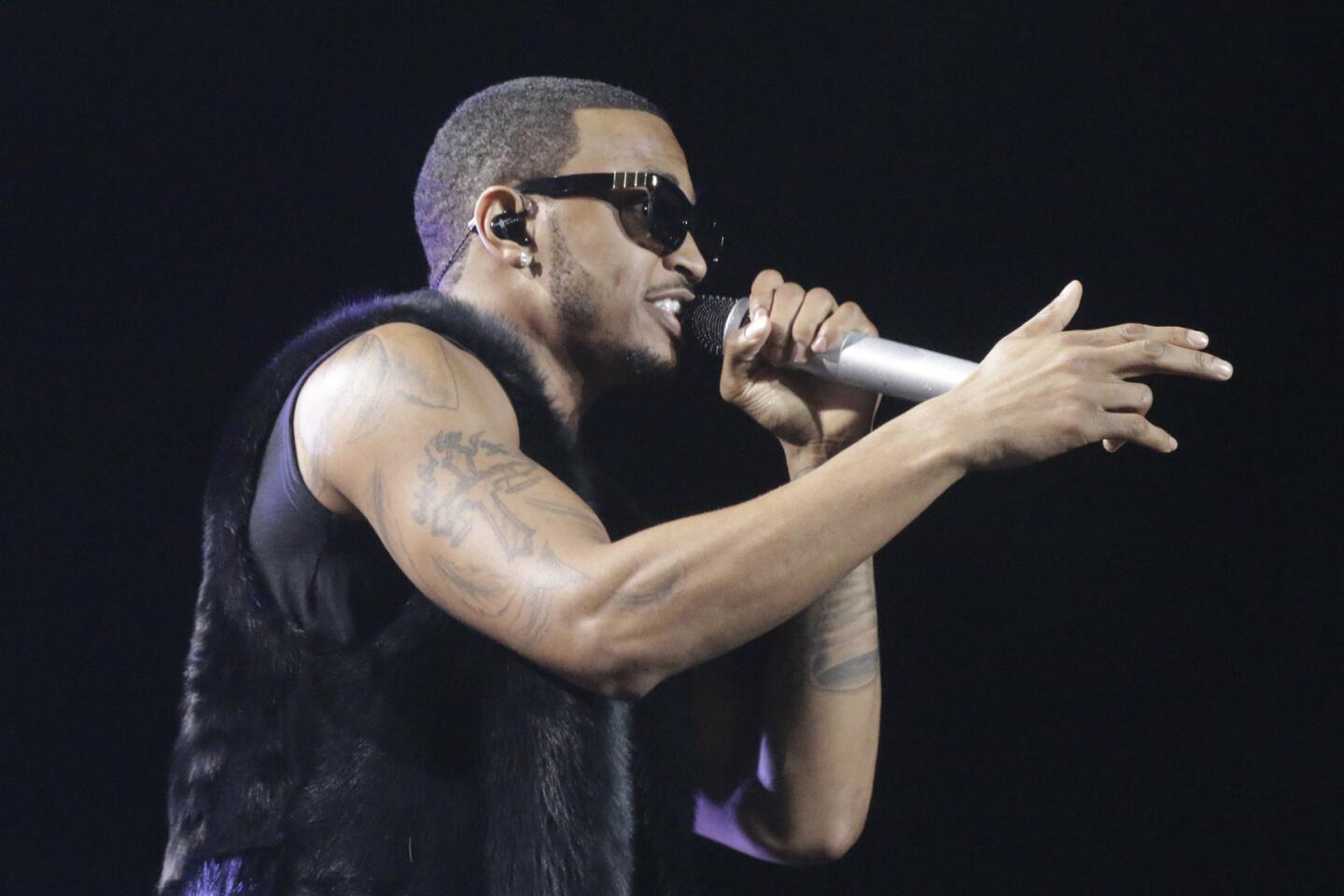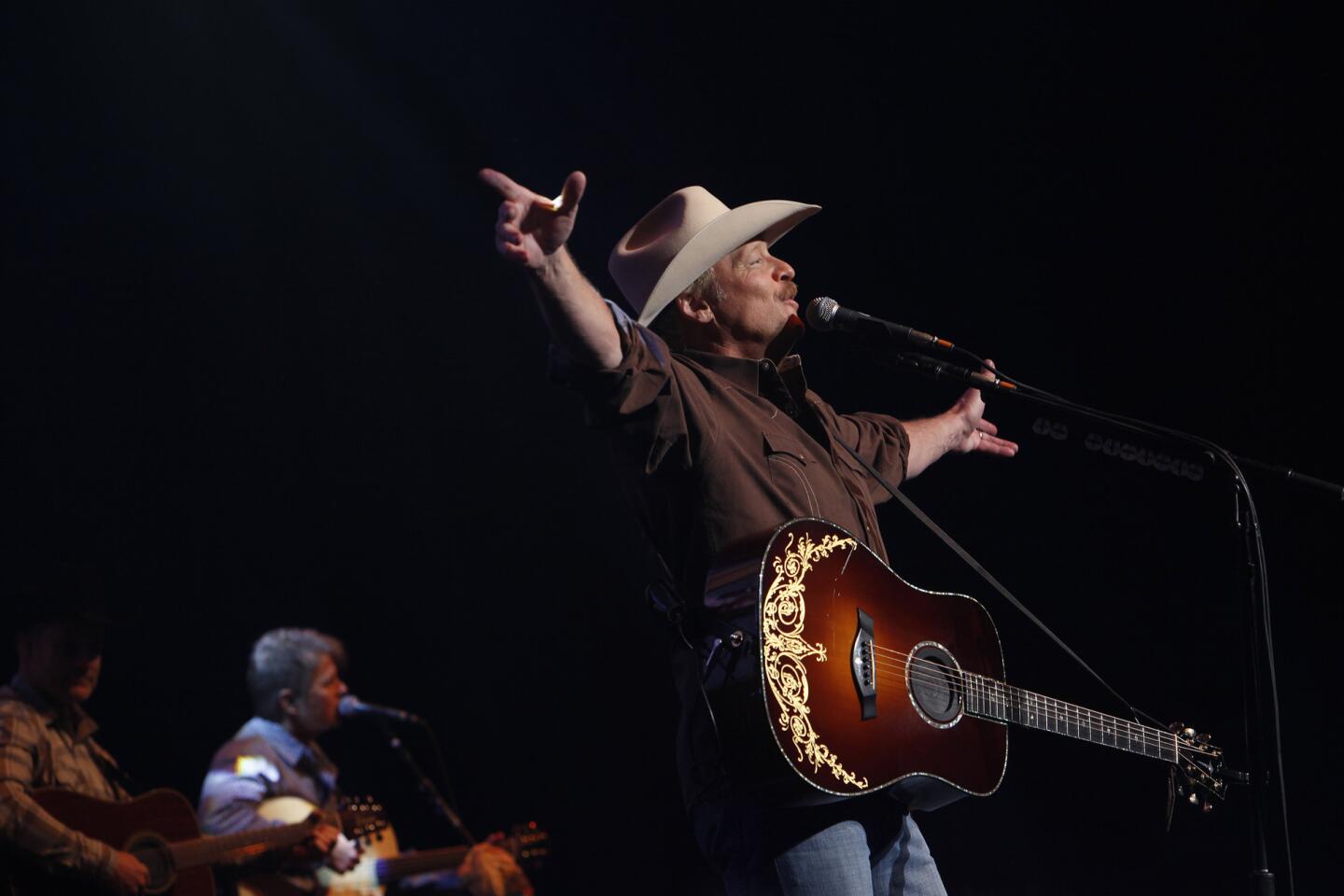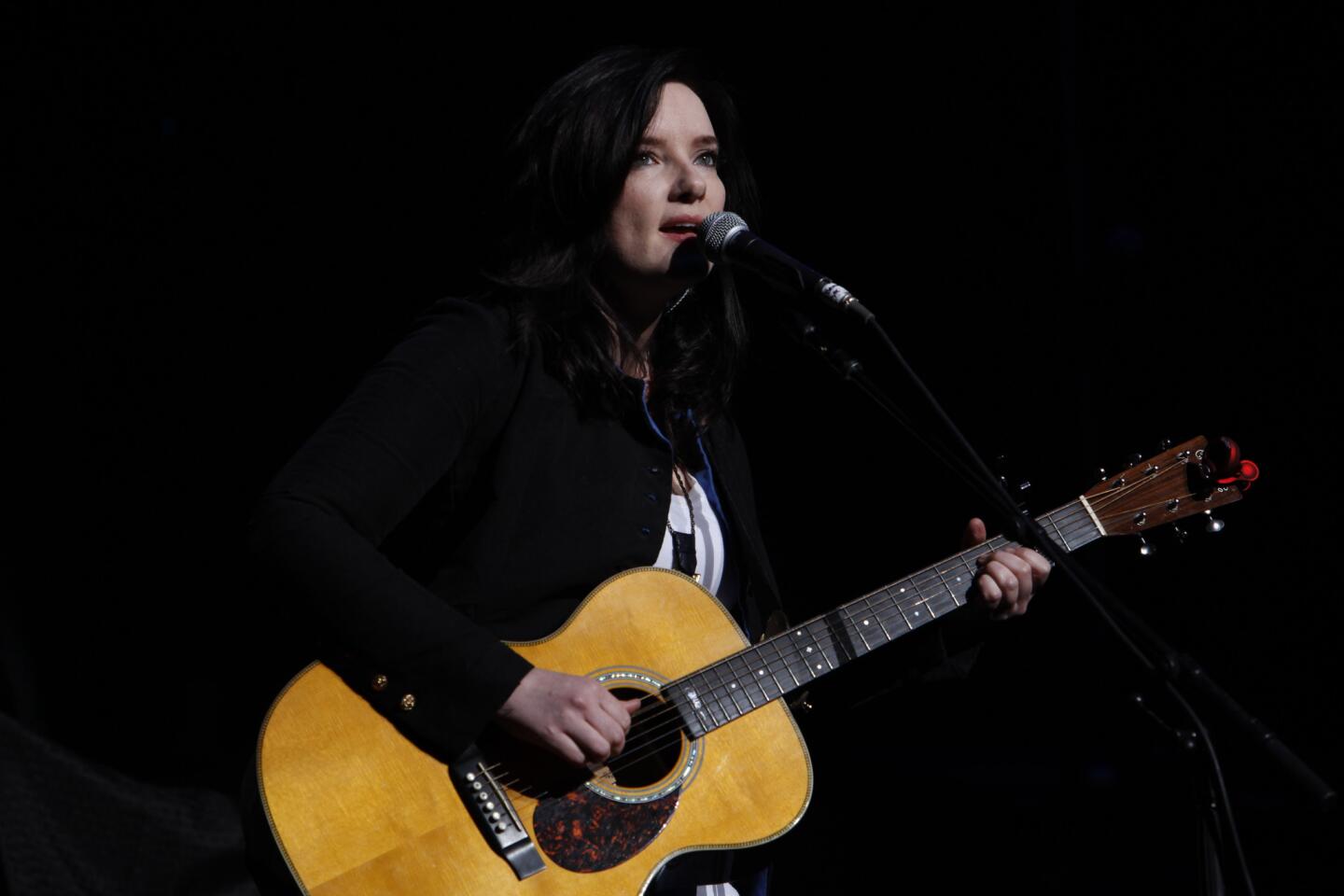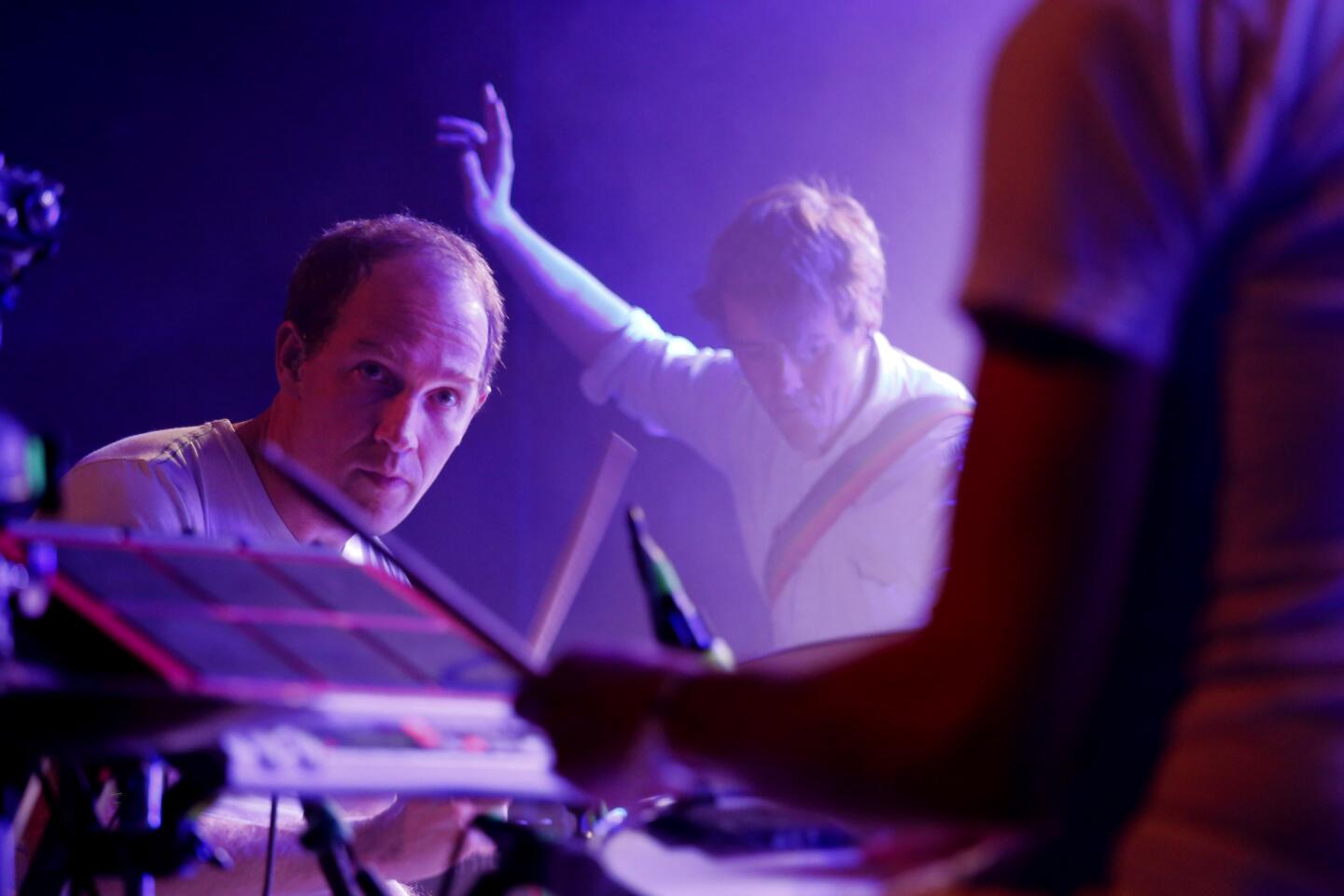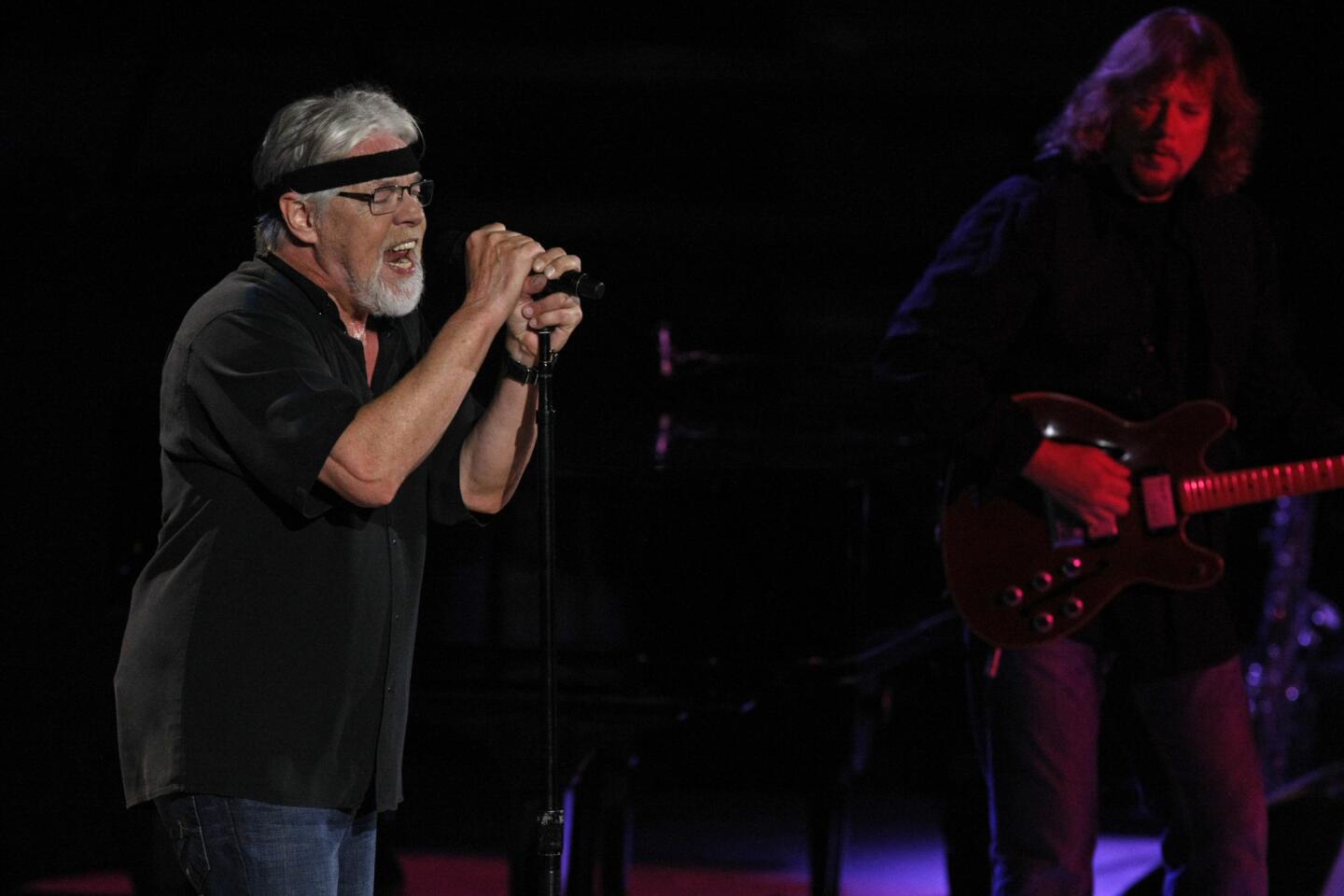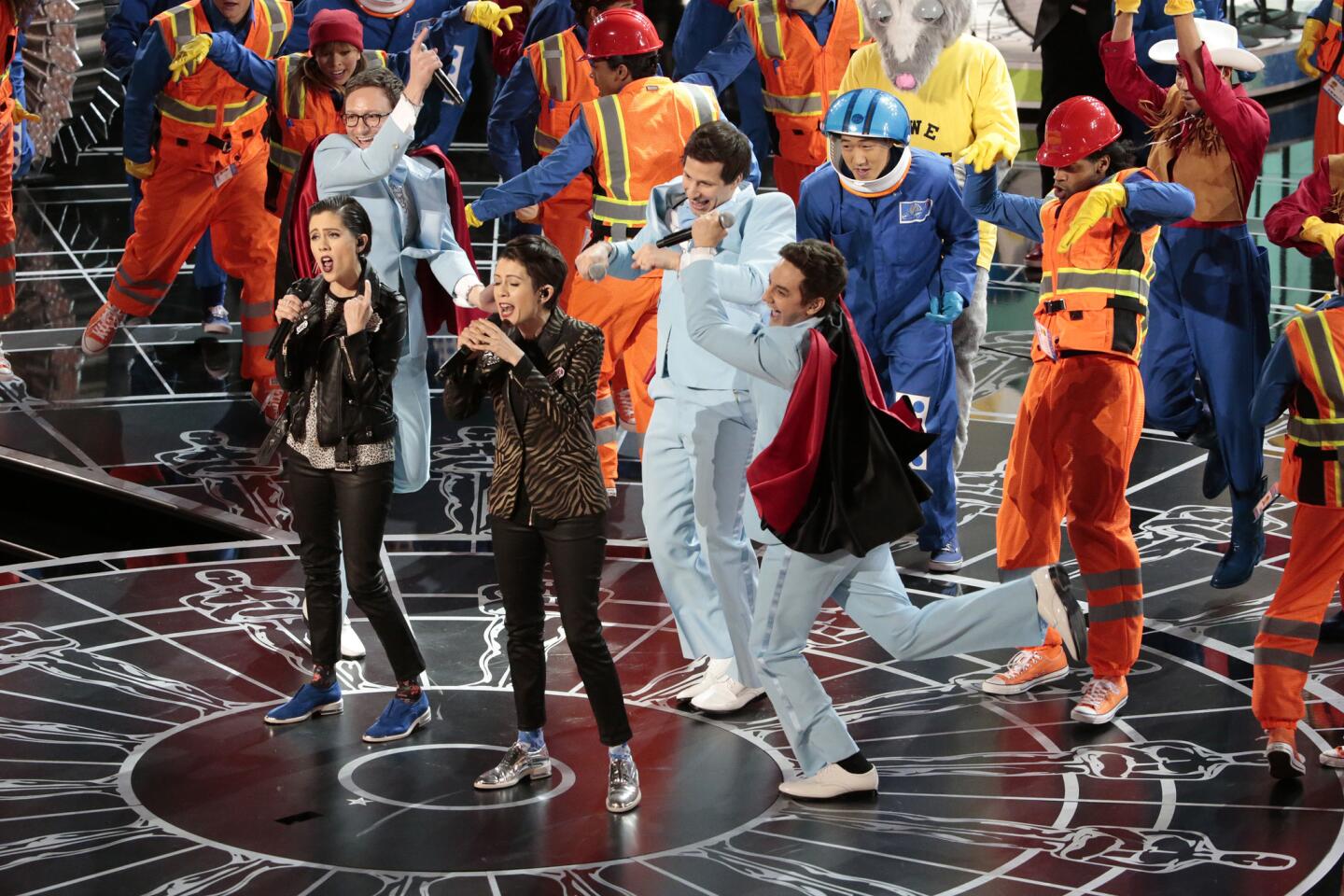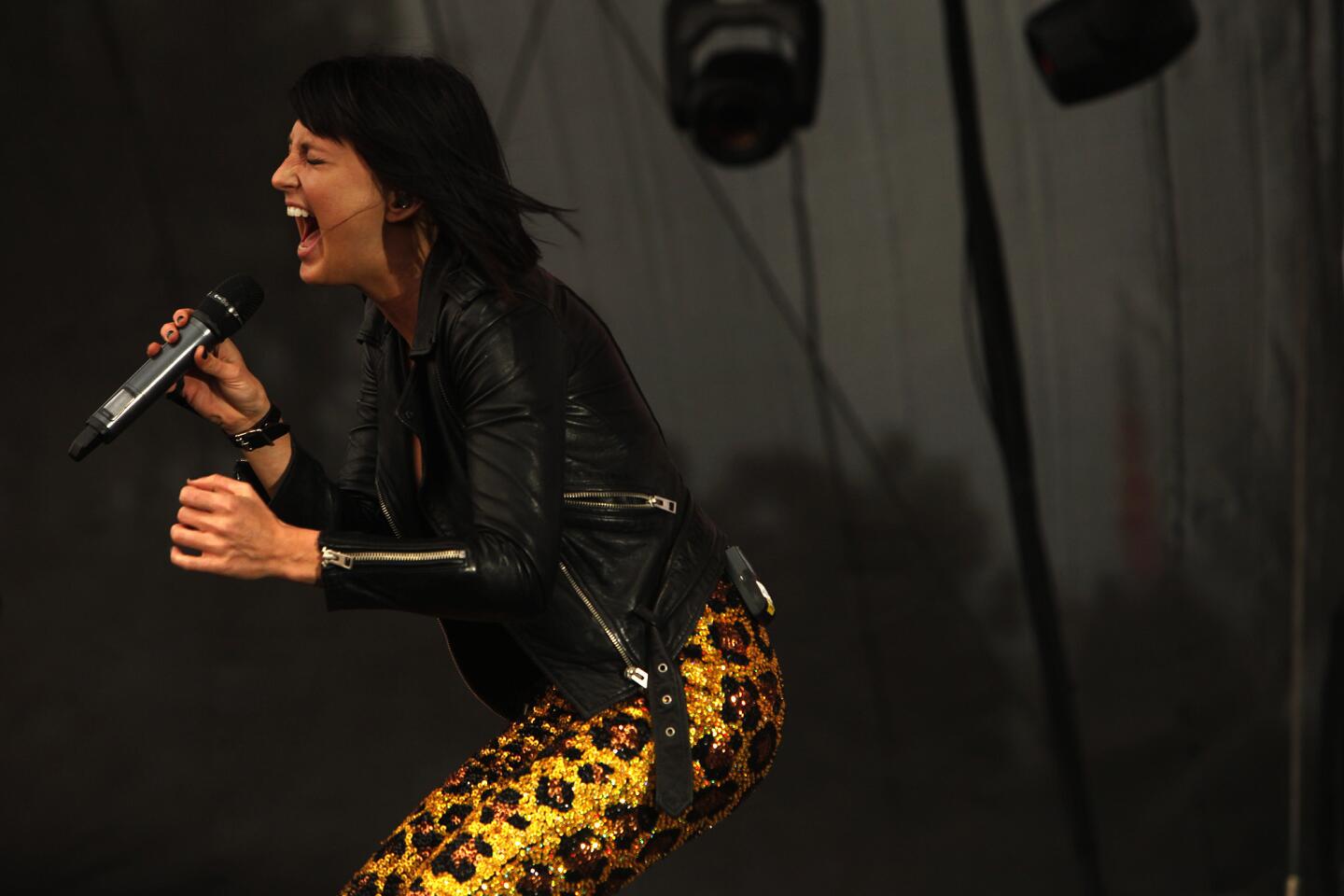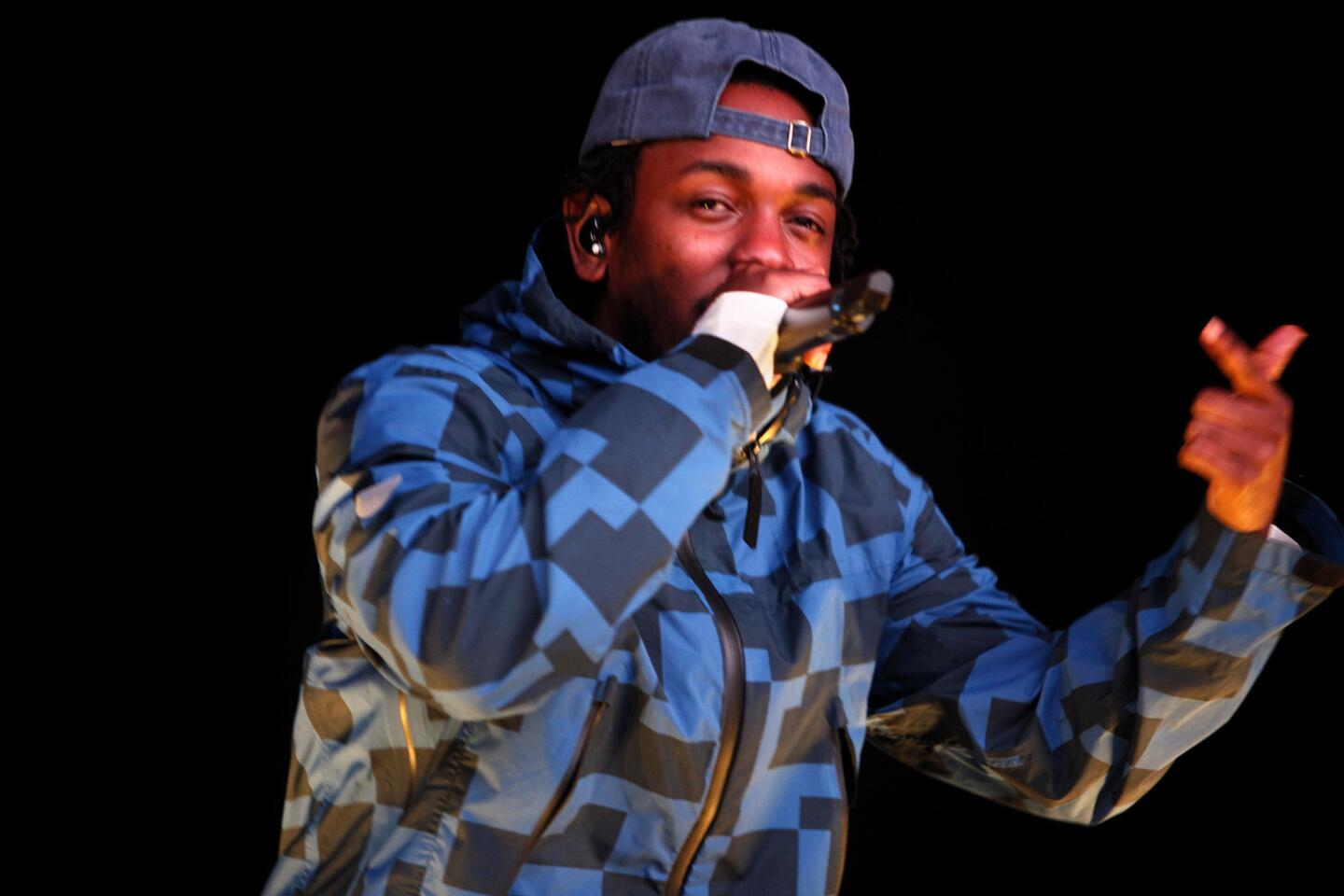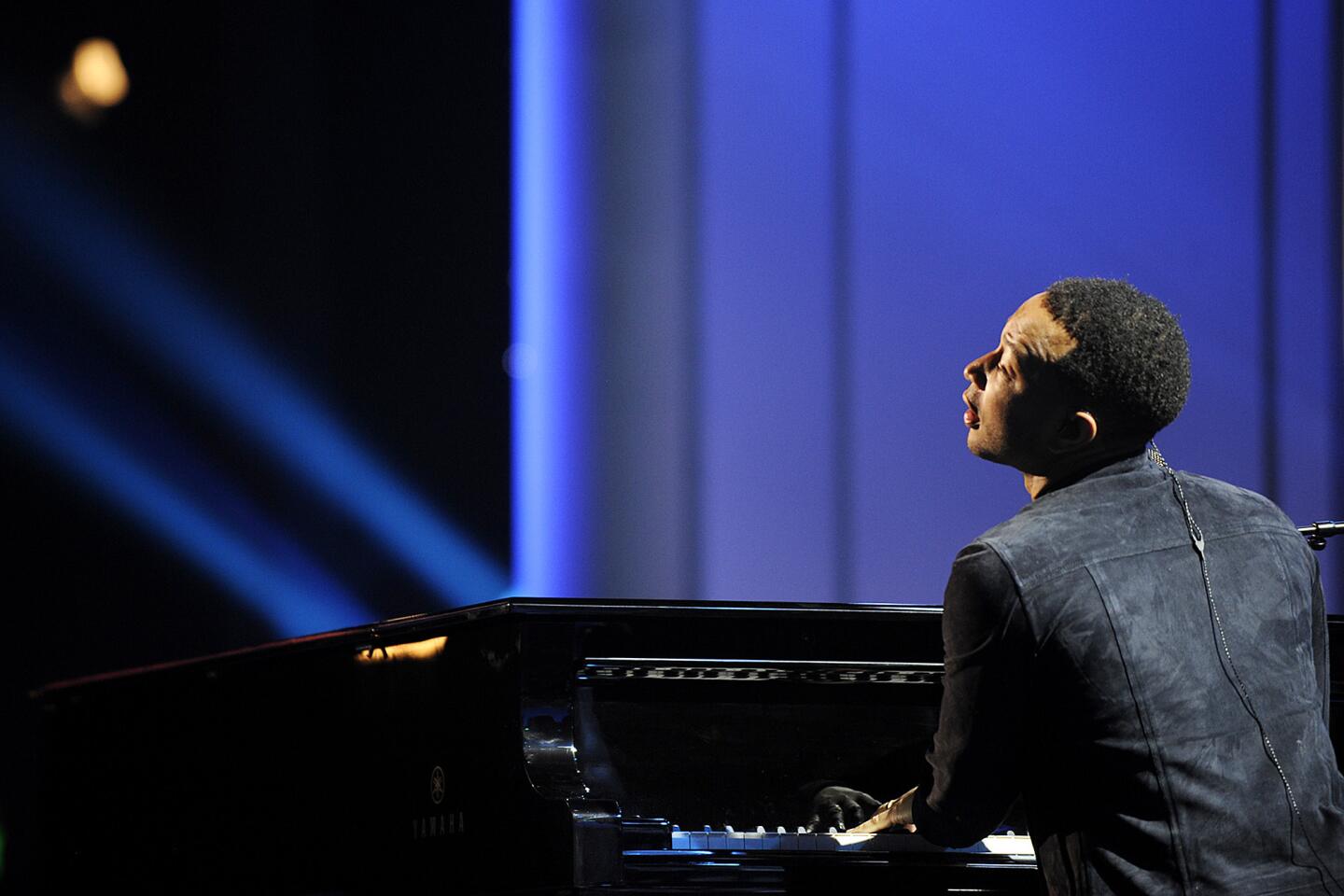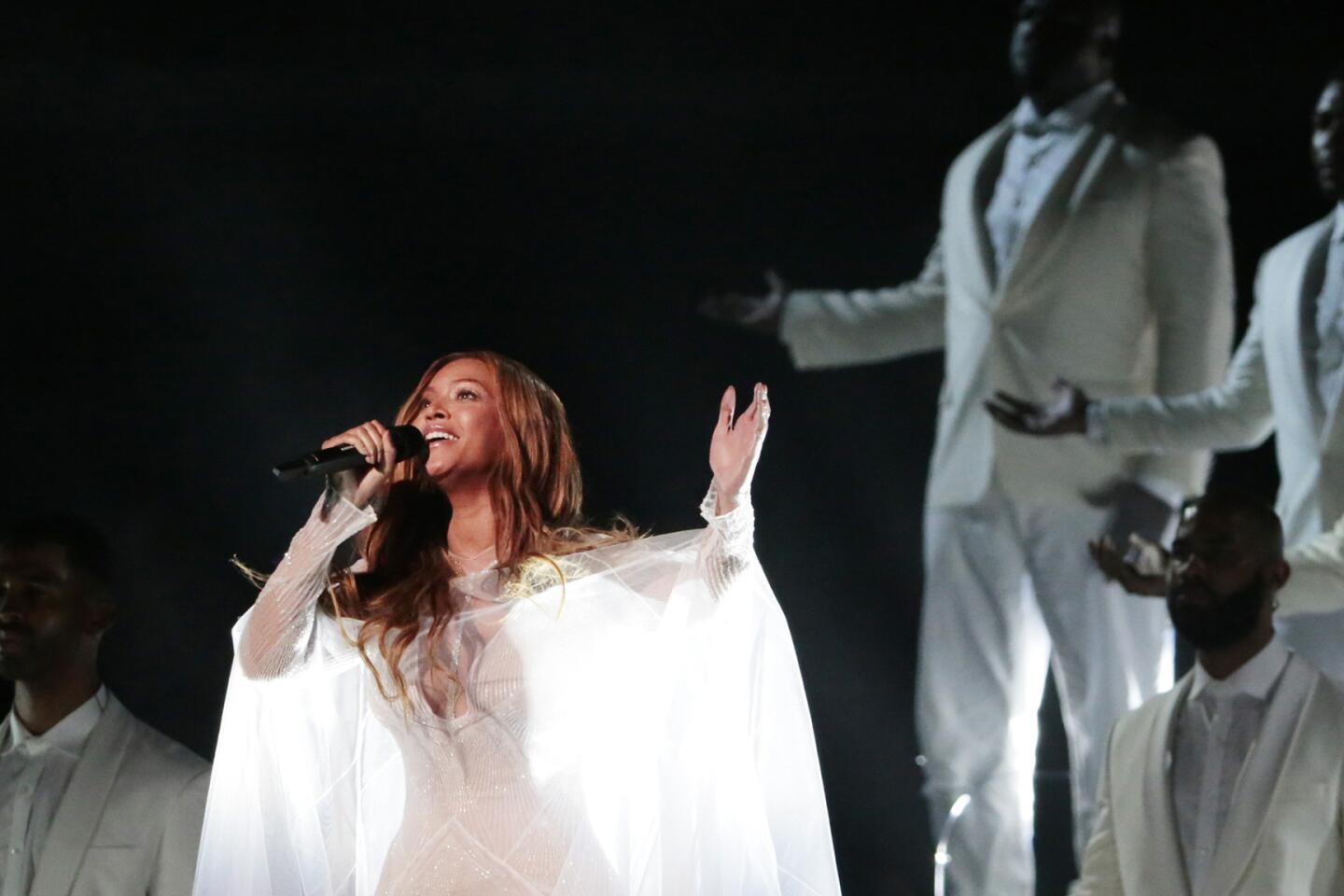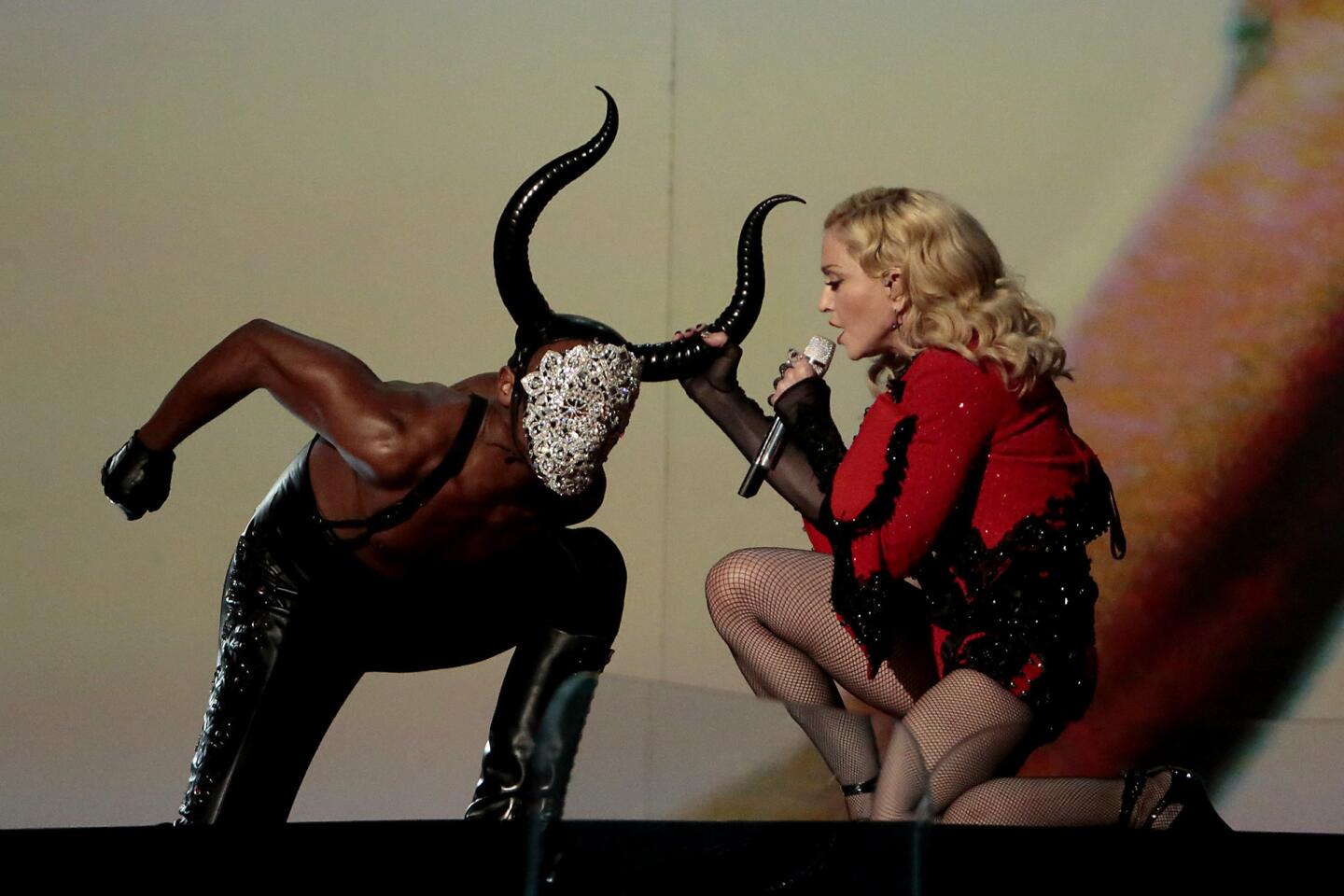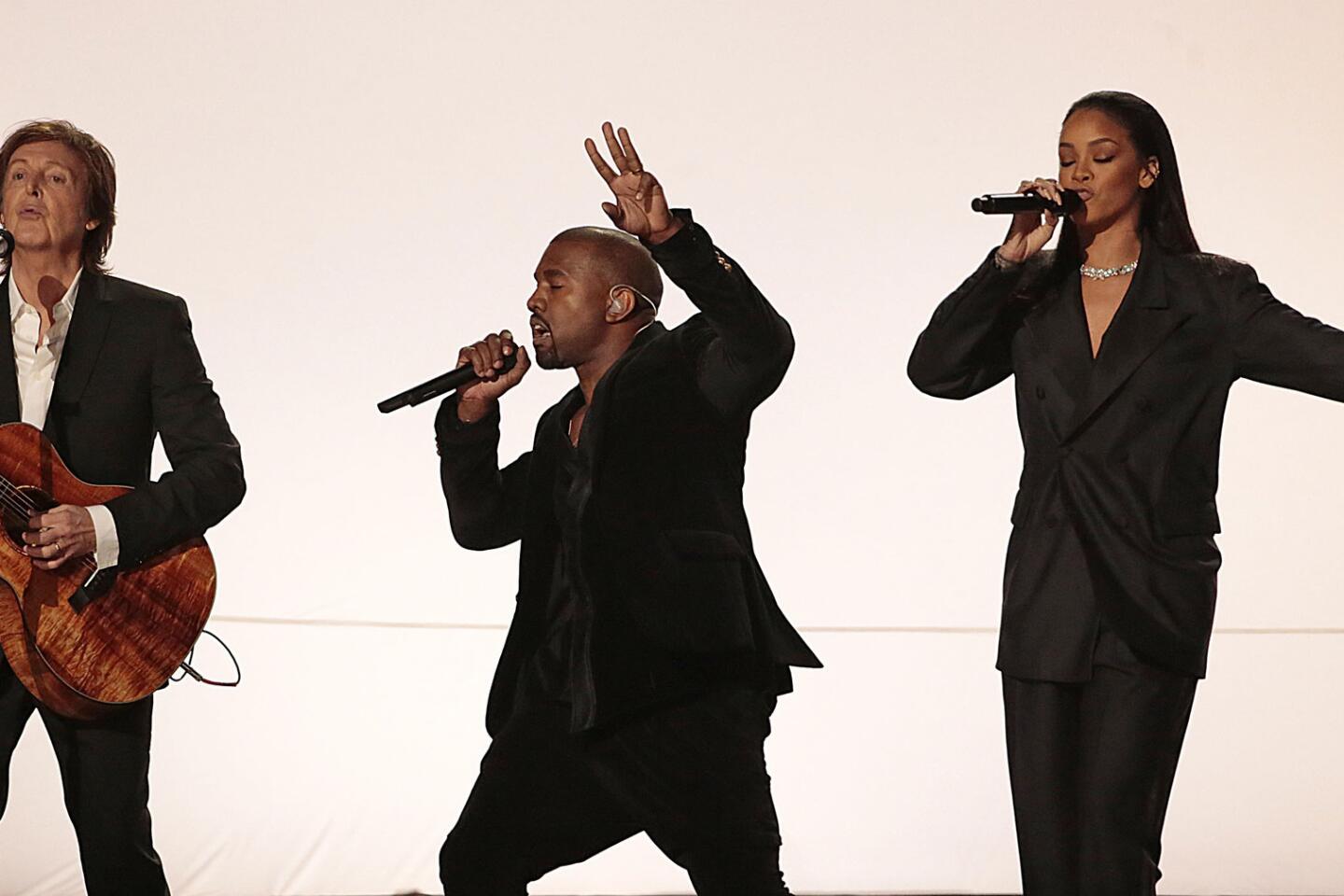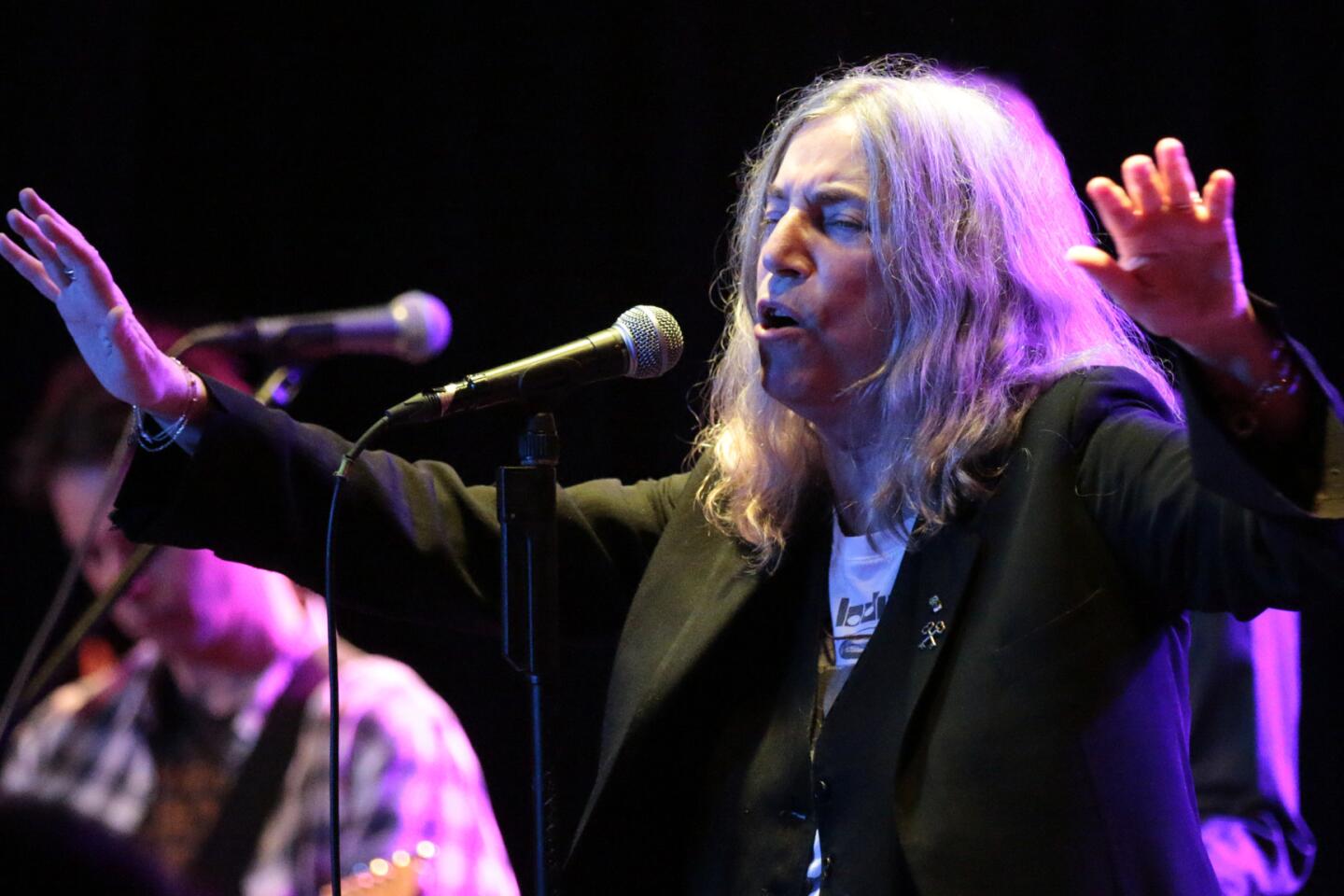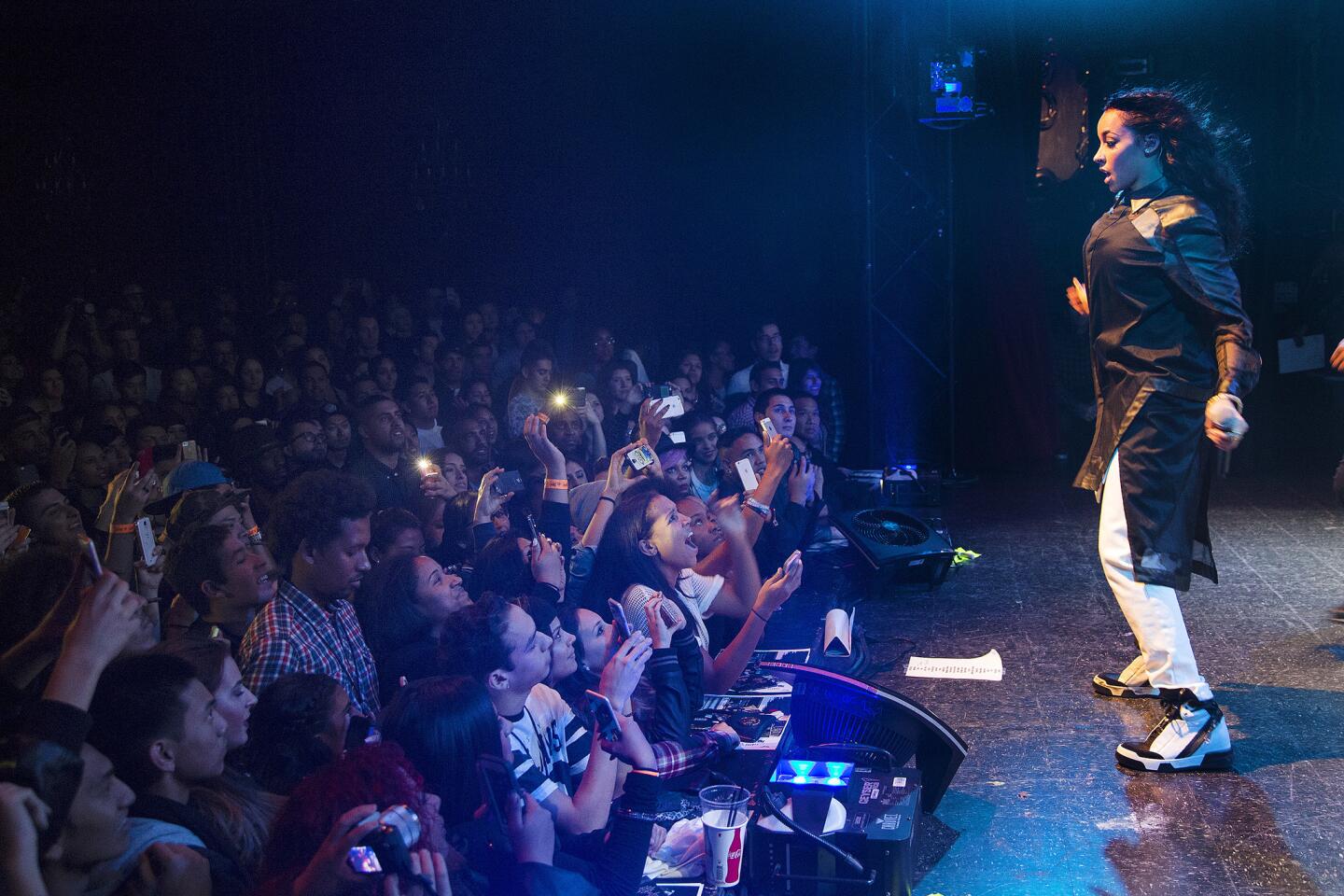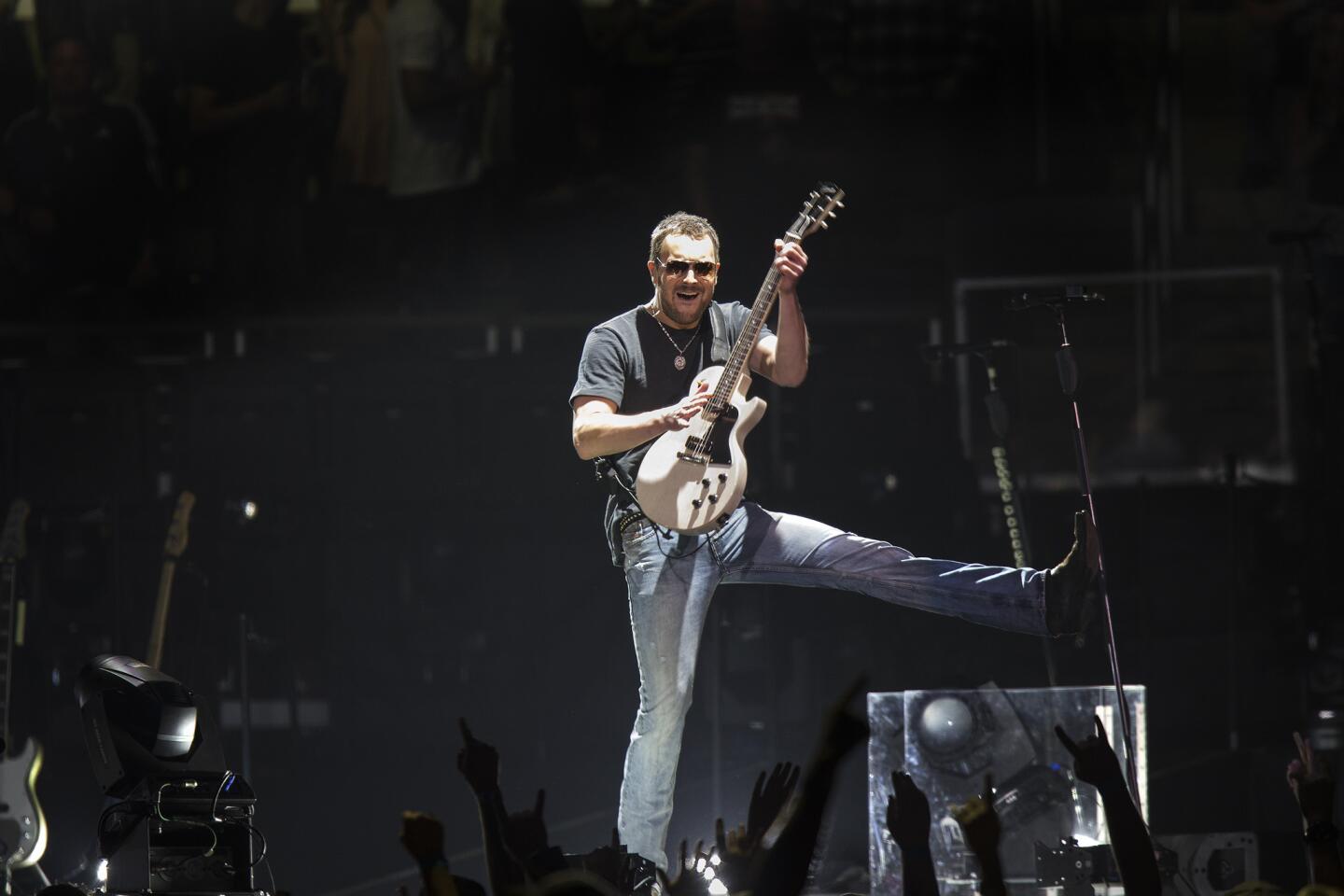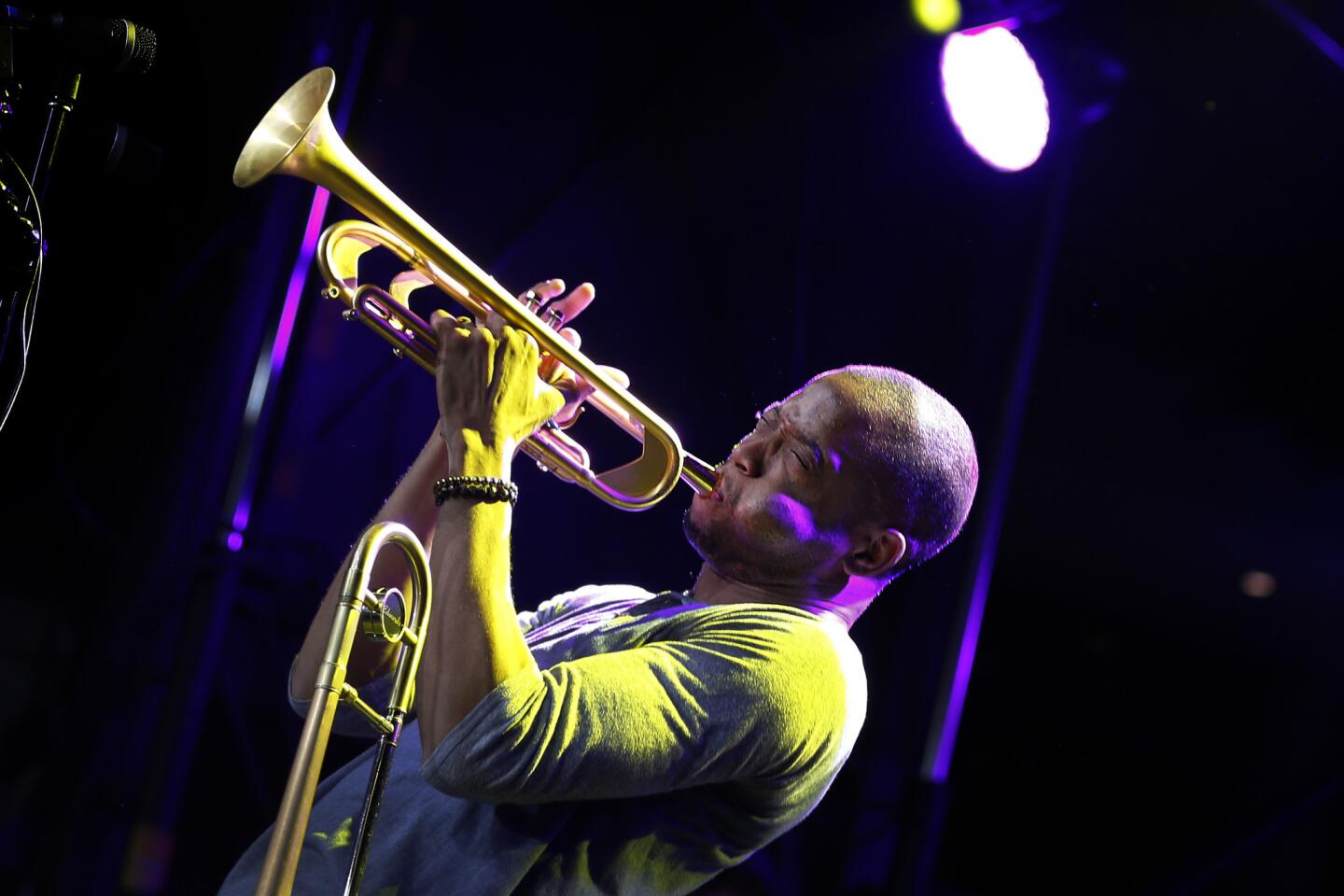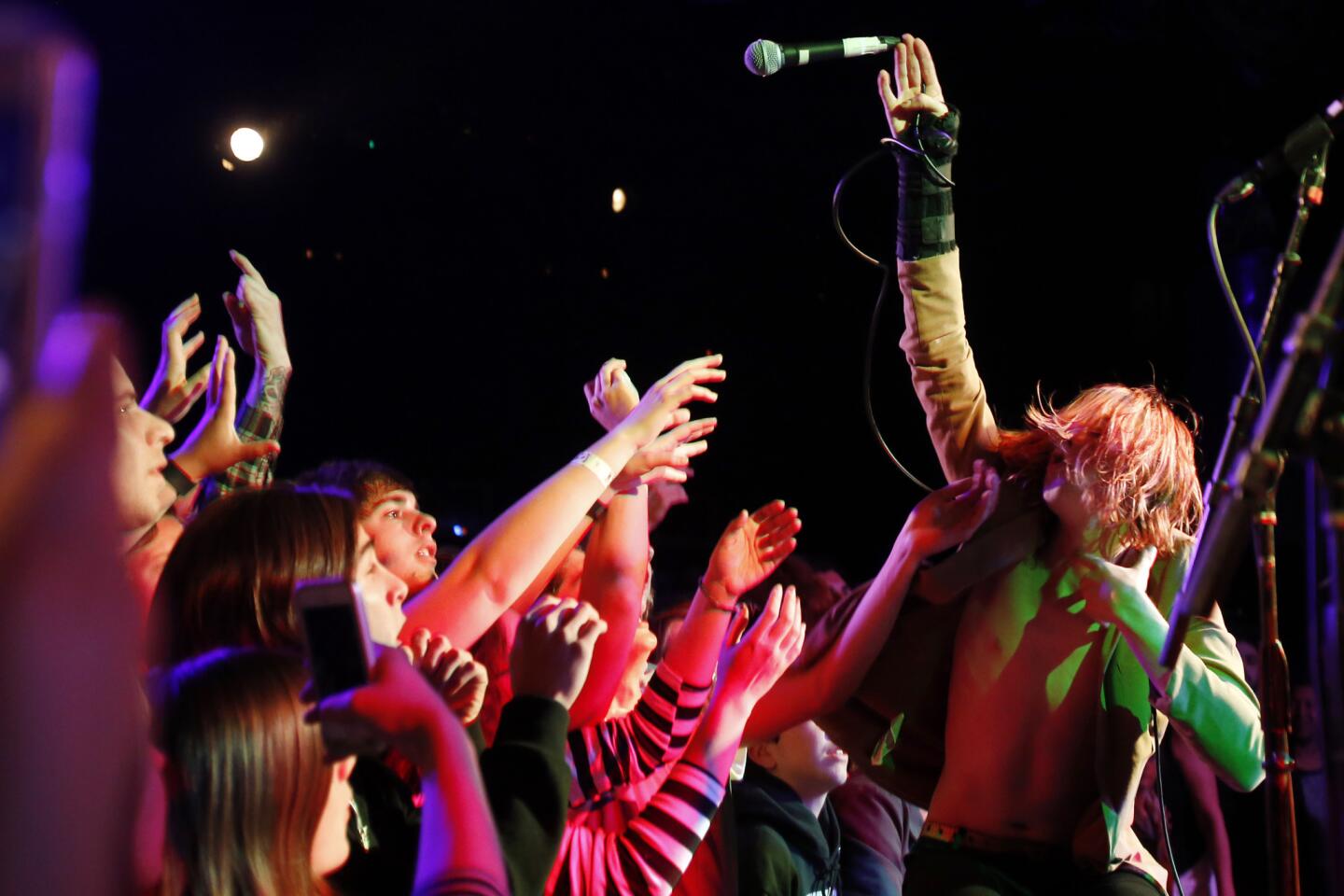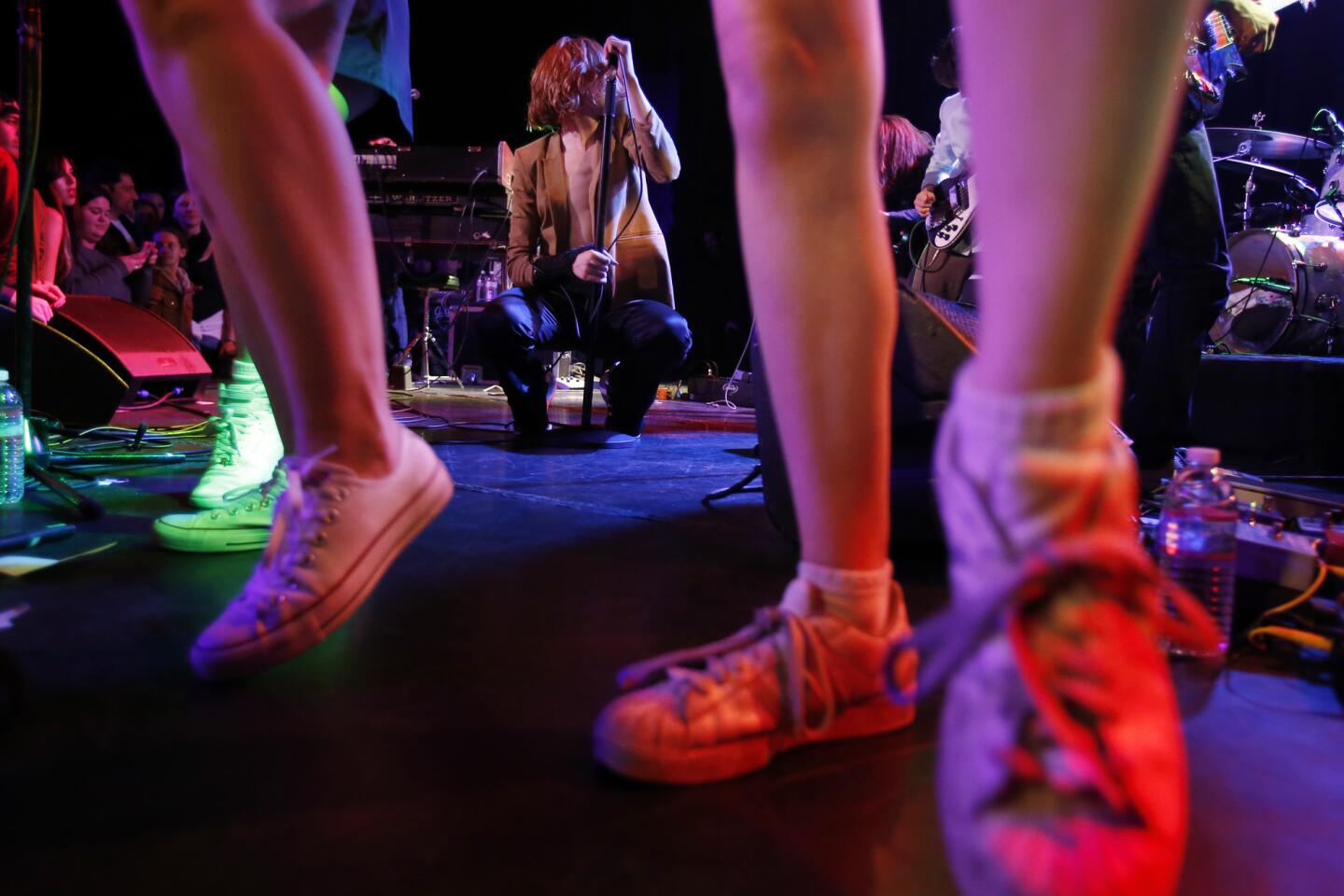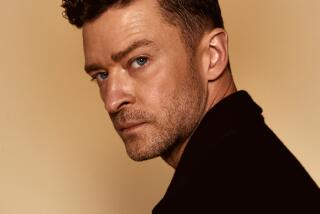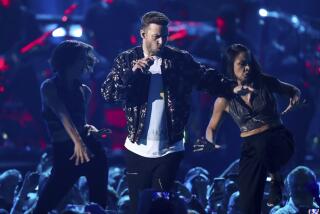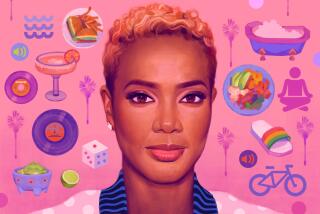A harsh, grimly worded account of one man’s absorption into the moral decay of Los Angeles, “The Hills” by the Weeknd is hardly bureau-of-tourism material.
The song, punctuated with horror-movie screams, has nothing to contribute to a positive self-image; you can’t imagine anyone, or any place, wanting to be defined by it.
Unless, that is, you were at the Forum on Tuesday night for the first of two sold-out Weeknd concerts. Then you didn’t have to imagine it.
“L.A., this is our anthem!” the Weeknd called out before launching into the final chorus of “The Hills,” and instead of arguing against the song’s troubling message, the crowd promptly went bananas.
1/82
Madonna performs at the Forum in Inglewood on Oct. 27, 2015. Read the review.
(Genaro Molina / Los Angeles Times) 2/82
Don Henley performs at the Forum in Inglewood on Oct. 9, 2015. Read the review.
(Katie Falkenberg / Los Angeles Times) 3/82
Los Lobos perform at El Gallo Plaza in East Los Angeles on Sept. 29, 2015. Read the review.
(Genaro Molina / Los Angeles Times) 4/82
Silversun Pickups perform at the Hollywood Forever Cemetery Masonic Lodge on Sept. 28, 2015. Read the review.
(Lawrence K. Ho / Los Angeles Times) 5/82
R. Kelly, cigar and mike in hand, performs at the Forum in Inglewood on Oct. 10. Read the Times review.
(Axel Koester / For the Los Angeles Times) 6/82
Grace Jones in concert at the Hollywood Bowl in Los Angeles on Sep. 27.
(Lawrence K. Ho / Los Angeles Times) 7/82
Lauryn Hill performs at the Greek Theatre on Sept. 14, 2015. Read the review.
(Lawrence K. Ho / Los Angeles Times) 8/82
Little Big Town band member Phillip Sweet performs at the Greek Theatre in Los Angeles on Sept. 10.
(Luis Sinco / Los Angeles Times) 9/82
Miguel performs at the Hollywood Forever Cemetery on Sept. 4, 2015. Read the review.
(Robert Gauthier / Los Angeles Times) 10/82
D’Angelo and the Vanguard performs at FYF Fest at Exposition Park on Aug. 23, 2015. Read the review.
(Christina House / For The Times) 11/82
Morrissey takes the stage at FYF Fest on Aug. 23, 2015. Read the review.
(Christina House / For The Times) 12/82
Solange onstage at FYF Fest on Aug. 23, 2015.
(Christina House / For The Times) 13/82
FKA Twigs performs at FYF Fest at Exposition Park on Aug. 23, 2015.
(Christina House / For The Times) 14/82
Kanye West performs during FYF Fest on Aug. 22.
(Francine Orr / Los Angeles Times) 15/82
Jehnny Beth performs with Savages at FYF Fest on Aug. 22, 2015.
(Francine Orr / Los Angeles Times) 16/82
Taylor Swift performs at Staples Center in August.
(Brian van der Brug / Los Angeles Times) 17/82
Shania Twain at Staples Center in Los Angeles on Aug. 20.
(Francine Orr / Los Angeles Times) 18/82
Aretha Franklin at the Microsoft Theatre in Los Angeles on Aug. 2.
(Lawrence K. Ho / Los Angeles Times) 19/82
The Weeknd performs during Hard Summer at the Fairplex in Pomona on Aug. 1, 2015. Read the review.
(Luis Sinco / Los Angeles Times) 20/82
Mötley Crüe celebrates the end of another concert, at the Matthew Knight Arena in Eugene, Ore., on July 22.
(Genaro Molina / Los Angeles Times) 21/82
John Famiglietti, left, front man Jake Duzsik, and Jupiter Keyes of the L.A. experimental band Health performing at the Echo in Los Angeles on July 22, 2015.
(Lawrence K. Ho / Los Angeles Times) 22/82
Ben Gibbard of Death Cab for Cutie performing at the Hollywood Bowl on July 12.
(Lawrence K. Ho / Los Angeles Times) 23/82
Kendrick Lamar performing at the BET Experience at Staples Center on June 27.
(Luis Sinco / Los Angeles Times) 24/82
Underworld performs at the Hollywood Bowl on June 21. Read the review.
(Lawrence K. Ho / Los Angeles Times) 25/82
Brian Wilson at the Greek Theater on Saturday, June 20. It was also his 73rd birthday.
(Michael Robinson Chávez / Los Angeles Times) 26/82
D’Angelo performs at Club Nokia on June 8, 2015. Read the review.
(Lawrence K. Ho / Los Angeles Times) 29/82
Ciara performs at Club Nokia on May 30, 2015.
(Michael Robinson Chávez / Los Angeles Times) 30/82
U2 guitarist The Edge, left, and lead singer Bono perform at the Forum on Tuesday, May 26. It was the first night of five at the venue.
(Michael Robinson Chavez / Los Angeles Times) 31/82
Guitarist Ron Wood, singer Mick Jagger, drummer Charlie Watts and guitarist Keith Richards of the Rolling Stones play Petco Park in San Diego on May 24, on the opening night of their 2015 American tour.
(Rick Loomis / Los Angeles Times) 32/82
Neil Diamond performs at the Hollywood Bowl on Saturday, May 23, 2015.
(Allen J. Schaben / Los Angeles Times) 33/82
Steve Aoki, EDM DJ, producer and recording artist, performs on Broadway between 4th and 6th streets in downtown Los Angeles, May 16, 2015.
(Jay L. Clendenin / Los Angeles Times) 34/82
Rapper Big Sean performs at Rock in Rio in Las Vegas on May 16.
(Luis Sinco / Los Angeles Times) 36/82
Sia performs during the Wango Tango concert at the StubHub Center on May 9, 2105, in Carson.
(Gina Ferazzi / Los Angeles Times) 37/82
Justin Bieber performs during the Wango Tango concert at the StubHub Center on May 9, 2105, in Carson.
(Gina Ferazzi / Los Angeles Times) 38/82
Kanye West performs in shadowy lights during the Wango Tango concert at the StubHub Center on May 9, 2105, in Carson.
(Gina Ferazzi / Los Angeles Times) 39/82
Ne-Yo performs in front of a full house during the Wango Tango concert at the StubHub Center on May 9, 2105, in Carson.
(Gina Ferazzi / Los Angeles Times) 40/82
Nick Jonas performs during the Wango Tango concert at the StubHub Center on May 9, 2105 in Carson.
(Gina Ferazzi / Los Angeles Times) 41/82
James Hatfield fronts Metallica at the Rock in Rio Festival in Las Vegas on May 9.
(Luis Sinco / Los Angeles Times) 42/82
Chester Bennington and Linkin Park play the Rock in Rio fest in Las Vegas on May 9.
(Luis Sinco / Los Angeles Times) 43/82
Tim McIlrath, lead singer for the Chicago-based, melodic hardcore band Rise Against, wades into the crowd at Rock in Rio on May 9.
(Luis Sinco / Los Angeles Times) 44/82
Gwen Stefani fronts No Doubt at Rock in Rio in Las Vegas on May 8.
(Luis Sinco / Los Angeles Times) 45/82
Janet Weiss, left, and Corin Tucker perform during the
Sleater-Kinney concert at the Palladium in Hollywood on April 30.
(Lawrence K. Ho / Los Angeles Times) 46/82
Carrie Brownstein performs during the
Sleater-Kinney concert at the Palladium in Hollywood on April 30.
(Lawrence K. Ho / Los Angeles Times) 47/82
Swedish-born soft-indie-rock artist
Jose Gonzalez performs at the Regent on April 30.
(Adam Della / For The Times) 49/82
Bassist Dusty Hill, left, and guitarist Billy Gibbons of ZZ Top perform on the Palomino Stage at the
Stagecoach Country Music Festival on April 25.
(Allen J. Schaben / Los Angeles Times) 51/82
Rumer performs at the Masonic Lodge at Hollywood Forever Cemetary in Hollywood on April 23.
(Lawrence K. Ho / Los Angeles Times) 52/82
Kanye West makes a surprise appearance during the Weeknd’s performance at the
Coachella Valley Music and Arts Festival on April 18.
(Marcus Yam / Los Angeles Times) 53/82
Marina and the Diamonds perform at the Coachella Valley Music and Arts Festival on April 18. (Marcus Yam / Los Angeles Times)
54/82
FKA Twigs performs at the Coachella Valley Music and Arts Festival on April 18. (Marcus Yam / Los Angeles Times)
55/82
Barry Manilow performs at the Staples Center on April 14.
(Michael Robinson Chavez / Los Angeles Times) 56/82
Florence + The Machine perform during the
Coachella Valley Music and Arts Festival on April 12.
(Marcus Yam / Los Angeles Times) 58/82
El-P, left, and Killer Mike of
Run The Jewels perform at the
Coachella Valley Music and Arts Festival on April 11.
(Luis Sinco / Los Angeles Times) 59/82
Brittany Howard of
Alabama Shakes performs at the
Coachella Valley Music and Arts Festival on April 10.
(Brian van der Brug / Los Angeles Times) 60/82
Ariana Grande performs at the Forum in Inglewood, April 8, 2015.
(Lawrence K. Ho / Los Angeles Times) 61/82
Rivers Cuomo of Weezer performs with his band at Burgerama on March 28. Weezer was one of the headliners for the two-day festival at Santa Ana’s Observatory.
(Katie Falkenberg / Los Angeles Times) 62/82
Lead singer Zac Carper of FIDLAR performs with his band at Burgerama, the two-day Santa Ana festival thrown by OC DIY impresarios Burger Records.
(Katie Falkenberg / Los Angeles Times) 63/82
Experimental artist Lustmord makes his Los Angeles debut on March 21 at the Masonic Lodge at Hollywood Forever.
(Katie Falkenberg / Los Angeles Times) 64/82
R&B singer Chris Brown performs at the Forum in Inglewood. The March 8 show was a stop on his tour with Trey Songz and Tyga.
(Lawrence K. Ho / Los Angeles Times) 65/82
Trey Songz performs at the Forum on March 8.
(Lawrence K. Ho / Los Angeles Times) 66/82
Alan Jackson performs at the Nokia Theatre on Feb. 27 as part of his
Keepin’ It Country tour.
(Katie Falkenberg / Los Angeles Times) 67/82
Brandy Clark performs as part of Alan Jackson’s
Keepin’ It Country tour at the Nokia Theatre on Feb. 27.
(Katie Falkenberg / Los Angeles Times) 68/82
Caribou performs at the Fonda Theater in Hollywood on Feb. 26.
(Michael Robinson Chavez / Los Angeles Times) 69/82
Roots rocker
Bob Seger performs at the Viejas Arena at San Diego State University on Feb. 25.
(Don Bartletti / Los Angeles Times) 70/82
Tegan and Sara perform with the Lonely Island during the 87th
Academy Awards on Feb. 22 at the Dolby Theatre in Hollywood.
(Robert Gauthier / Los Angeles Times) 71/82
Sarah Barthel of Phantogram performs at the
Air + Style concert and snowboarding event at the Rose Bowl in Pasadena on Feb. 21.
(Genaro Molina / Los Angeles Times) 72/82
Kendrick Lamar performs at the Air + Style concert and snowboarding event at the Rose Bowl in Pasadena on Feb. 21.
(Genaro Molina / Los Angeles Times) 73/82
John Legend performs during a rehearsal for “Stevie Wonder: Songs in the Key of Life - An All-Star Tribute” on Feb. 9 at Nokia Theatre in Los Angeles.
Read the review (Christina House / For The Times) 75/82
Madonna interacts with a dancer during the 57th Grammy Awards on Feb. 8.
Read the review (Robert Gauthier / Los Angeles Times) 77/82
Patti Smith at the Roxy on Feb. 2.
Read the review (Lawrence K. Ho / Los Angeles Times) 78/82
R&B singer Tinashe sings to a packed crowd at the El Rey Theatre on Jan. 22.
Read the review (Gina Ferazzi / Los Angeles Times) 79/82
Eric Church rocks the house while performing at Staples Center on Jan. 23.
Read the review (Gina Ferazzi / Los Angeles Times) 80/82
Trombone Shorty & Orleans Avenue performs at the Grand Plaza during the 2015 NAMM show at the Anaheim Convention Center on Jan. 22. (Allen J. Schaben / Los Angeles Times)
81/82
Sam France of Foxygen performs at the Roxy on Jan. 2.
Read the review (Francine Orr / Los Angeles Times) 82/82
Foxygen at the Roxy on Jan. 2. (Francine Orr / Los Angeles Times)
Could there be a more vivid demonstration of the Weeknd’s newfound pop stardom? Once a shadowy figure lurking on the margins of R&B, this Canadian singer and songwriter (born Abel Tesfaye) ascended to the A-list in 2015 with a string of inescapable singles, including “Can’t Feel My Face” and “The Hills,” perhaps the coldest, darkest song to reach No. 1 since Michael Jackson’s “Dirty Diana” (which the Weeknd regularly performs).
His album “Beauty Behind the Madness” topped the charts too, and this week earned several Grammy nominations, including one for album of the year. Now he’s someone who inspires dreams of proximity in his fans, even when getting too close seems dangerous.
Indeed, as “The Hills” illustrates, the Weeknd hasn’t lost his menace. Though “Beauty Behind the Madness” both deepens and cleans up his sound, thanks in part to help from a crew of Top 40 hitmakers, it’s still plenty forbidding.
“Tell ‘em this boy wasn’t meant for loving,” he sings to start the album in “Real Life,” which also opened Tuesday’s show. Even “Can’t Feel My Face,” as slick as any Katy Perry tune, compares a relationship to a cocaine binge — an exclamation with a warning tucked inside it.
The concert carried through the Weeknd’s mixed feelings about opening himself up. An arena-scaled production with elaborate lighting and video elements — as well as all 14 songs from “Beauty Behind the Madness” — it showed his eagerness to compete on the level of stars whose personalities matter as much as their music.
He danced a bit in “Losers” and “Can’t Feel My Face,” and at one point he did the thing where he pretended to be interested in which side of the room was louder. That kind of stagecraft would’ve been unthinkable for the Weeknd just a few years ago. Ditto the strength of his singing in “Shameless,” which revealed how far he’s come since a shaky performance at Coachella in 2012 raised the possibility that he might not be suited to work outside a dimly lighted studio.
But just because he’s now capable of connecting doesn’t mean he’s willing. For much of the show the Weeknd, backed by a three-piece band, positioned himself behind a screen whose flashing images kept him safely out of reach. The brisk pace of the set — one song quickly moving into the next, with a few medleys of older tunes thrown in — felt like another way of fending off anything that might’ve unsettled a fixed idea of what the Weeknd is about.
Yet that unsettling has already happened; it’s what makes “Beauty Behind the Madness” so impressive, and what led his fans to join him for that haunted Hollywood anthem.
“I love you,” he told the crowd as he walked offstage at the end of the show, and though you wanted to believe him, you weren’t sure you should.
Twitter: @mikaelwood
